This website uses cookies to ensure you get the best experience on our website. Learn more


Information on how to stay safe and healthy abroad. About us.
- Destinations
- Asia (Central)
- Asia (East)
- Australasia & Pacific
- Central America
- Europe & Russia
- Middle East
- North America
- South America & Antarctica
Rwanda (Africa)
Advice for all destinations.
Read the information on the COVID-19: Health Considerations for Travel page for advice on travelling during the COVID-19 pandemic.
Vaccinations and malaria risk
Review both the Vaccination and Malaria sections on this page to find out if you may need vaccines and/or a malaria risk assessment before you travel to this country.
If you think you require vaccines and/or malaria risk assessment, you should make an appointment with a travel health professional:
- How to make an appointment with a travel health professional
A travel health risk assessment is also advisable for some people, even when vaccines or malaria tablets are not required.
- Do I need a travel health risk assessment?
Risk prevention advice
Many of the health risks experienced by travellers cannot be prevented by vaccines and other measures need to be taken.
Always make sure you understand the wider risks at your destination and take precautions, including:
- food and water safety
- accident prevention
- avoiding insect bites
- preventing and treating animal bites
- respiratory hygiene
- hand hygiene
Our advice section gives detailed information on minimising specific health risks abroad:
- Travel Health Advice A-Z
Other health considerations
Make sure you have travel insurance before travel to cover healthcare abroad.
Find out if there are any restrictions you need to consider if you are travelling with medicines .
Know how to access healthcare at your destination: see the GOV.UK English speaking doctors and medical facilities: worldwide list
If you feel unwell on your return home from travelling abroad, always seek advice from a healthcare professional and let them know your travel history.
Vaccinations
- Confirm primary courses and boosters are up to date as recommended for life in Britain - including for example, seasonal flu vaccine (if indicated), MMR , vaccines required for occupational risk of exposure, lifestyle risks and underlying medical conditions.
- Courses or boosters usually advised: Hepatitis A; Tetanus.
- Other vaccines to consider: Diphtheria; Hepatitis B; Meningococcal Meningitis; Rabies; Typhoid; Yellow Fever.
- Selectively advised vaccines - only for those individuals at highest risk: Cholera.
Yellow fever vaccination certificate required for travellers aged 1 year or over arriving from countries with risk of yellow fever transmission
Notes on the diseases mentioned above
Risk is higher during floods and after natural disasters, in areas with very poor sanitation and lack of clean drinking water.
- Diphtheria : spread person to person through respiratory droplets. Risk is higher if mixing with locals in poor, overcrowded living conditions.
Risk is higher where personal hygiene and sanitation is poor.
Risk is higher for long stays, frequent travel and for children (exposed through cuts and scratches), those who may require medical treatment during travel.
- Meningococcal Meningitis : spread by droplet infection through close person to person contact. Meningococcal disease is found worldwide but epidemics may occur within this country, particularly during the dry season. Risk is higher for those mixing with locals for extended periods.
- Tetanus : spread through contamination of cuts, burns and wounds with tetanus spores. Spores are found in soil worldwide. A total of 5 doses of tetanus vaccine are recommended for life in the UK. Boosters are usually recommended in a country or situation where the correct treatment of an injury may not be readily available.
- Typhoid : spread mainly through consumption of contaminated food and drink. Risk is higher where access to adequate sanitation and safe water is limited.
- Yellow Fever : spread by the bite of an infected, day-biting mosquito. The disease is mainly found in rural areas of affected countries but outbreaks in urban areas do occur. Vaccination is usually recommended for all those who travel into risk areas. (View yellow fever risk areas here), and areas where there is an outbreak ongoing (check the 'news' section for outbreaks). In addition, certain countries may want to see proof of vaccination on an official yellow fever vaccination certificate - check above under Immunisations .
Malaria is a serious and sometimes fatal disease transmitted by mosquitoes.You cannot be vaccinated against malaria.
Malaria precautions
- Malaria risk is high throughout the year in all areas.
- Malaria precautions are essential. Avoid mosquito bites by covering up with clothing such as long sleeves and long trousers especially after sunset, using insect repellents on exposed skin and, when necessary, sleeping under a mosquito net.
- Check with your doctor or nurse about suitable antimalarial tablets.
- See malaria map – additional information can be found by clicking on the Regional Information icon below the map.
- High risk areas: atovaquone/proguanil OR doxycycline OR mefloquine is usually advised.
- If you have been travelling in a malarious area and develop a fever seek medical attention promptly. Remember malaria can develop even up to one year after exposure.
- If travelling to an area remote from medical facilities, carrying standby emergency treatment for malaria may be considered.
Other Health Risks
Altitude and travel, schistosomiasis.
There is a risk of exposure to coronavirus (COVID-19) in this country.
Please be aware that the risk of COVID-19 in this country may change at short notice and also consider your risk of exposure in any transit countries and from travelling itself.
- The 'News' section on this page will advise if significant case increases or outbreaks have occurred in this country.
Prior to travel, you should:
- Check the latest government guidance on the FCDO Foreign travel advice and country specific pages for travel to this country and the rules for entering the UK on return.
- Ensure you are up to date with UK recommendations on COVID-19 vaccination.
- You can check this in the FAQ's.
- If you are at increased risk of severe COVID-19 you should carefully consider your travel plans and consider seeking medical advice prior to making any decisions.
For further information, see Coronavirus disease (COVID-19) and COVID-19: Health Considerations for Travel pages.
- 40 additional items in the news archive for this country
back to top
- Info Note For Passengers
INFO NOTE FOR TRAVELLERS
As part of the Government measures to prevent diseases that can potentially become epidemics, the Ministry of Health informs the general public and the international travelers visiting Rwanda of the following:
YELLOW FEVER
The following is the WHO list of Countries with risk of yellow fever transmission and countries requiring yellow fever vaccination. This list of countries is dynamic can change anytime depending on situation:
Angola, Benin, Burkina Faso, Burundi, Cameroon, Central African Republic, Chad, Côte d’Ivoire, Democratic Republic of the Congo, Equatorial Guinea, Ethiopia, Gabon, The Gambia, Ghana, Guinea, Guinea-Bissau, Kenya, Liberia, Mali, Mauritania, Niger, Nigeria, Senegal, Sierra Leone, South Sudan, Sudan, Togo, Uganda, Argentina, Bolivia, Brazil, Colombia, Ecuador, French Guiana, Guyana, Panama, Paraguay, Peru, Suriname, Trinidad and Tobago, Venezuela In a bid to prevent transmission of Yellow Fever in Rwanda,
1. All travelers traveling to Yellow Fever endemic countries should be vaccinated 10 days before traveling.
2. To enter Rwanda, a Yellow Fever vaccination certificate is not required to travelers (Residents / Non-Residents) coming from Yellow Fever non-endemic countries and without an active transmission outbreak of Yellow Fever.
3. To enter Rwanda, a Yellow Fever vaccination certificate is mandatory to travelers (Residents / Non-Residents) coming from Yellow Fever endemic countries and any country with an active Yellow Fever transmission outbreak
4. For travelers (Residents / Non-Residents) coming from an active Yellow Fever transmission outbreak country or have recently (within 24 days) visited an active Yellow Fever transmission outbreak country, the following instructions are applied:
i. An entry will bowed to a traveler (Residents / Non-Residents) who at arrival presents:
-A valid Yellow Fever vaccination certificate
-Without fever (less than 38.5oC)
-Consents to self-report for any symptoms for 6 days
iii. A traveler (Residents / Non-Residents) with an invalid Yellow Fever vaccination certificate (less than 10 days after vaccination) will be quarantined until the certificate becomes valid
iv. A traveler (Residents / Non-Residents) coming from a country with active Yellow Fever transmission or known Yellow Fever endemic country without a Yellow Fever vaccination certificate will be vaccinated upon entry.
v. No entry will be allowed to a traveler (Residents / Non-Residents) who does not consent for preventive measures described in points 1-4
vi. The cost related to quarantine and/or the vaccination upon entry will be covered by the traveler.
The following Covid-19 travel guidelines and procedures are in place for travelers, effective immediately. These guidelines will be regularly reviewed and revised in light of health conditions.
Before departure:
1. Covid-19 testing is no longer a requirement prior to boarding the flight to Rwanda. However, regular Covid-19 testing is encouraged.
2. The Passenger Locator Form is no longer a requirement before departure.
1. An additional Covid test is no longer required upon arrival at Kigali International Airport.
2. Face masks are no longer mandatory in Rwanda, but people are encouraged to wear a face mask in public indoors/closed spaces.
3. In addition, the public is urged to get frequently tested while continuing to observe preventive measures including social distancing and hand hygiene.
Test results:
Test results will be shared by SMS, and via the online portal accessible at www.rbc.gov.rw. In case of difficulty obtaining results, contact the RBC on 114 or [email protected].
1. A Covid test is no longer a requirement to depart Rwanda by air. However, Covid testing (at own cost) is available for all travellers whose final destination requires one at health centres and other designated sites.
2. All Rwandan travellers aged 12 years and above must show proof of full vaccination before departing Rwanda by air. Fully vaccinated for people aged 18 years and above means having two doses and a booster when eligible (administered 3 months after second dose.)
Emergency contact information
Call 114 or email [email protected]
Situation in Haiti April 5, 2024
U.s. citizens in haiti, update january 10, 2024, information for u.s. citizens in the middle east.
- Travel Advisories |
- Contact Us |
- MyTravelGov |
Find U.S. Embassies & Consulates
Travel.state.gov, congressional liaison, special issuance agency, u.s. passports, international travel, intercountry adoption, international parental child abduction, records and authentications, popular links, travel advisories, mytravelgov, stay connected, legal resources, legal information, info for u.s. law enforcement, replace or certify documents.
Share this page:
Rwanda Travel Advisory
Travel advisory march 29, 2024, rwanda - level 1: exercise normal precautions.
Reissued with updates to add area of Level 3.
Exercise normal precautions in Rwanda. Some areas have increased risk. Read the entire Travel Advisory.
Exercise Increased Caution in:
- The Rwanda-Burundi border due to armed violence.
Reconsider Travel to:
- The Rwanda-Democratic Republic of the Congo (DRC) border due to armed violence.
Read the country information page for additional information on travel to Rwanda.
If you decide to travel to Rwanda:
- Enroll in the Smart Traveler Enrollment Program ( STEP ) to receive Alerts and make it easier to locate you in an emergency.
- Follow the Department of State on Facebook and Twitter .
- Review the Country Security Report for Rwanda.
- Prepare a contingency plan for emergency situations. Review the Traveler’s Checklist .
- Visit the CDC page for the latest Travel Health Information related to your travel.
Rwanda- Burundi Border—Level 2: Exercise Increased Caution The Nyungwe Forest National Park abuts the border with Burundi. Borders may not be clearly marked. It is required to obtain permits from the Rwanda Development Board prior to entry. Relations between Burundi and Rwanda are tense and there have been cross-border incursions and armed violence.
Rwanda- Democratic Republic of the Congo (DRC) Border – Level 3: Reconsider Travel Armed groups operate in DRC’s North and South Kivu provinces and Virunga Park which is adjacent to Volcanoes National Park in Rwanda. The area has experienced escalating levels of armed conflict which could spill across poorly marked borders. Permits are required from the Rwanda Development Board prior to entry to Volcanoes National Park in Rwanda.
Travel Advisory Levels
Assistance for u.s. citizens, search for travel advisories, external link.
You are about to leave travel.state.gov for an external website that is not maintained by the U.S. Department of State.
Links to external websites are provided as a convenience and should not be construed as an endorsement by the U.S. Department of State of the views or products contained therein. If you wish to remain on travel.state.gov, click the "cancel" message.
You are about to visit:
Meet in Rwanda
- Gorilla Gram
- Practical Information
- Book A Trip
Partnerships

Known as the land of a thousand hills, Rwanda’s stunning scenery and warm, friendly people offer unique experiences in one of the most remarkable countries in the world. It is blessed with extraordinary biodiversity, with incredible wildlife living throughout its volcanoes, montane rainforest and sweeping plains.
Travellers come from far and wide to catch a glimpse of the magnificent gorillas, yet there is so much more to see and experience.
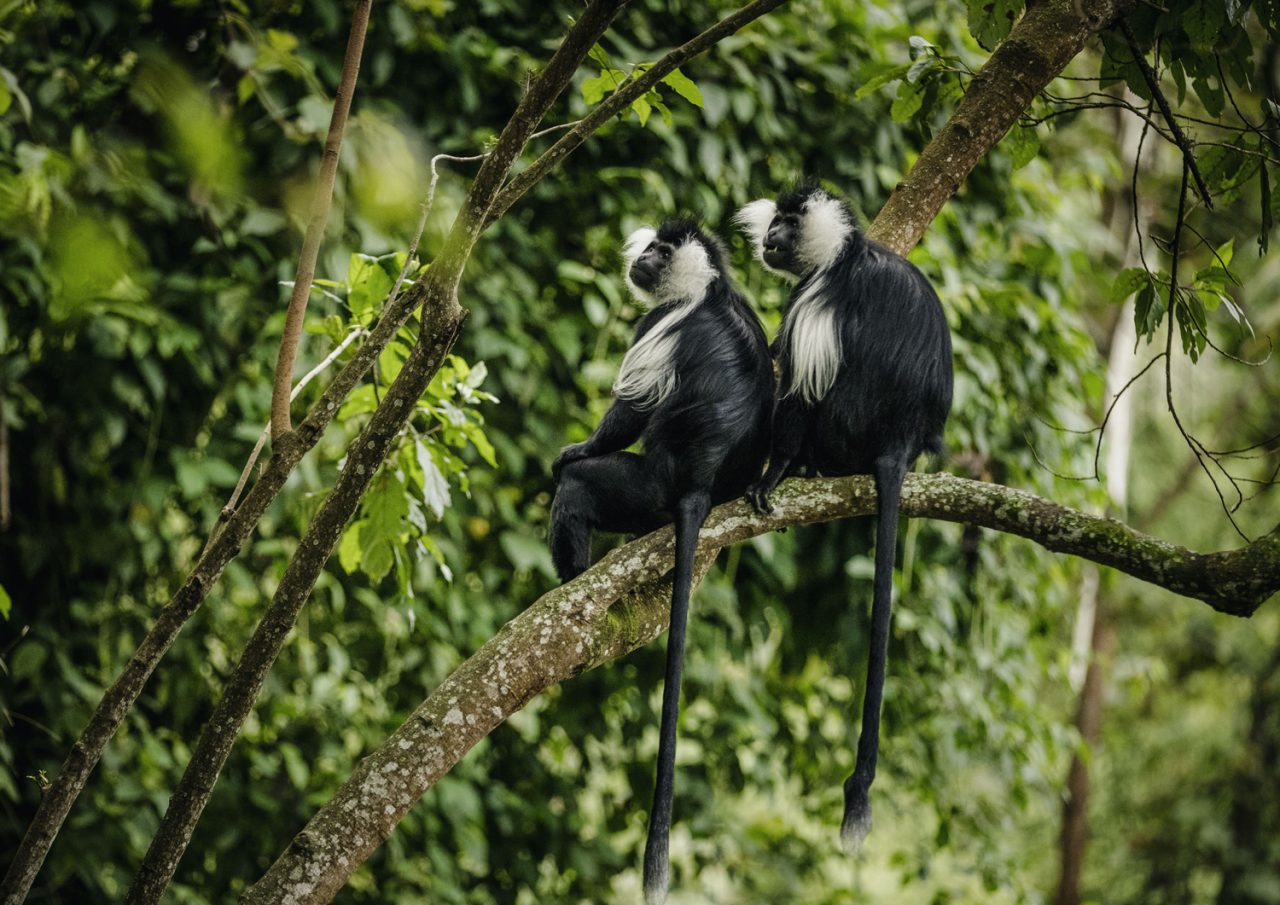
The Great Rift Valley
The west of Rwanda forms a branch of the Great Rift Valley known as the Albertine Rift. It has many unique, endemic species and is bursting with life.
Chimpanzees, golden monkeys and other primates live alongside hundreds of brightly-coloured birds, orchids and butterflies.
And that is only scratching the surface…
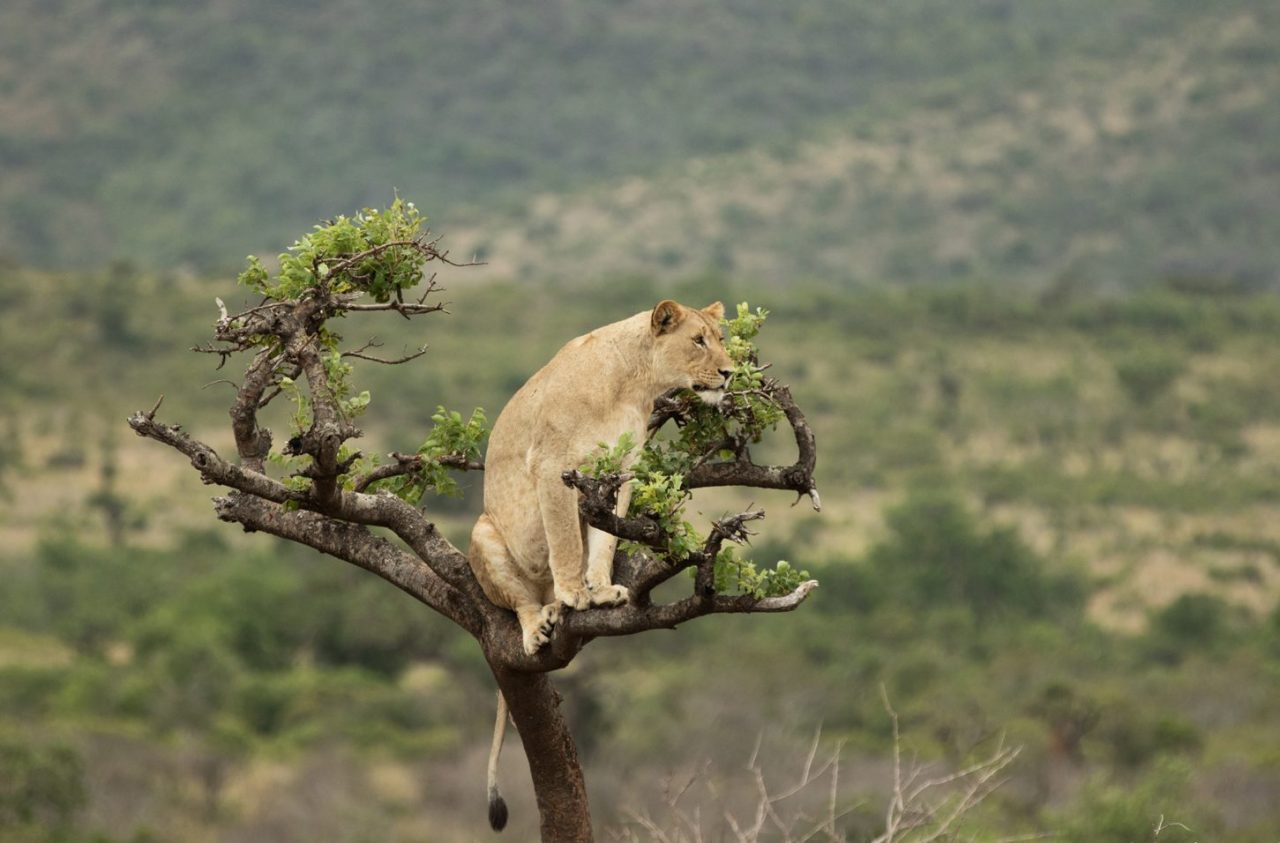
- Responsible Tourism
As guardians of many iconic species, Rwanda is committed to safeguarding their existence within the four National Parks.
We are constantly working to ensure we can live in sustainable harmony with our environment, with a clean and green mindset. We banned plastic bags in 2008, and our lands are possibly the cleanest in Africa thanks to efforts throughout every community.
Ten percent of the income derived from gorilla, safari and other tourist permits, as well as park fees, is spent in partnership with local communities to change lives for the better.
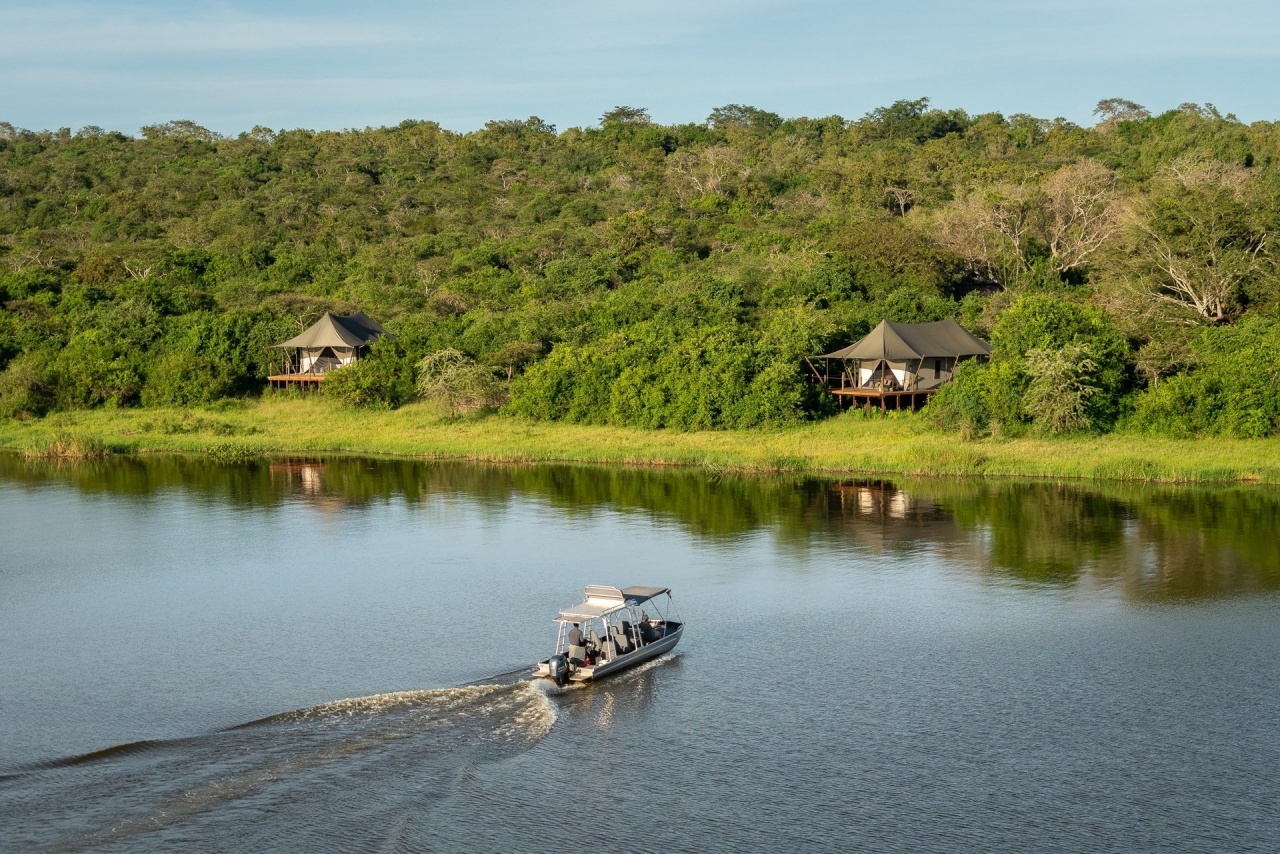
Epic Scenery
Rwanda’s dramatic vistas are endless, with a fresh perspective around every corner.
Our country is full of beauty and managing to explore it all is easy, thanks to an excellent road network linking the core areas.
Visitors can rest assured the country is safe as well as stunning – Rwanda was rankedthe9th safest country in the world by the World Economic Forum.
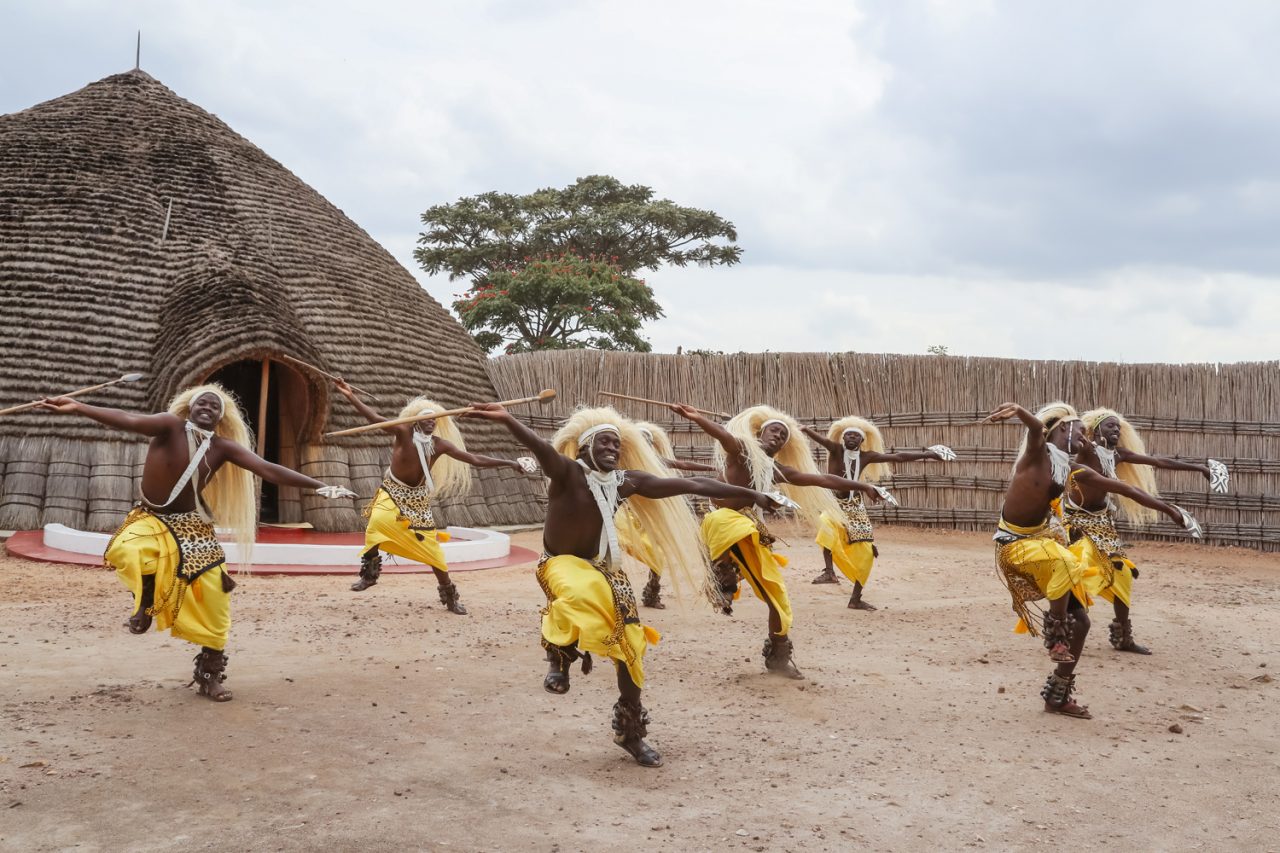
Vibrant Culture
Warm and friendly, Rwandans are also respectful, thoughtful and committed to the idea of progress, starting at the grass roots and running all the way to the top.
From the ancient kingdom to the modern day, creativity is something to be celebrated, whether through traditional dance, unique architecture or works of art.
Gorilla Tracking
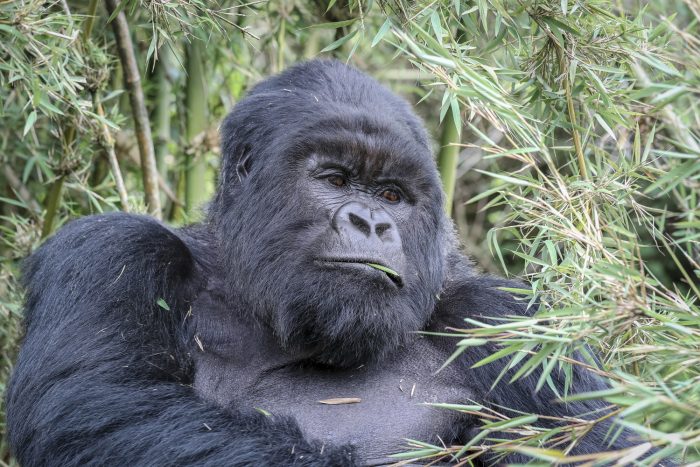
Photo Credit : Annabel Illingworth
Culture & heritage, king's palace.
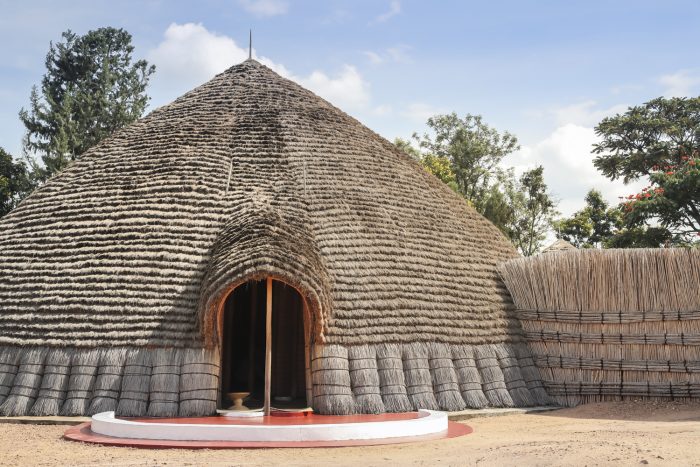
- Accommodation
Where to Stay
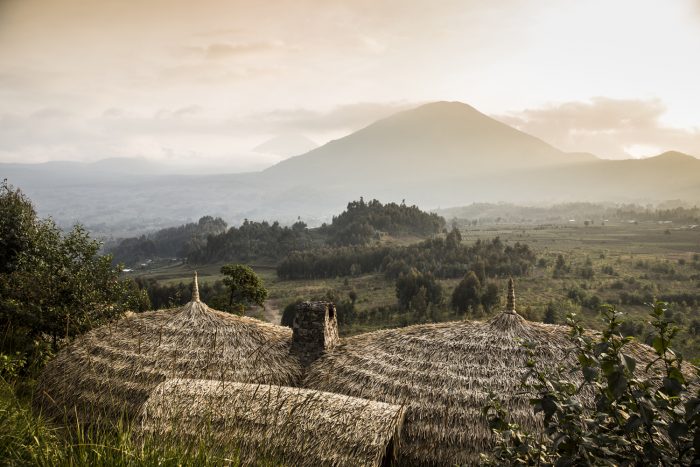
Sport & Adventure
Canopy walkway.
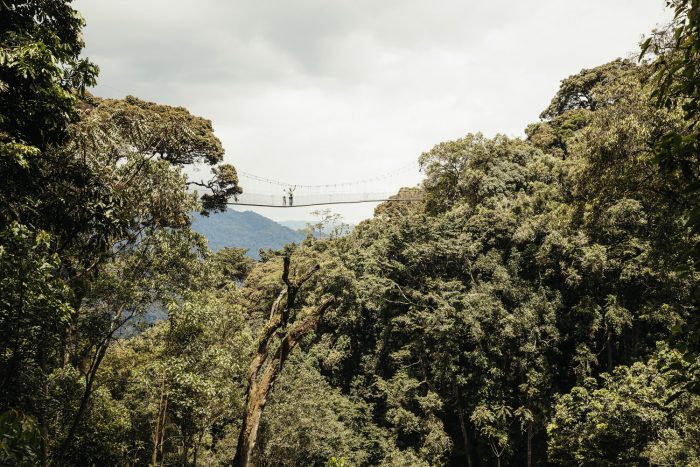
Rwanda is ranked as the second easiest place to do business in Africa by the World Bank and has been awarded for its leadership in tourism and economic competitiveness by the World Travel and Tourism Council (WTTC) and the World Economic Forum respectively.

Paving the Way
The German carmaker has just opened an assembly plant in Rwanda, which will create up to 1,000 jobs.
In a new chapter of economic transformation, VW is also spearheading community car sharing and ride-hailing by smartphone.
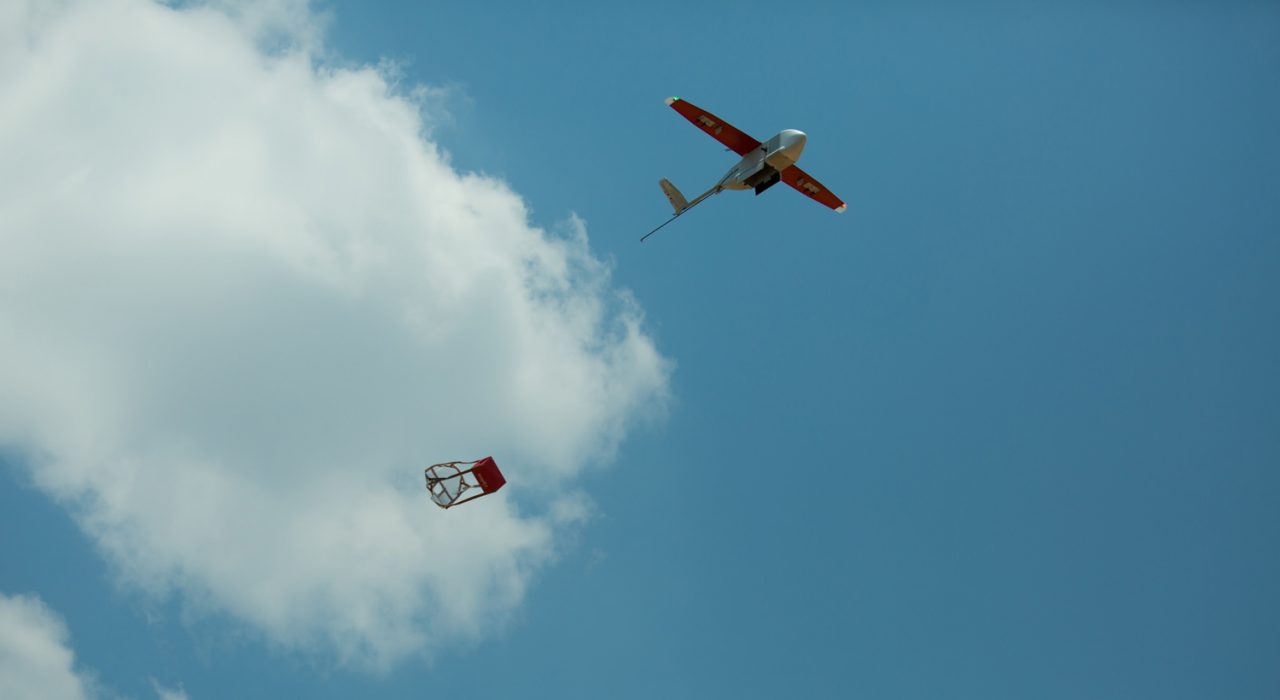
Tech Incubator
Rwanda is an ideal tech incubator, thanks to its compact size and appetite for innovation.
We welcome pioneering initiatives such as that by Silicon Valley company Zipline, which now delivers critical blood products to rural medical clinics across our mountainous lands.
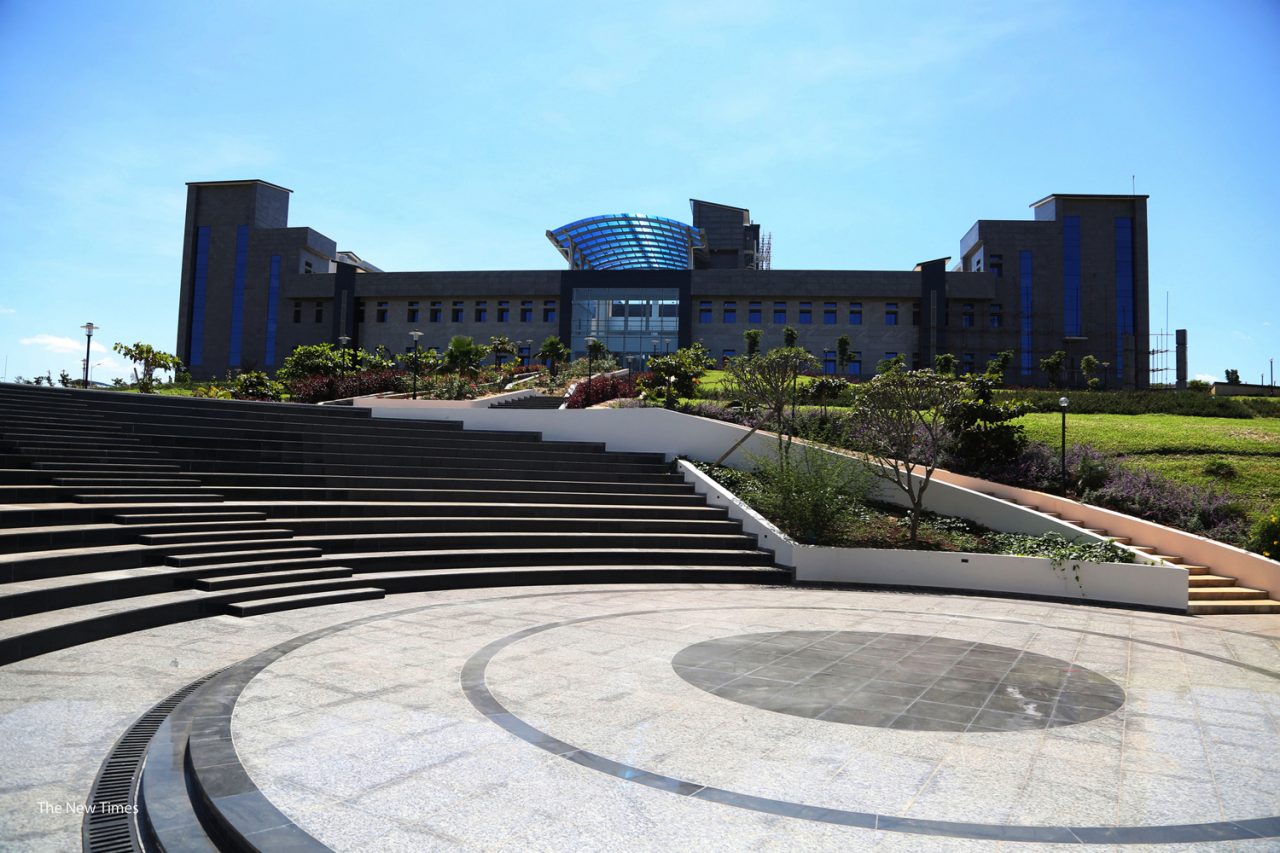
Centre of Excellence
Innovation city.
Discover an area in Kigali for world-class universities and think tanks to mingle with technology companies, helping drive private sector growth.
Innovation City is anecosystem linking high tech industry, research and education with capital investment, which aims to create jobs and reduce our current account deficit.
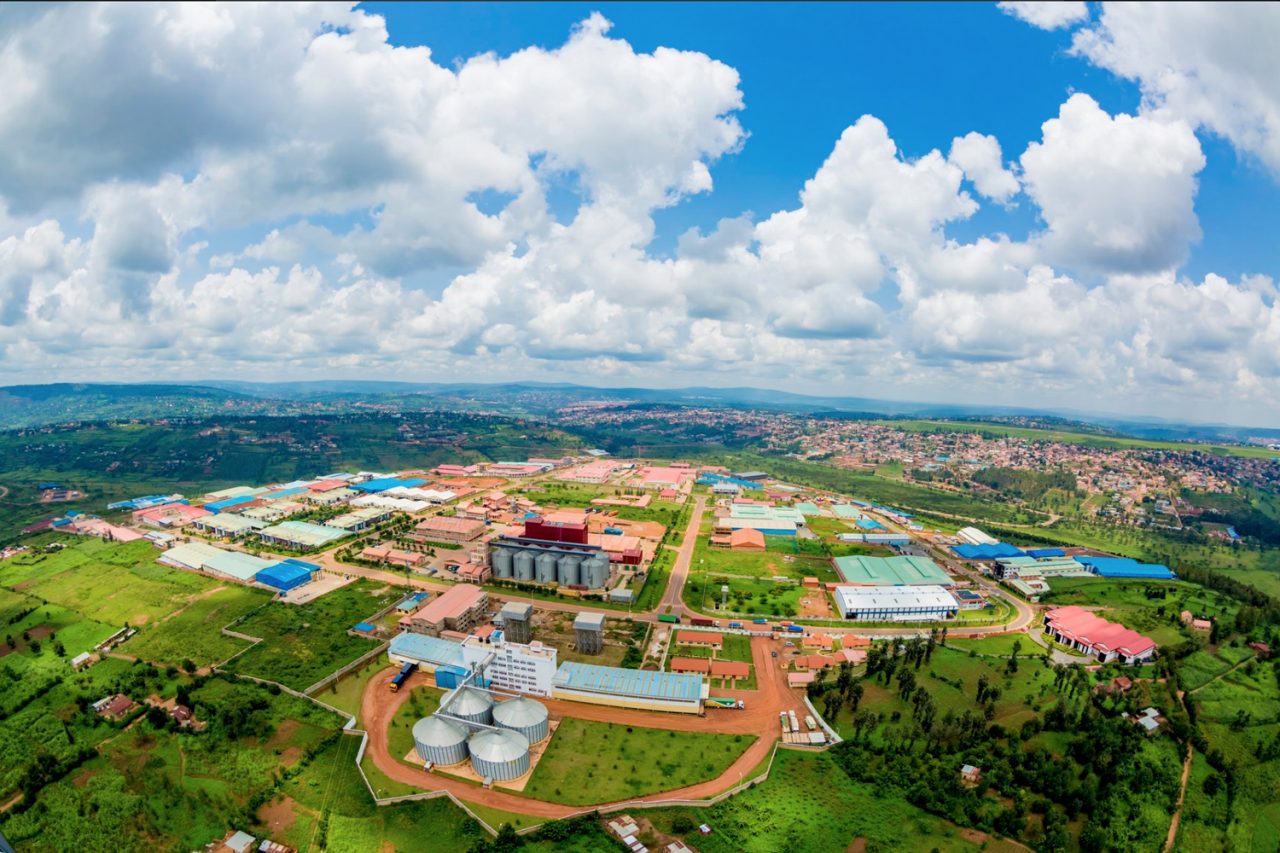
Special Economic Zones
Discover why we are the second fastest growing economy in Africa,and prepare to enjoy the opportunities accrued from the free trade agreements that weve signed with over 50 countries.
Designated serviced land is provided for small and large scale industrial development, as well as reliable, quality infrastructure, competitive fiscal and non-fiscal regulations and streamlined administration procedures.
Five Reasons

How to Invest
Starting a business.
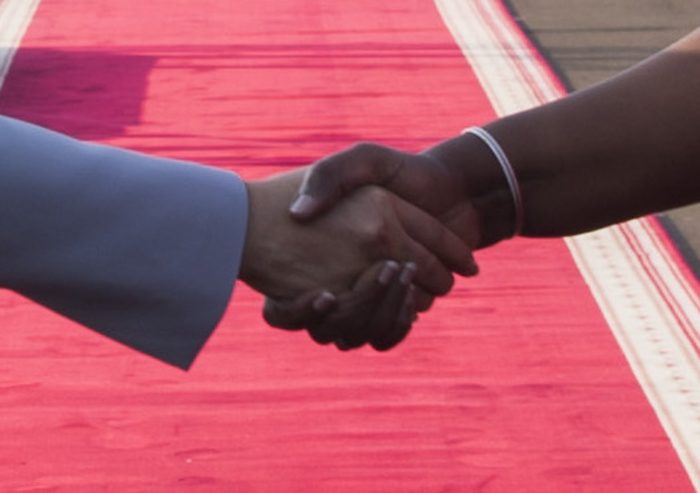
Investment Opportunities
All sectors.
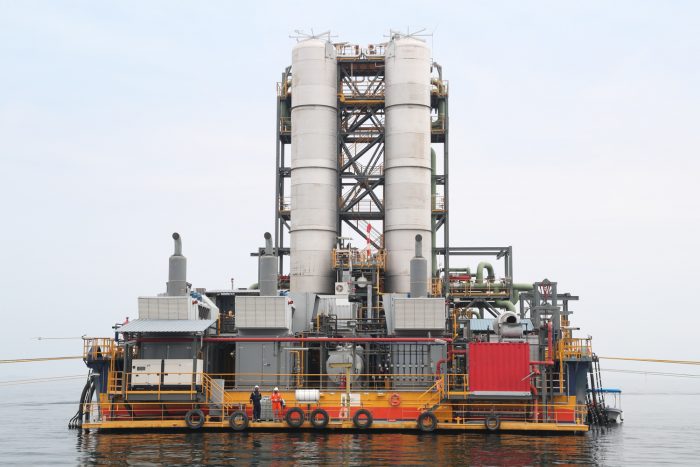
One Stop Centre

Rwanda is an excellent hub for meetings and events, with world-class facilities such as the Kigali Convention Centre which is conveniently located close to Kigali International Airport and offers a premium environment for regional and international conventions, exhibitions, festivals, meetings and other events.
Business Events
Kigali convention centre.
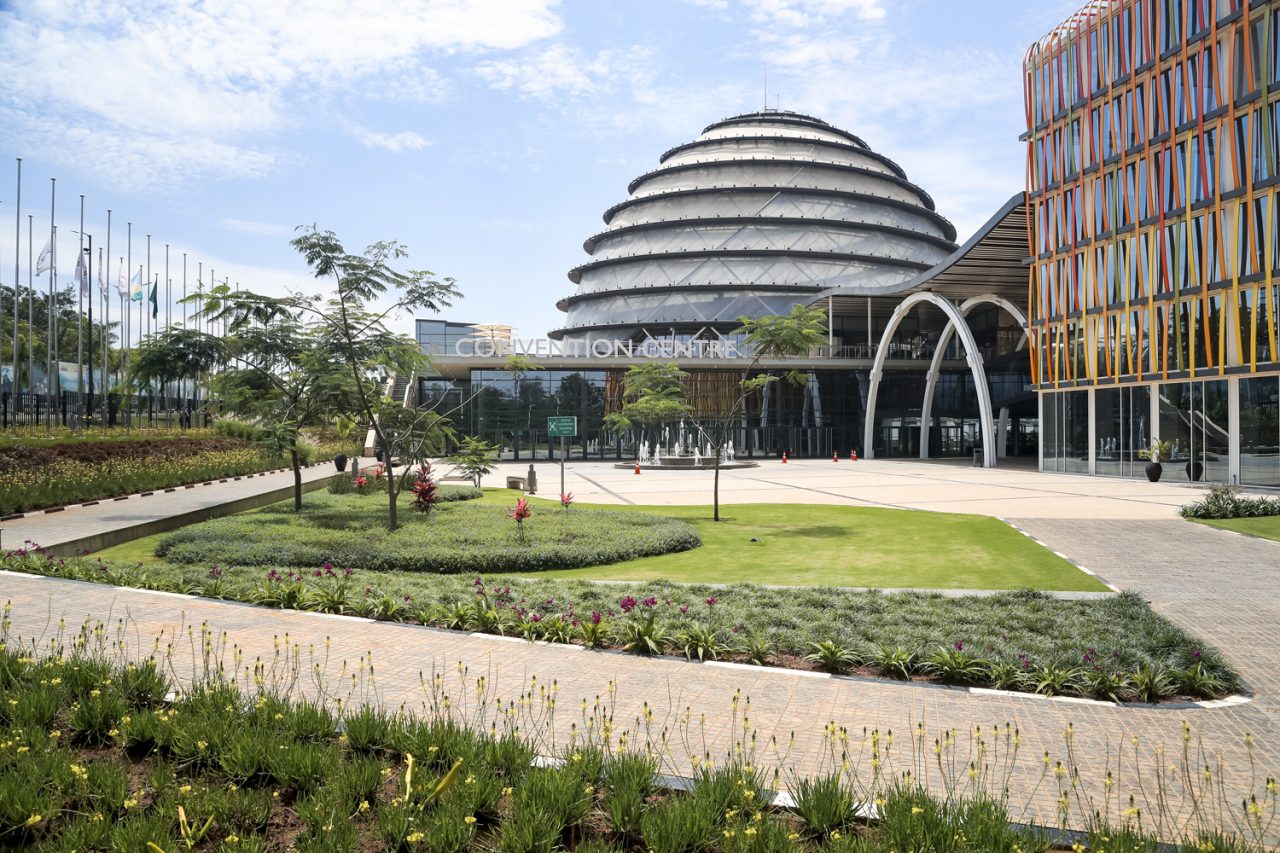
Around the Capital
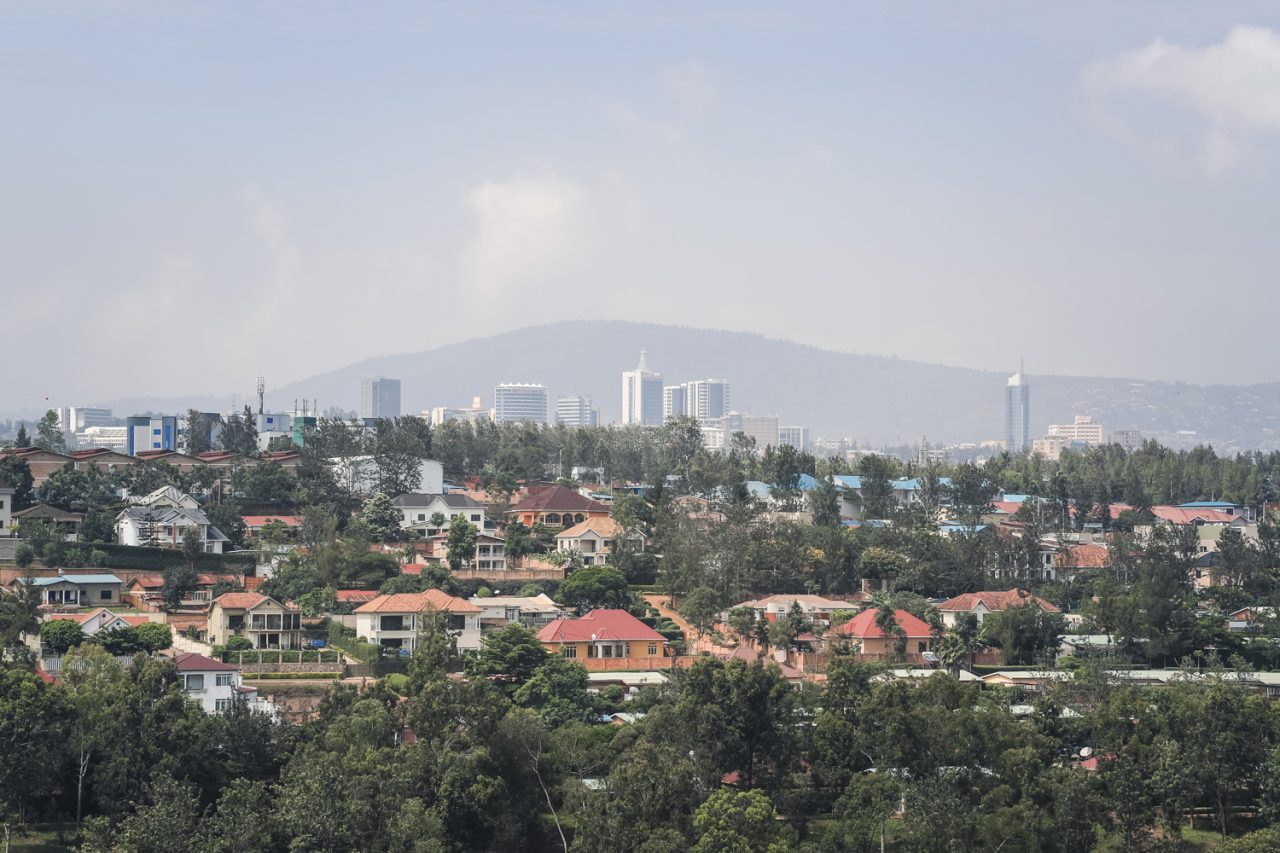
National Airline
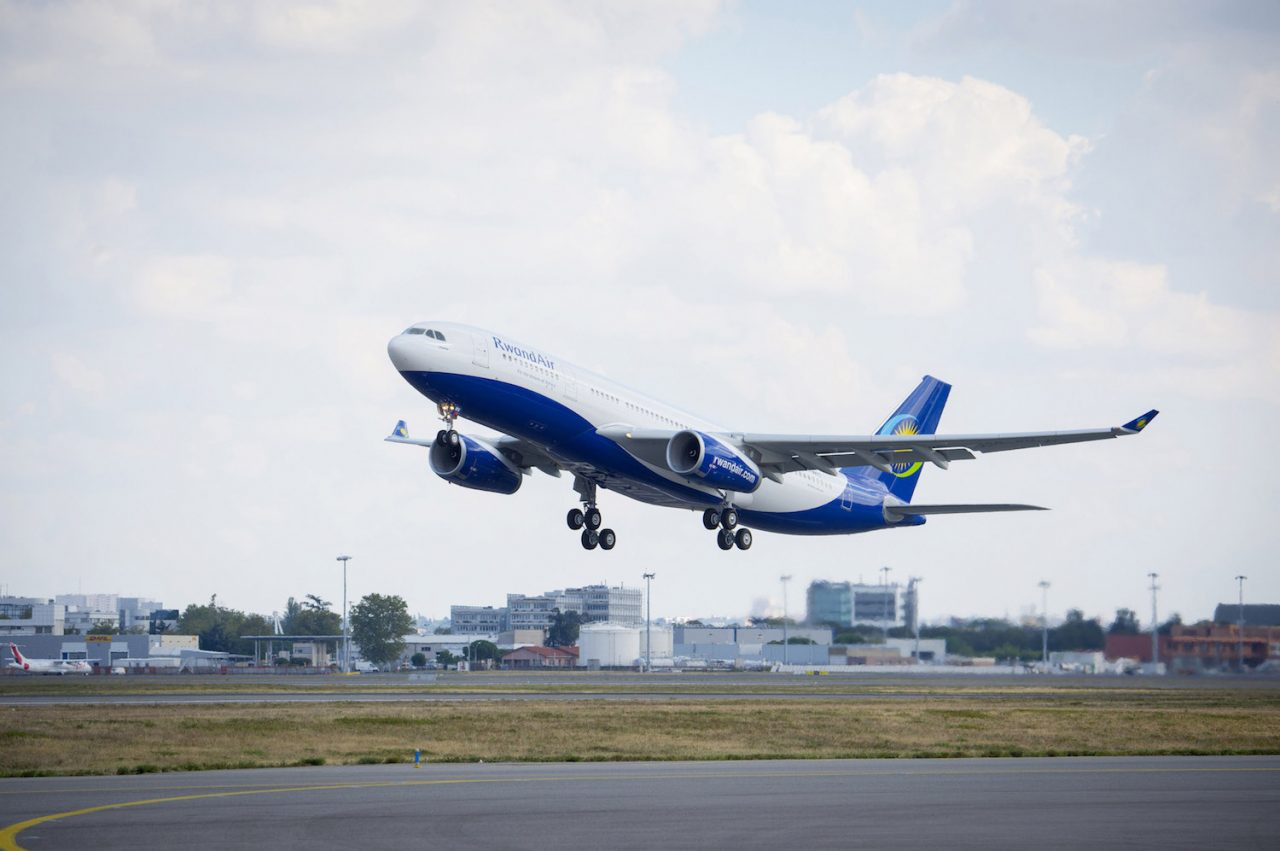
Visit Rwanda is proud to partner with some of the world’s biggest brands to share the beauty of the country with millions around the globe.
Sleeve Sponsor
Premium Partner
Paris saint germain.

Platinum Partner
Fc bayern m체nchen.

Founding and Host Partner
Basketball africa league.
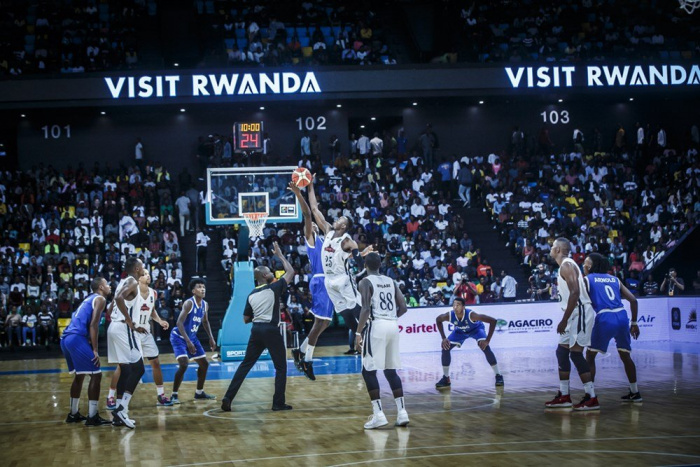
Yellow Jersey Sponsor
Tour du rwanda.
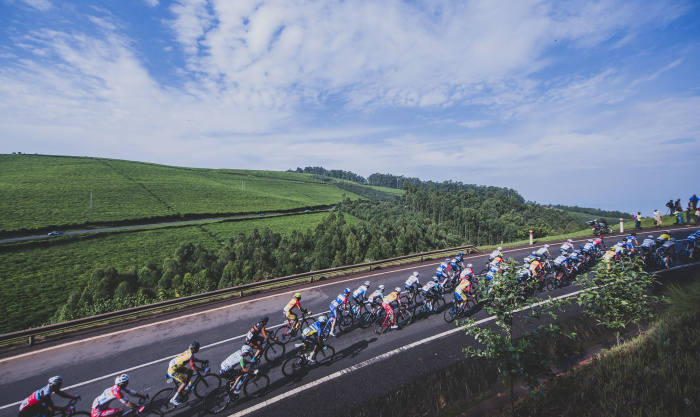
- National Parks
- Culture & Heritage
- Sports & Adventure
- Itineraries

We’re sorry, this site is currently experiencing technical difficulties. Please try again in a few moments. Exception: request blocked
Travel Update - Rwanda added to UK's safe travel list
On 11th October Rwanda was added to the UK's safe travel list.
Rwanda’s removal from the UK travel red list means passengers arriving from Rwanda will no longer have to hotel-quarantine.
For the full UK Government travel guidance for passengers travelling to the UK, including the rules on testing, self-isolation and vaccine recognition please visit gov.uk through the link here: https://www.gov.uk/guidance/travel-to-england-from-another-country-during-coronavirus-covid-19#red-list-rules .
As of 4th October 2021 the rules for international travel to England were simplified to have one red-list, and then regulations for travel from the ‘rest of the world’. As of 4am on 11th October Rwanda will be moved into the “rest of world” category.
Passengers travelling to Rwanda will also need to comply with the Government of Rwanda’s measures to prevent the spread of COVID-19. Before you travel to Rwanda please ensure you have read the Info Note for Passengers Arriving in Rwanda, which can be accessed on: www.rbc.gov.rw .
- Public Notice
Rwandans in UK celebrate Kwibohora29 and launch the annual Liberation Football Cup
ARTICLE: Sending migrants to Rwanda will save lives
ARTICLE: Rwandans are still awaiting justice 29 years on from genocide
ARTICLE: Our young nation is not defined by our history, but by a focus on the future
ARTICLE: Invest in pro-business Rwanda
Rwanda, Malta explore areas of cooperation
Kwibuka29 marked in London - High Commissioner calls for justice to be served on Genocide suspects
Letter by High Commissioner Johnston Busingye on recent media coverage on Eastern Democratic Republic of Congo
ARTICLE: Why places like Yorkshire are right to fall in love with Rwandan coffee
Get In Touch
+44 (0)207 224 9832
Contact Us→
© 2024 Republic of Rwanda
We are using cookies.
We use necessary cookies to make our site work. We'd also like to set analytics cookies that help us make improvements by measuring how you use the site. These will be set only if you accept. For more detailed information for cookies and Personal Data Protection see our Privacy policy
Individual Cookie Settings
Privacy settings
Here is an overview of all cookies use
Required Cookies
These cookies are needed to let the basic page functionallity work correctly.
Show Cookie Informationen
Hide Cookie Information
fe_typo_user
Cookies for Statistics
Statistic cookies anonymize your data and use it. These information will help us to learn, how the users are using our website.
Google analytics
Google analytics provides the statistics of usage visitors
Back Reject
Privacy policy
Home > Rwanda > Rwanda Travel Tips: Dos and Don’ts to Know Before You Go
Rwanda Travel Tips: Dos and Don'ts to Know Before You Go

A Fresh Perspective on Rwanda
This post on Rwanda travel tips is one of four Unconventional Route blog posts about Rwanda. The others are Rwanda's pros and cons , hiking Mount Bisoke , and Rwanda itinerary planning guide .
This blog post of Rwanda travel tips shares what we didn't know before we came and learned along the way.
Since we only visited for eight nights, we're far from Rwanda travel experts. But sometimes fresh tips from a fellow novice can be handier than stale ones from a jaded expert, right? Sometimes ?
Here's hoping you'll find one or two (or all twenty-seven!) of these Rwanda travel tips to be useful.
And if you come up with any tips of your own, please share them in the comments .
Tips for your Trip
These Rwanda travel tips are split into five sections. Jump to directly to any by clicking these shortcut links:
Before Leaving
- Upon Arrival
While in Rwanda
Things not to do.

Before Going to Rwanda
✓ get and read the bradt guidebook.
Put it this way: If Bradt decided to transform all the info from its Rwanda guidebook into a blog, you wouldn't need to read this post or any other.
It had all the information we needed for our trip—much more than you'll find anywhere online—plus bonus sections with stories and background on specific topics that added color to what we saw.
Get a copy from a friend who's been to Rwanda and has a copy, a library, your local bookstore, or Amazon .
✓ Read up (or watch up)
I was glad to have read Road Trip Rwanda (a lighter read) and We Wish to Inform You That Tomorrow We Will be Killed With Our Families (dense and heavy) before visiting. And I had hoped to get through A Thousand Hills to better understand Paul Kagame and what happened after the genocide, but had a thousand other things to do before our trip and ran out of time.
For non-readers, a couple movies to watch are Shooting Dogs and Hotel Rwanda .
Or get an audiobook: You can listen to it as you drive around Rwanda. If you don't have an Audible account yet, sign up to get your first book free .
✓ Understand the confusing city name situation
When it comes to the names of Rwanda's cities, you have to be kind of bilingual. (Bi-nom-ual?)
That's because in 2006 the Rwandan government got rid of its old provincial lines, redrew four new ones (North, South, East, and West), and renamed many of its cities.
Some of those city names, like Musanze over Ruhengeri close to Volcanoes National Park, have been embraced. Most others have not. For example, you're more likely to see and hear Kibuye (old) over Karongi (new) or Gisenyi (old) over Rubavu (new). For Butare (old) / Huye (new), we heard an equal mix of both.
✓ Note the exchange rate
Our hotel tried to pull a fast one on us and charge us 20 USD for a shuttle from the airport that they'd quoted us 15,000 RWF on. They said it's "approximately" the equivalent. Yeah right. At the time, 1 USD was worth 950 RWF so 15,000 RWF actually equals 15.75 USD. They overcharged us by approximately 27%.
✓ Check the travel advisories
Rwanda's as safe as everyone says but it's got a couple of unruly neighbors. And some say Rwanda's hiding some stuff in its basement that could get nasty if it got out, too.
Play it safe and double-check the status before heading there. As we shared in our top travel tips and tricks , we find the UK's advisories to be the most reliable.

✓ If you decide to rent a car
As far as we could tell, the only international rental car company in Rwanda is Europcar. It's overpriced and overburdened with policies like mileage limits and damage deposits.
Rent from a Rwandan company instead.
Here's how:
- Google "Rwanda car rental" to get the email addresses of a few companies.
- Email them for quotes. Better yet, ask them if they'll rent to you a self-drive Rav4 or equivalent for 30 USD a day. This includes additional drivers, unlimited mileage, and insurance.
- Pick whichever company offers the best rate and get their WhatsApp contact to coordinate.
- When you arrive, they'll bring the car to you. Give it a quick test drive and pay. Cash only .
- Fill it up at the nearest gas station because they'll deliver it with fumes in the tank.
- Explore Rwanda.
- Return the car in one piece and with an empty tank. Since it's a cash transaction, there's no inspection or charges for scratches or dings.
Shoutouts to Jeannine from Car Self Drive Rwanda, [email protected]. We had a zero-fuss experience renting from her.
Worried about driving in Rwanda? Don't be. Rwanda's roads are good, drivers are courteous, and traffic is moderate. Only worry about the low speed limits. Kim got a ticket within the first hour of driving.
✓ Pack these items
- A few hundred USD. For paying for your rental car and for emergencies.
- Water bottle. You can't drink the tap water and Rwanda's anti-plastic, so fill up your water bottle at your hotels every morning. If you're on the market for a new water bottle, get the CamelBak chute , one the rare things I'd I'd immediately buy again if I lost it .
- Clothing that covers your knees for women . Not only is this respectful, but the chances you'll be bitten by malarial mosquitos also will far lower.
- Duty-free wine. Especially if, like us, you're coming from South Africa. Wine's way overpriced in Rwanda. Even if you don't drink it makes for a good gift for your hosts.
- More warm clothes than you think. While Rwanda's just south of the equator, much of it's a mile or more above sea level and it's often misty or rainy.
- The regular stuff. See my always-evolving 57-item packing list and Kim's 15 travel essentials for more ideas on what to pack.
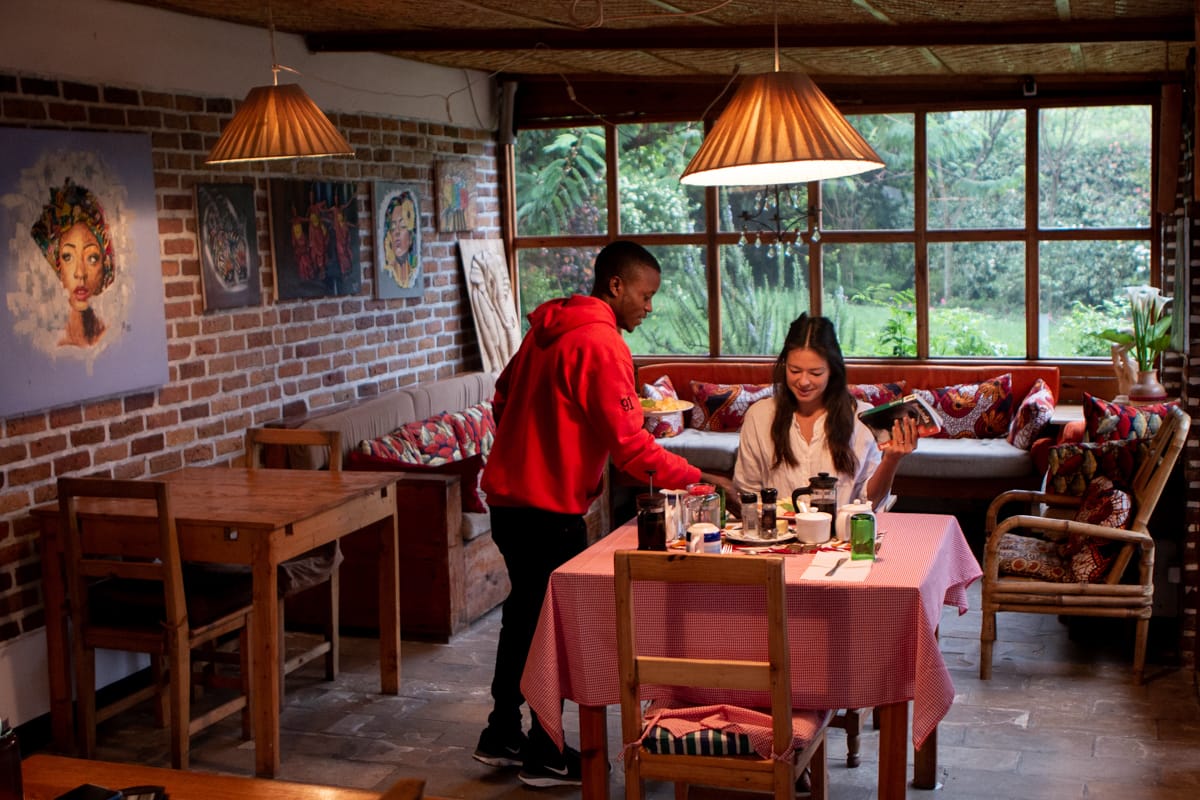
✓ Stay somewhere with good showers and laundry for Volcanoes National Park
After a messy adventure up and down Mount Bisoke in Volcanoes National Park were grateful our guesthouse, La Locanda , had strong warm showers, staff that offered to wash our clothes before we took off the next day, a fireplace to warm up at and dry our shoes by, and a tasty on-site restaurant.
You'll likely be grateful for the same whether you go gorilla or golden monkey trekking, hike to the Dian Fossey memorial, or up and down the volcano.
✓ Don't let Rwanda's small size fool you
With its "thousand hills," Rwanda's like a bunched up sheet of tin foil; if you were to flatten it out, it'd cover a much larger area. And the indirect roads that swerve through the hills combined with painfully slow 40km/hr speed limits make it seem bigger.
✓ Use our honest itinerary tips to decide what to squeeze in
Our Rwanda itinerary tips blog post shares our opinions on the pros and cons of the country's main areas, plus advice on what to do and where to stay in each.

Upon Arrival in Rwanda
✓ dump your plastic bags (or hide them).
Any skeptics who claim plastic bag bans are worse for the environment should visit Rwanda, which has been bag-free since 2006. The country's lack of trash and cleanliness may just change their mind .
Rwanda takes its bag ban seriously. Agents at the airport's baggage carousels are on the lookout to confiscate whatever they can. They even took the duty-free bag our wine was in.
But they don't have plastic bag smelling dogs yet. I managed to smuggle one inside my jacket pocket, which I wanted to use for what I expected to be extremely dirty clothing after our Mount Bisoke hike in Volcanoes National Park.
✓ Get a SIM card
MTN has a booth beside the parking lot outside the arrivals terminal of the airport. If you prefer to be a bit contrarian, there's an Airtel around the corner. A SIM card costs 1,500 RWF and 1 GB of 4G data costs 1,000 RWF.
Cell reception is reliably strong just about everywhere in the country.
✓ Withdraw cash
Get cash from the ATMs outside the airport because smaller businesses in Rwanda, and even some gas stations, don't take credit cards. Or their machines "are out of batteries."
You might have to make two withdrawals because the limit is 200,000 RWF (~200 USD).

✓ Adjust your internal clock
You're going to have to wake up early for trekking in Volcanoes and Nyungwe and safaris in Akagera, so you might as well get used to it. Try to go to bed early to wake up by 6 a.m. In doing so, you'll be rewarded with more bird sightings, beautiful sunrises, longer days, and more sun (as the rain tends to arrive in the afternoon).
✓ Choose wisely between RWF and USD to save some money
Whenever you have the option of paying in Rwandan francs or US dollars, ask for the price in both currencies and pay whichever is cheaper.
For example, the park fees for our two nights in Akagera were 212 USD (50 per person per night, plus 12 for the car) or 194,000 RWF. At the true exchange rate our travel credit card uses, 194,000 RWF was only 202 USD at the time, so paying in RWF instead of USD saved us 10 bucks.
✓ Tip appropriately
The tipping situation in Rwanda is less cut-and-dry than anywhere we've traveled. There is no default rule of X% or $Y for doing Z. So we're not 100% sure about this travel tip, but you can't sue us so we'll share it anyway.
We decided to go "old school." If the service was really good, we were tipped generously. If was terrible, nothing. And, since people in Rwanda could use our money better than us, we erred on the side of generosity—But not so generously that they'd start expecting big bucks from every tourist they serve.
✓ Use Yego to know how much to pay for motorcycle taxis
To avoid paying muzungu prices for motorcycle taxis, use the Yego app to get the true price, show it to the driver if they try to overcharge you, and don't pay any more than what it says.

✓ If you're going on an Akagera safari
- Fill up before getting into the park. There are no gas stations inside.
- Drive out the north exit. It's an all-day drive from the south entrance to the north exit, but we found more animals in the open savannah up north than in the dense bush down south.
- Hire a guide. Our guide Samuel didn't have the best English and wasn't eagle-eyed (he actually had a lazy eye), but he knew a heck of a lot more than us about wildlife and could tell us where to go in the gigantic park. Hiring Samuel also gave us the chance to chat with a Rwandan for a full day. His story of surviving the genocide as a 2-year-old (his mom hid him under his shirt when she was murdered), then struggling to make it as an orphan was more memorable than any animal sighting. And the 40 USD does him and the park a lot more good than whatever we'd fritter it away on otherwise.
- Stay a night or two. Ruzizi Tented Lodge and Karenge Bush Camp let us bloggers stay for free, and they're not cheap otherwise, so our opinion may be biased, but we honestly think the experience of staying a night or two in Akagera is worth it. It gives you the chance to see more animals when they're most active in the twilight hours, the camps have beautiful settings, the staff and food's outstanding, and the sunrises, sunsets, and stars are stunning.

✓ Ask how long the food will take before ordering at restaurants
Some dishes can take well over an hour to prepare at Rwandan restaurants. If you rather not wait, ask which ones are relatively speedier. Or pre-order your meals earlier in the day at your hotel's restaurant.
✓ If you like spicy food, try the Akabanga
Akabanga is a super spicy sauce that comes in an eyedropper bottle. It's as omnipresent as salt atop Rwanda's restaurant tables and has made a one-time street vendor named Sina Gerard one of Rwanda's richest men .
Stop by Akabanga's birthplace, Nyirangarama, to get your own bottles (500 RWF) on your way between Kigali and Volcanoes National Park.
They sell Rwandan wine (7,000 RWF) and canned banana beer (1,000 RWF) there, too. We advise against wasting money on the wine and recommend getting just one can of banana beer. It may satisfy your curiosity but almost certainly won't satisfy your taste buds.
✓ Ask for avocado
Avocados abounded when we visited Rwanda in January/February. Even at a mzungu premium, we got them for 100 RWF each.
Unfortunately for us avocado fans, most of the restaurants we went to didn't offer avocado on their menus. They didn't seem to understand how much we enjoy them. But if we asked they were often able to add them to our orders.

✗ Don't drive at night
We did it once—after losing track of time post- Mount Bisoke hike —and never again.
Oncoming cars and trucks veered into our lane as if our car didn't exist and the cyclists and pedestrians on the roadside didn't seem to realize they're barely visible at night. It was terrifying.
✗ Don't speed
We learned this the hard way. We got a 25,000 RWF fine within our first hour on the road.
The speed limits change from 80 km/h to 40 to 60 with no rhyme or reason, so keep an eye on the signs. And even when it seems unreasonable to go 40 km/h, abide by the limit or pay the consequences. Speed traps are everywhere. So are children, cyclists, and other pedestrians on the street.
✗ Don't arrive in Rwanda on umuganda
Umuganda happens on the morning of the last Saturday of every month. All Rwandan citizens aged 18 to 65 are required to participate in community service and everything else closes and grinds to a halt.
It's nice to see and great for driving around because the streets are empty, but, take it from us, it's a hassle if you've just arrived in Rwanda and are trying to sort things out.
✗ Don't dig up nightmarish memories
It's hard not to be curious about what people's experiences were during the genocide, but many understandably prefer not to talk about it. Wait for them to bring it up and go to the genocide memorials around the country to learn from the displays and staff there.
✗ Don't be concerned about being the only mzungu
If you don't look Rwandan, you'll be the center of attention any time you show your face in just about any town outside of Kigali. Adults will stare. Children will sing "Ah… ah… abuzungu" ("White people!) and rush towards you. And some brave people will mosey on up to your car to peek inside.
Be a good ambassador for all of us foreigners. Wave, smile, ignore any requests for money, and say, "Muraho" ("Hello" in Kinyarwanda. Pronounced like mor-ah-ho with a Spanish-style r flip).

✓ Head to the airport 15 minutes earlier than normal
Kigali's airport has heavy security. To enter the grounds, you need to empty your vehicle, put it on a conveyor belt scanner, and go through a detector yourself.
If you happen to be flying out at a busy time, there might be a lineup. Plan accordingly, just in case.
✓ Buy some coffee and crafts
Having lived in Colombia , done professional cuppings in Kenya , and blind taste tests of coffee in Vancouver , Cape Town , and Costa Rica, we've tried a lot of coffee. And the brews we had in Rwanda are right up there with the very best. Question Coffee, whose café is in Kigali, was Kim's favorite. Pick some freshly-roasted beans up before you return home.
Help us improve these Rwanda travel tips and help other readers by leaving a comment . Ask questions we didn't answer, challenge our tips, or share your own. Don't be shy. We want to hear from you.
Have a great trip! (And don't forget to check out our three other Rwanda blog posts—links below!)
Like this post? Pin it for later!

Read This Next:
Rwanda blog posts.

Is Rwanda Worth Visiting?

Mount Bisoke Hike in Rwanda's Volcanoes Park: A Practical Guide

Rwanda Itinerary Guide: Honest Advice for Planning an Awesome Trip
Unconventional Guides

50+ Travel Tips and Tricks That Will Change the Way You Travel

The Best Countries to Visit in the World for 18 Unique Trips

Our Rare Few Favorite Things We'd Immediately Buy Again
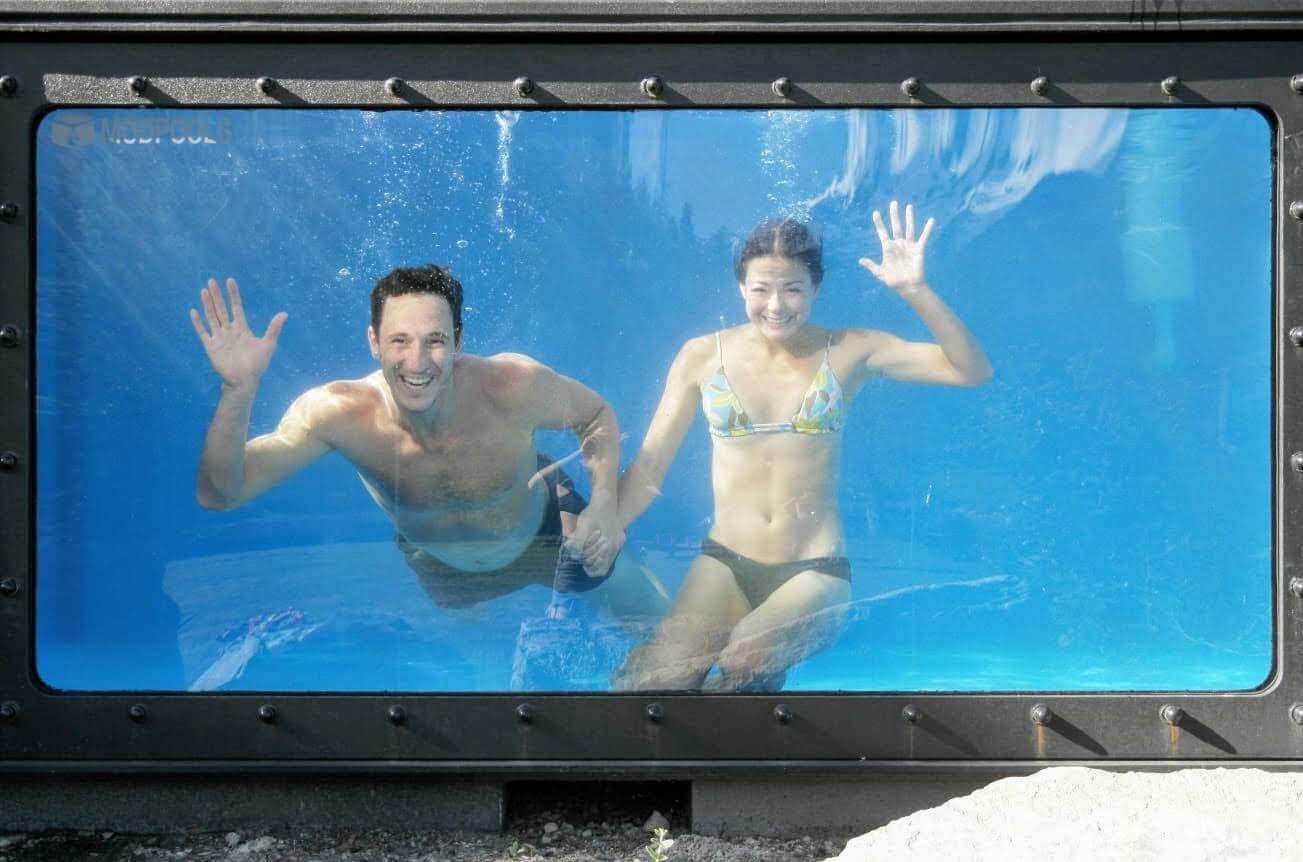
About The Unconventional Route: Our Past, Present, and Future
Disclosure: Whenever possible, we use links that earn us a cut if you pay for stuff we recommend. It costs you nothing, so we'd be crazy not to. Read our affiliate policy .
10 thoughts on “Rwanda Travel Tips: Dos and Don'ts to Know Before You Go”
Love love love this guide! I want to go to Rwanda someday in the near future, so I will definitely keep this post in mind
Glad to be of service, Suzan!
I'm glad I found your blog while searching for Mount Bisoke hikes information…. I will take a deeper look later, thanks for sharing your adventures 🙂 I will be in Rwanda in february 🙂
Glad to hear it Alexandre. Here's hoping you have a Rwanda-rful time in Feb! If you come across anything to add during your trip, please let me know.
want to see the gorillas but one of us can't survive a long ride over bad roads. How is the road from Kigali to Musanze ? And how is the road from where we should stay to where the gorilla trek starts? We can walk fine over rough ground, but bumpy roads kill her back.
The roads aren't bad. All paved until the last little bit, which is slow. The hiking can be really tough though.
Thank you for your tips. Very informative. Going to Rwanda August 2023 and only have 4 free days (working there). 2 of the free days are consecutive. Gorilla trekking too costly but thinking of doing a one day safari to Akageera. Do you recommend? Not renting a car. What are the absolute 'must sees' for such a short period of time?
Hi Edite. I wish I were the right person to ask about "must sees," but I think that's entirely subjective and the best travel experiences are unexpected stories. My suggestion since you're going to be working there? Ask people when you're in Rwanda for inside tips and contacts. Follow those leads in search of something extraordinary (…or, at least, their suggestions for "must sees"). Happy travels!
Thanks for your amazing tips and lessons learned. We'll be heading to Rwanda with our kids (7 & 10) at the end of May, and will be taking a similar route but spread over 3 weeks.
You wisely spoke of getting cash out of ATMs before hitting the road. Couldn't agree more based on our previous travels (Qatar, Oman, China, Mongolia, Russia). A lot has changed in global infrastructure since we last last travelled, so I was wondering if you were able to access cash from your Canadian bank account, or if you accessed cash from other sources (e.g. cash withdrawals from credit card).
We're from Ontario. I know we can bring cash given that we have access to good foreign exchange at home, but I'd rather not arrive with 3 weeks worth of cash for four people at the start of vacation. Back-end logistics on this would be super appreciated!
Many thanks!
Lucky kids you have! And good for you. An inspiration for Kim and I, with our 2.5 and 0.5-year olds. I have a Citibank account from my days in corporate that charges 0 exchange and ATM fees on foreign withdrawals, so can't help you with your question. May be worth looking into similar deals with Canadian banks? Or something like Transferwise's debit card?
What do you think? (Leave a Comment.) Cancel reply
- Deutschland
Is Rwanda Safe To Visit?
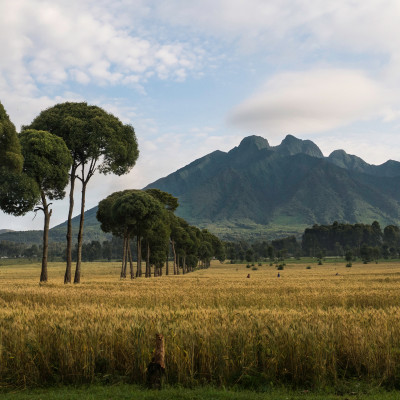
How to stay safe in Rwanda
Before you set out on your Rwanda safari , most prudent visitors have this question: is Rwanda safe? The answer is that, the country is completely safe for travelers. However, it is always a good idea to follow some basic safety measures to ensure that your trip is stress-free.
Since the 1994 genocide, Rwanda has stabilized greatly. Democratic elections have been held and Rwanda is one of the most stable and safe African countries. It is relatively easy, safe and simple to travel around in the country. With Uganda in the north, Tanzania to the east, Burundi to the south, and the Democratic Republic of the Congo to the west, the landlocked nation offers safe and secure travel experiences.
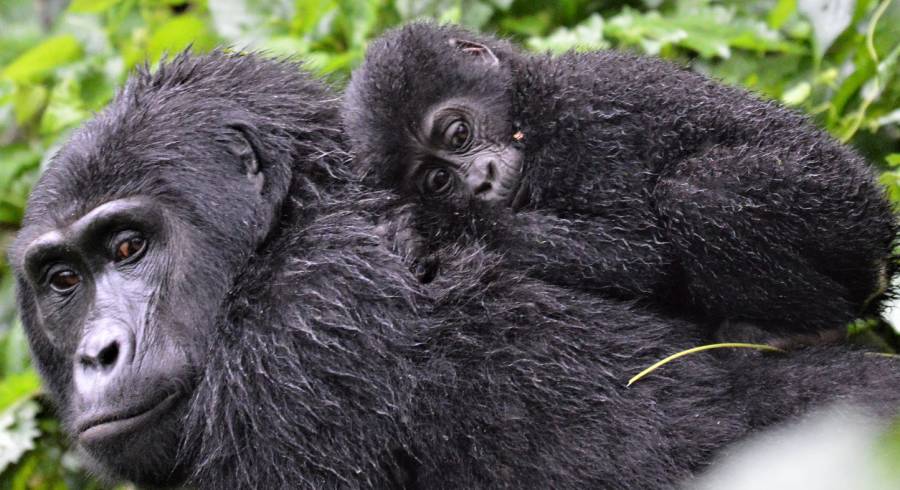
Is Rwanda safe: Travel Tips from our Experts
All visitors to Rwanda are required to present a valid yellow fever certificate of vaccination on entry. Malaria risk exists throughout the year in the whole country. Much of the region lies at too high an elevation for malaria to be a major concern, but the disease is present and prophylactic drugs are strongly recommended. Please seek medical advice before travelling. Hospitals are available at all major towns.
Never drink water from the tap. Instead, purchase bottled mineral water which is readily available in all towns.
Warning: Gorillas are susceptible to most human diseases and if you are knowingly carrying a contagious disease (especially flu) do not attempt to trek.
A standard trek can be a strenuous hike lasting between one to four hours each way. Tracking in thick forest at heights up to 3,000 meters, traversing steep-sided mountains and ravines can be tough, arduous and wet. You must be fit, in good health and properly equipped for this.
Please note that children under 15 years of age are not permitted to visit Rwanda gorillas .
We suggest that you make arrangements so that you and your property are fully insured for the duration of you stay, as well as for travel in light aircraft if applicable. Similarly, we recommend arranging for adequate insurance in the unforeseen event of the cancellation of your safari.
General safety tips for Rwanda
- It is not advisable to carry your valuable on your person. Always leave your valuables in the safety box of your hotel.
- Keep your wallet and mobile phones tucked away, so no one can see them.
- Check with your hotel staff, your guide or your Enchanting Travels Trip Coordinator that the areas you are planning to visit are safe.
- Avoid lonely streets especially at night. In major towns, stick to busy streets and areas especially if you are walking alone. Whenever necessary, ask your hotel staff to call you a taxi.

Is Rwanda safe?
Are you still wondering: is Rwanda safe? Our travel experts are happy to answer any further questions you may have and plan completely customized, private and safe Rwanda trips for you. Get in touch with us for your tailor-made itinerary.
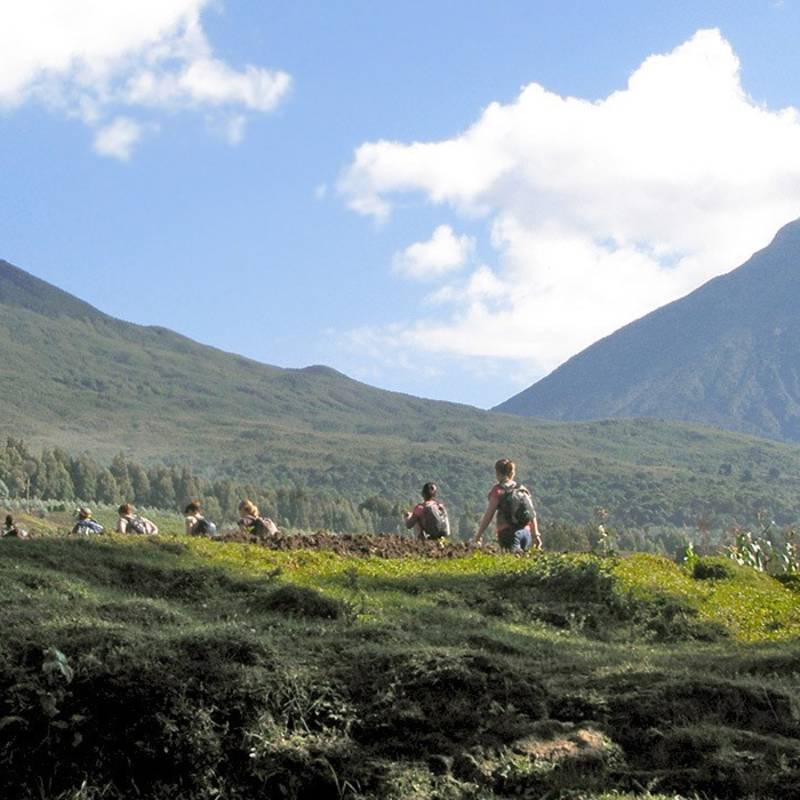
Popular Trips to Rwanda
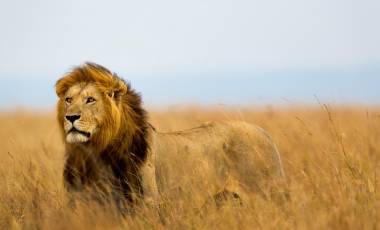
Highlights Africa: Masai Mara, Gorillas and Cape Town
Be enchanted by some of the most awe-inspiring spectacles on earth on this bespoke Africa safari vacation. Three iconic destinations await you on this trip: the Masai Mara, a vast golden savannah that has inspired classic African safari dreams, Volcanoes National Park in Rwanda where you can come face to face with endangered mountain gorillas,…
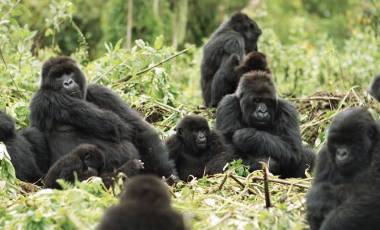
Gorilla Trekking in Rwanda
Follow in the footsteps of Dian Fossey. This short trip takes you deep into the heart of gorilla territory – Volcanos National Park, where half the world’s gorilla population lives! With trekking activities, forest walks and plantation visits on offer, there are few better ways to discover the Rwandan wild.
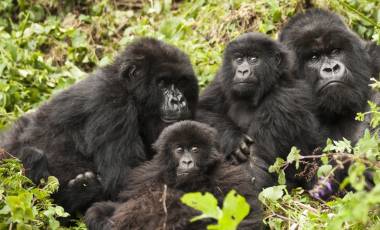
Kenya and Rwanda: Call of the Wild
Hear the call of the wild in this epic adventure of Kenya and Rwanda. This tour takes you gorilla trekking in Volcanoes National Park and to the wildlife of the Masai Mara and Laikipia. Soak up authentic and contemporary African culture in the cities of Kigali and Nairobi.
Best Places To Visit
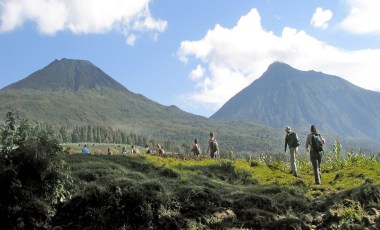
Observe gorillas! Volcanoes National Park is part of the Virunga Mountains protected area, also part of Congo and Rwanda.
Volcanoes National Park
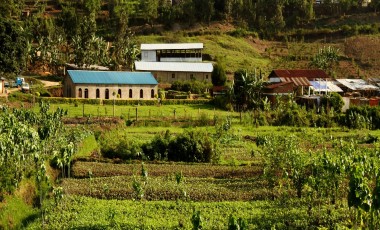
Kibuye is an idyllic lakeside town on the shores of Lake Kivu, one of the world’s largest inland bodies of water, home to a wide variety of birds and plants.
Lake Kivu – Kibuye
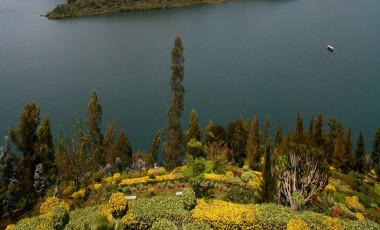
Lake Kivu is the largest of fresh water lakes that simmers in the valleys of Rwanda with irregular shores that form numerous inlets and myriad forest-fringed waterfalls.
Lake Kivu – Gisenyi

Nyungwe Forest National Park is an enormous high-altitude, mountainous tropical rainforest with a canopy that extends across the majestic hills of southeast Rwanda.
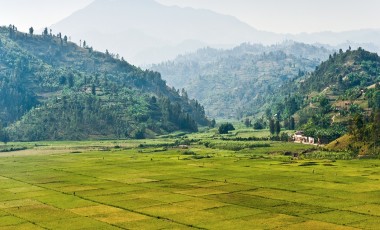
As Rwanda’s capital and its geographical heart, Kigali is an important business center and port.
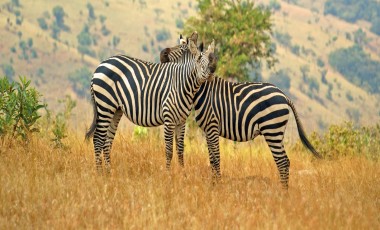
Explore a labyrinth of swamps and lakes! To the east of Rwanda lies Akagera National Park – a typical African savannah landscape punctuated with eight lakes.
Best Time To Visit
Rwanda has a pleasant, tropical-highland climate – while it is warm throughout most of country, the high altitude mountains are cool and pleasant with a fair amount of frost. Volcanoes National Park can be particularly wet in the rainy months. Discover the best time to visit from our experts.
Things To Do
From the forests to volcanoes and endangered mountain gorillas, museums that document the country’s tragic past, and indigenous cultures in its remote villages, there are so many things to see and do in Rwanda. Here’s a list of the top highlights that should definitely be part of your tour!
Travel Guide
Before you set out on a Rwanda vacation, it is always a good idea to learn more about the country and relevant information on visas, health and safety. To help you better navigate the country, our experts have put together all the details in our Rwanda travel guide.
From the Blog
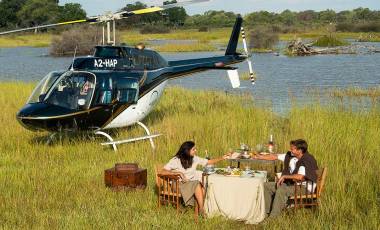
Top 9 Unique Luxury African Safaris for You
Here’s our list of the top 10 wildest and most unusual African vacation ideas across eastern and southern Africa.
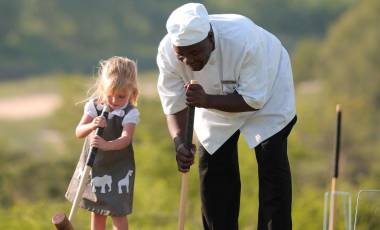
Young Children On Safari: Wild Child in Africa
Traveling with young children on safari? Here are tips for traveling in Africa and where you can take your little ones for their first Africa safari.
What Our Guests Say

The Enchanting Difference
Authentic & unique.
Our award-winning, licensed local guides provide incredible insights and exclusive experiences for you.
Personalized & Private
Our experts completely customize your private tour to match your interests and preferences.
High-Quality Experiences
All our accommodations and services are personally tested by our team.
Fully Supported Travel
You’ll have a personal and dedicated trip coordinator, backed by 24/7 support in case of emergencies while you’re traveling.
Financial Protection & Flexibility
Your booking is flexible and completely secure with us.
Safe & Secure
Your safety and well-being are our top priorities.
Do you have a vacation in mind? Personalize your itinerary with our Trip Builder.
Wanderlust Movement | A South Africa Travel Blog
Travel to Rwanda: 15 Useful Things to Know Before You Go
October 27, 2017 by Lauren Melnick
Last Updated on March 30, 2024 by Lauren Melnick

Most people travel to Rwanda to trek with the endangered mountain gorillas. Yet, many others hold off on this once in a lifetime adventure because they buy into the idea that Rwanda, like much of Africa, is unsafe.
Yes, the country isn’t as developed to European standards, and yes, it’s neighbours tend to be a bit batshit crazy, but that’s all part of Rwanda’s charm. Its imperfections make it one of the top destinations in Africa, and at the moment it’s also one of the cheapest.
But travelling to Rwanda doesn’t need to be difficult. With tourism growing each year, the infrastructure is improving, and it’s becoming easier than ever before to explore the Land of a Thousand Hills.
Here are 15 things to know about Rwanda before you leave home!
Table of Contents
How to Get Your 30-Day Visa on Arrival for Rwanda
Is it safe to visit rwanda, don’t drink the tap water, rwanda travel vaccinations, hostels in rwanda, what currency is used in rwanda, is rwanda expensive, internet access in rwanda, how much does a gorilla permit cost in rwanda, when is the best time to travel to rwanda to go gorilla trekking, what to wear for gorilla trekking in rwanda, travelling to rwanda as a vegan, cooking class tours, jumia food – the uber eats of rwanda, tipping guides in rwanda, the best time to visit rwanda, how to travel to rwanda, how to get around rwanda, read up on rwanda’s history.
If you’re like me and you hate visa paperwork, you’ll love Rwanda. All African nationals are either visa-exempt or get their visa on arrival. South African’s fall into the later, and you’ll be happy to know the whole process is quicker than a queue at Home Affairs.
To get your visa, you’ll need two things: your passport and $30.
If you haven’t exchanged money before your trip, don’t worry. Rwandan immigration accepts Visa and MasterCard payments.
Once you’ve paid for your visa, you’ll go to a second queue where you’ll have a quick chat with an immigration official.
And then you’re done!
If you’re travelling to Rwanda from a country outside of Africa, here’s a handy map to see the visa requirements for different countries.
Yes! It is safe to visit Rwanda. In fact, Rwanda is the safest country in Africa and the 9th safest in the worl d.
You can stop worrying Mom.
You’re more likely to get shot in America than not survive a trip to Rwanda.
I felt completely at ease here. While people did stare at me, it was more my blue hair colour then leering. I also didn’t witness or experience any catcalling.
Plus, it is nowhere near as homophobic as its neighbours. Should we add the most progressive East African country to the list as well?
If you do encounter any problems, there is a policeman or someone from the army on every block – for real. While they might look intimidating, Rwandans are some of the friendliest people you will meet and will be more than happy to help.
It’s also a good idea to get a travel insurance policy , especially if you’re planning a trip to Rwanda on going gorilla trekking. The terrain can be quite difficult to climb (depending on the time of year), and if you do fall, you’ll want to be covered for my hospital visits or broken gear.
World Nomads provides travel insurance for travelers in over 100 countries. As an affiliate, we receive a fee when you get a quote from World Nomads using this link. We do not represent World Nomads. This is information only and not a recommendation to buy travel insurance.
The tap water is not safe to drink in Rwanda. Luckily, most hotels and hostels will have a free water dispenser that you can use. Before you travel to Rwanda, pack a reusable water bottle in your bag and fill up as you explore.
If you need to buy water, it’s inexpensive and available at any of the shops and supermarkets around the country.
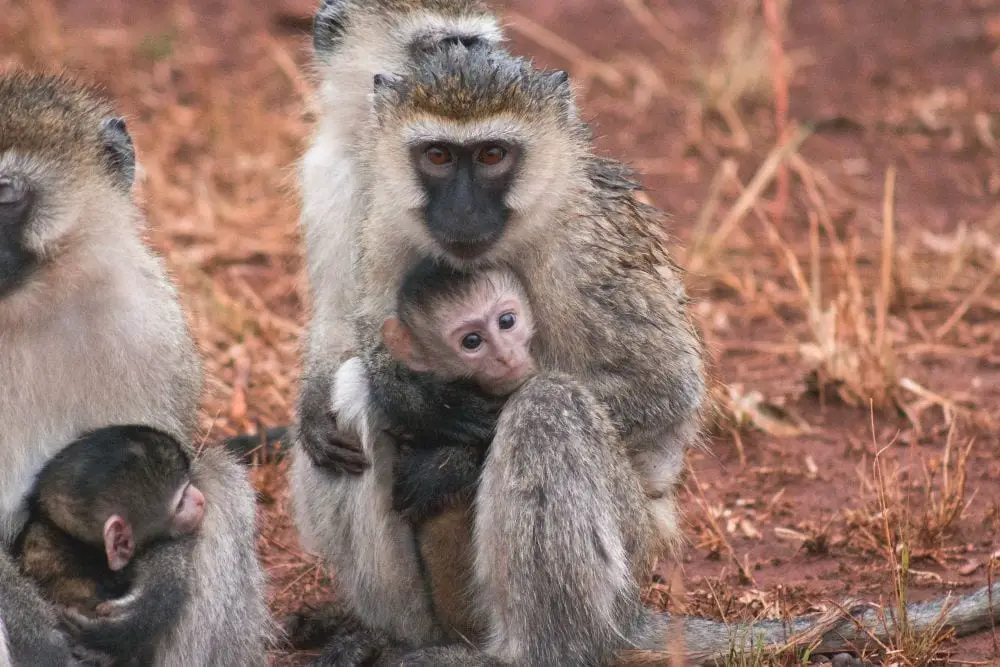
You can travel to Rwanda without a Yellow Fever vaccination .
YAS QUEEN!
This means that there are no Rwanda travel vaccinations that you NEED to have. Of course, there are the recommended ones, but you won’t be denied entry into the country.
But if you’re flying in from or to any of the neighbouring countries like Kenya or Uganda, you will need proof that you’ve had the vaccination.
Update: Although none of the resources I encountered (and no one asked to see any Yellow Fever vaccination before any of my flights) some people in the comment section are saying otherwise.
According to the link above, the CDC does not recommend a yellow fever vaccination for most travellers to Rwanda and Rwanda only requires proof of a Yellow Fever vaccination if you’re travelling from an at-risk country.
However, if you want to check all your bases, feel free to get the vaccination. It lasts for 10 years, and you won’t have to worry.
A quick search on Booking.com will only show a measly nine hostels in Rwanda.
But this doesn’t mean those are your only options.
A lot of the places don’t advertise on online booking sites. I recommend making a reservation for your first night and then exploring your options once in the country.
The hostel scene is small in Rwanda, but it’s growing. If you pay a little bit extra, you can usually get a whole 6-bed dorm to yourself. This is because most backpackers stick to the cheaper 12-bed dorms and the hostels are rarely full to capacity.
The official currency in Rwanda is the Rwandan Franc.
However, the US dollar is widely accepted. You’ll only need RWF to pay for smaller purchases, local transportation and food. Everywhere else will accept both currencies.
Yes and no.
Visiting Rwanda can quickly become expensive depending on your itinerary.
The national parks, like Akagera, have a steep $40+ entrance fee for foreign nationals, and the gorilla trekking permits cost well over a $1,000.
But you can still enjoy Rwanda as a cheap destination.
The local food in Kigali is affordable if you stay away from international restaurants. When it comes to transport, there are cheap motorbike taxis and long-distance minibuses that will take you to most of the towns around the country for a couple of dollars.
I didn’t have a problem getting online while in Rwanda. While it wasn’t the fastest connection, I wasn’ staring at my screen begging it to load.
If you aren’t planning on getting a local sim card for data, you might struggle to find a connection while exploring. Most of the restaurants I went to didn’t have WiFi except the cafe at the Genocide Memorial.
But then again I was eating at super cheap places.
Download a map of the area and join the cheapskate club if you don’t want to hunt WiFi down.
How to Get a Permit for Gorilla Trekking and Other Hikes
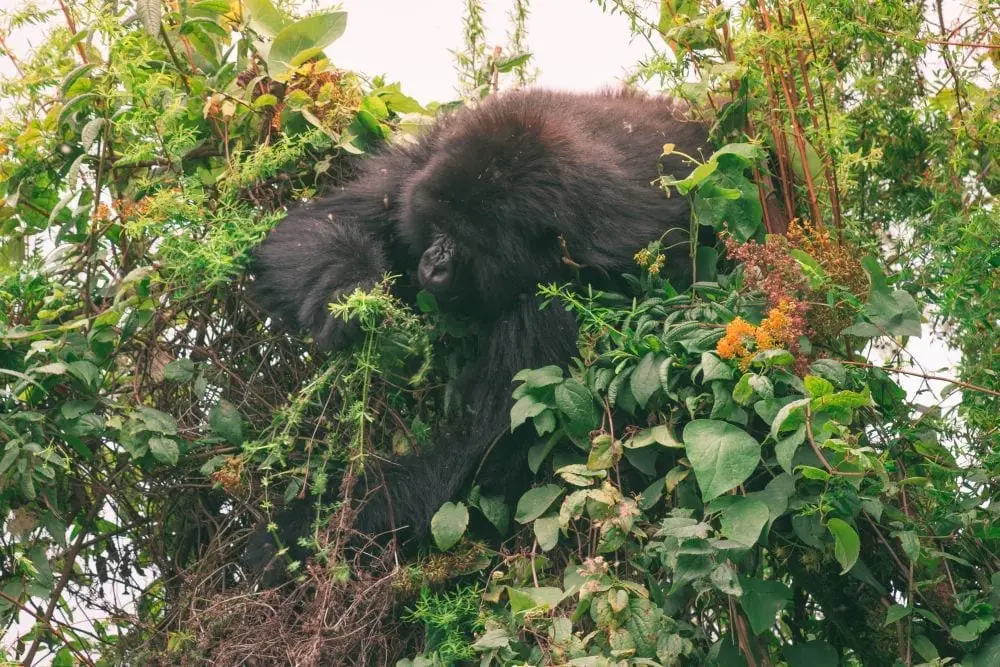
One of the best things to do in Rwanda is to go gorilla trekking. But you can’t just go on a hike and hope to see these majestic creatures.
You need a permit.
The permits for Volcanoes National Parks hikes and gorilla trekking can be bought either at the Tourism Headquarters in Kigali or the offices outside the national park .
Prices for the permits vary as well as their availability. For example, Rwanda tourism restricts the number of people that can see the gorillas each day, whereas the Dian Fossey Hike isn’t capped.
I recommend emailing the tourism headquarters to find out what availability is like before you go.
Another important thing to remember is that the dates of the permit cannot be changed. If you can’t go on that day anymore, you’ll need to purchase a whole new permit.
The Rwanda gorilla trekking permit costs $1500 per person. It’s a super steep price and the most expensive out of the three countries (Uganda and Congo) that offer the experience.
The reason the price is so high is that it keeps the trekking exclusive. The gorillas are vulnerable to human diseases and it would be irresponsible to have hundreds of people seeing the gorillas each day.
It would ruin their habitat and change their behaviour.
Plus, your money goes towards their conservation and curbs poaching as the gorillas are now more valuable alive than dead.
The best time to go gorilla trekking in Rwanda is during the dry season. Not only will the terrain be easier to navigate, but you won’t have to worry about the rain ruining your chances of seeing the gorillas.
I did the Dian Fossey trek at the beginning of the rainy season, and all the non-avid hikers found it difficult. There was lots of mud, steep inclines and swampy parts where almost everyone lost a shoe.
- Shoes: A good pair of hiking shoes with a high ankle and good grip.
- Hiking gaiters: If you don’t have your own you can rent a pair for RWF 10,000 (R 160.00) from your guide.
- Clothes: Wear long pants and a long-sleeved shirt in neutral colours. This will protect you from the stinging nettles and help you blend in.
- Other essentials: A rain jacket for the sporadic showers, and a small backpack that can hold your water, camera and lunch.
Food in Rwanda
The local food is delicious. While I couldn’t taste the majority of the dishes as it’s quite meat-heavy, I enjoyed everything that I did get my hands on.
In the capital city of Kigali, I found it pretty easy to get hold of vegan food. While there aren’t any vegan restaurants, all the places I went to had a vegetarian option that could easily be modified into a cruelty-free meal.
A typical Rwandan breakfast includes a platter of fresh fruit so you shouldn’t have any problems munching down.
If you want to learn how to make some of Rwanda’s most famous local dishes, go to a cooking class.
The Nyamirambo Women’s Center offers one for only RWF 15,000 (R 250.00). Not only will you be helping vulnerable women in the community make a living, but you’ll get an authentic look into the preparation and creation of traditional meals.
Plus, they have vegetarian options that can be made vegan on request.
In case you don’t know, I’m an odd creature of comfort. I have no problem falling asleep just about anywhere, and once I’ve found a spot I like, I’m in it for the long haul.
So, as much as I love sampling the local food, I don’t love the whole actually going to a restaurant. Sometimes I just want the food and me to have a moment without all the stress that comes along with going out.
In steps Jumia Food. It’s Kigali’s answer to Uber Eats, and it’s fantastic. The app has a wide range of cuisines and price ranges to choose from that will be delivered straight to your hostel door with a swipe of a finger.
I highly recommend the Ethiopian restaurants if you don’t mind the splurge. But if you want cheap and mouthwatering, order anything from Chap Chap.
Tipping in Rwanda
Tipping is not customary in Rwanda restaurants unless you’re dining at the higher-end establishments in Kigali.
If you’re doing a hike, you’ll need to tip the guide. How much seems to be a debatable issue and I’d recommend asking the hotel staff or the company organising your tour for some guidance.
Keep in mind that the guides, porters and trackers are most likely former poachers. Your business helps them to make a living ethically and see the value in keeping the gorillas alive.
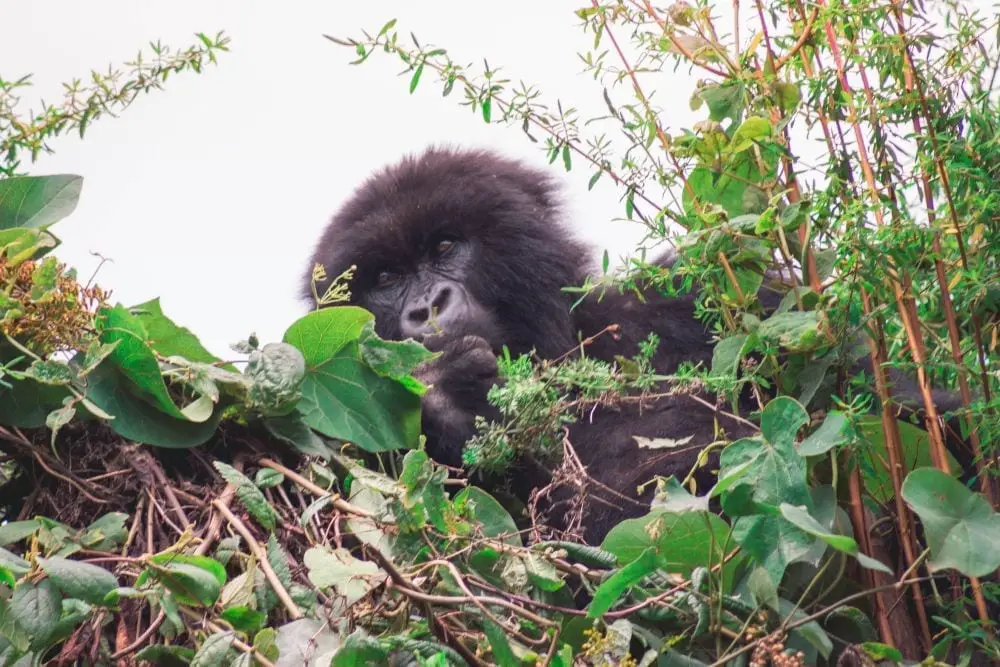
Plus, it’s also a great time of year to see Rwanda’s wildlife. The animals in Akagera National Park will be easier to spot as they make their way to the watering holes and hiking conditions will be at their easiest.
The only downside is that it’s peak tourist season during this time. Rates will be higher for flights, hotels and activities.
If you visit outside these months, it will be cheaper, but you’ll have to plan around the spots of bad weather.
The quickest way to get to Rwanda is to fly . I bought my return flights from South Africa to Kigali for under R 3000, but prices tend to hover around R4000.
If you’re already in East Africa, there are local buses that run between the different countries. Some of the most popular routes are from Kampala, Uganda to Kigali or Nairobi, Kenya to Kigali.
Read More: Travel to Kenya: 15 Useful Things To Know Before You Go
The easiest way to get around Rwanda is to hire your own car, but it’s expensive.
Luckily, the country does have a decent public transport system that makes it cheap and easy to travel in Rwanda without a car.
If you want to visit Akagera National Park , you’ll need to join a tour or use your own wheels. The same goes for Volcanoes National Park; no public transport runs to the entrance of the park.
However, if you’re just around the cities and towns, there is no reason to hire a car. There are dozens of moto-taxis waiting to take you around at reasonable rates. The best part is that the drivers don’t inflate their prices and you don’t need to waste time haggling.
But most drivers won’t know street names. It’s a good idea to have your final destination open on Google Maps to show the driver and to make sure you’re going in the right direction.

In 1994, Rwanda went through a dark period where around one million Tutsis were murdered in 100 days.
Only 25 years have passed, and it’s still a fresh wound in the country. One thing that stood out for me while in Kigali was the high number of young people as most parents were killed during this period.
Before you going to Rwanda, watch the movie Hotel Rwanda to understand the basics of what led up to this traumatic event.
And of course, a visit to the genocide memorials is a must to understand Rwanda’s history and how the genocide has affected the entire nation.
Do you have any Rwanda travel tips? Hit ya gurl up in the comments below!
Want more African travel inspiration? Check out my other posts:
- Everything You Need to Know About the Dian Fossey Hike
- Akagera National Park: The Complete Guide
- The Ultimate South Africa Bucket List: 40+ Amazing Places to Visit
- What It’s Like Staying on Mumbo Island in Malawi
- Visiting Kruger National Park: Everything You Need to Know
- The Perfect Self-Drive Botswana Itinerary for an Epic Safari Trip
Did you find this post useful? Save it for later on Pinterest!

About Lauren Melnick
Lauren Melnick is the founder of Wanderlust Movement, Wander to Here and is a South Africa travel blogger. She's been travelling the world as a full-time freelance writer since 2016 and has visited over 40 countries.
When she isn't typing up a storm, you can find her conquering overnight hikes around the Western Cape, rock climbing, and hosting sold out group travel trips around South Africa, Namibia and Morocco.
Reader Interactions
November 12, 2017 at 1:15 am
Having lived in Rwanda, I would agree with much of this post. However there are a few things I would say: First, the 1994 genocide in Rwanda killed at least 800,000 people in those 100 days. It was a brutal and tragic piece of Rwandan history and so it’s understandable how, even 20 years later, they are dealing with the aftermath. Some people are willing to talk about this history but many do not want to divulge much information. And the memorial services and events are all held in April, so I’d recommend planning a trip that avoids these events (they are highly emotional, sometimes dangerous, and can be traumatizing for some who do not understand the history). Second, if you pay for anything with US dollars, make sure the bills you have are dated 2008 or higher and are crisp and new. Rwandans often get less in currency exchanges for bills that are not up to par. Third, the local language is fairly easy to learn. Within a few weeks I could speak Kinyarwanda conversationally. However it is also a perk to know French. Rwanda is in the process of switching it’s primary language system to Anglophone from Francophone so many of the younger Rwandans speak some English and many of the older Rwandans speak more French. However, everyone speaks Kinyarwanda! And Finally, if you plan to take Moto-taxis, be aware that they are quite unsafe. Motos are much cheaper and more fun to get around on, however taxi-busses and cars are a safer option and not unreasonable priced. Generally, however, Rwanda is an extremely safe country. Use common sense and general precaution, as you would in any new place, and you will likely be just fine!
November 13, 2017 at 8:29 am
Thanks so much for your comment Jess and all the useful info!
I also found the local language quite simple to learn and would love to go back next year for a month and really get more usage out of it. And my terrible French did help me out a few times as well ^.^
March 18, 2018 at 9:52 am
I love this. what kind of jobs are best for foreigners to Rwanda? Am a mechanical engineer in the domain of fluid [domestic and industrial plumbing] mechanics, fabrication, maintenance of industrial systems
March 18, 2018 at 10:36 am
You would probably have to contact someone who helps people immigrate to the country,
March 29, 2018 at 5:48 pm
I am planning a trip in November and Yellow Fever is required. I checked with the Board of Tourism. Actually I spoke with them.
March 31, 2018 at 10:32 am
Hey, thanks really weird. When I went there in September last year, no one asked to see if I had a yellow fever certificate on the South African or Rwanda side. And all the information I found last year said they had been removed as a at-risk country and it was no longer a requirement for arriving or departing travellers :/
June 6, 2018 at 9:47 pm
It seems that the requirement still exists but is not enforced very strictly. You should have it taken care of just in case they ask.
June 10, 2018 at 12:18 am
The CDC resource I consulted said that Rwanda only requires proof of Yellow Fever vaccination if you’re travelling from an at-risk country. So the information seems a bit conflicting for some reason. Of course, it’s safer to get the vaccination anyway, but it is weird that legit resources have varying information about such an important disease.
September 19, 2018 at 3:19 pm
i am travelling to Kigali on Tuesday 25th Sept and l have phoned the Rwanda high Comm and they did confirm that there is no need for the yellow fever vaccine if one is coming from a non-yellow-fever country or has never been to a yellow fever country within the past 25 days!
September 26, 2018 at 11:09 am
Ah Forbes! Thanks so much for taking the time to comment this. I really appreciate it 🙂 I hope you have an amazing time travelling to Rwanda!
June 18, 2018 at 2:14 pm
I wasn’t aware that they did away with the yellow fever vaccination till now, thank you.
June 18, 2018 at 6:52 pm
Hey Anita! I’ll double check before you go on your trip because people have been getting conflicting pieces of information.
November 10, 2018 at 12:13 pm
Very useful information. I’m going to Rwanda in the beginning of December. I arrive on Saturday evening late and want to spend Sunday to see Kigali and organize my permits and sort out my public transport to see Nyungwe Forrest National Park and go go to Valcanoes National Park to do some hikes. Is it possible to it on a Sunday or do I need to arrange a lot of stuff beforehand?
Thanks a lot!
November 12, 2018 at 4:12 pm
Hey, if the permit office is open on a Sunday, you should be able to organise your permits 🙂 It’s a very quick process, so it won’t take up a lot of your time.
January 23, 2019 at 9:57 pm
Very insightful blog. Really appreciate
January 24, 2019 at 10:35 am
Happy to hear you’ve found it useful!
February 21, 2019 at 6:21 pm
hey, I was born and I stay in Rwanda. I liked the post and I agree with the most of its information but what I wanted to correct is that it is 20,000 of Tutsi who were murdered during Genocide but over 1 million of Tutsi were murdered and it is been 25 years now. but apart from that Rwanda is the safest Country in Africa in my opinion and hospitality is a common trait in Rwandan people.
February 27, 2019 at 9:59 pm
Thanks so much! I have corrected the info 🙂
June 13, 2019 at 4:50 pm
Great post! So many useful information! 😀 I’m going to Rwanda in August, skipping the gorilla tracking (too expensive 🙁 ), but can’t wait to see other attractions!
June 24, 2019 at 2:48 pm
I hope you have an incredible time!!
July 7, 2019 at 6:22 am
Thanks for the information, I will be visiting in early October, how difficult is the trek? Is it something I should be worried about?
July 9, 2019 at 3:03 pm
Hey Debrah! I’ve you hike regularly / you’re a fit person you should be good. It will be a difficult hike if you’re not really active as it’s a lot of uphill and the mud means you’re going to work extra hard.
March 4, 2020 at 12:57 pm
Thanks for the tips and info….
February 23, 2021 at 3:45 am
Just wondering if you could update this post for current events.
February 24, 2021 at 6:50 pm
You mean for the pandarama ?
June 4, 2022 at 1:52 am
My husband and I will be with a tour group and visiting Rwanda soon, in July 2022. Your blog was so helpful; thank you! I am wondering how muddy trekking will be in July and if I need gaiters; and if so, do I need ankle length or knee length?
June 20, 2022 at 6:05 pm
I’m not sure what it’s like in July as I went in September. Maybe speak to the tour company and see what the guides recommend? my gaiters were knee-length 🙂
July 24, 2022 at 2:15 pm
Thanks for the posts; they are very informative; I am travelling to Rwanda for business on 26th July for two weeks, Im coming from Cairo, and I hope to see some of the unique places. I have to transit through Ethiopia, anyway, it’s going to be an exciting trip,
August 13, 2022 at 1:21 pm
Thank you for the tips and info. I am planning to visit Kigali in Sept/Oct for 6 days and am struggling to find a itinerary without gorilla tracking (as I am not keen on it). Is there enough to do in Rwanda over 6 days or should I consider adding another country?
August 21, 2022 at 1:53 pm
Hey Busi, it really depends what you like to fill your itinerary with. I spent a week in Rwanda and there was more than enough to keep me busy.
Leave a Reply Cancel reply
Your email address will not be published. Required fields are marked *
This site uses Akismet to reduce spam. Learn how your comment data is processed .
Love The Content?


Search Smartraveller

Latest update
Exercise normal safety precautions in Rwanda.
Higher levels apply in some areas.
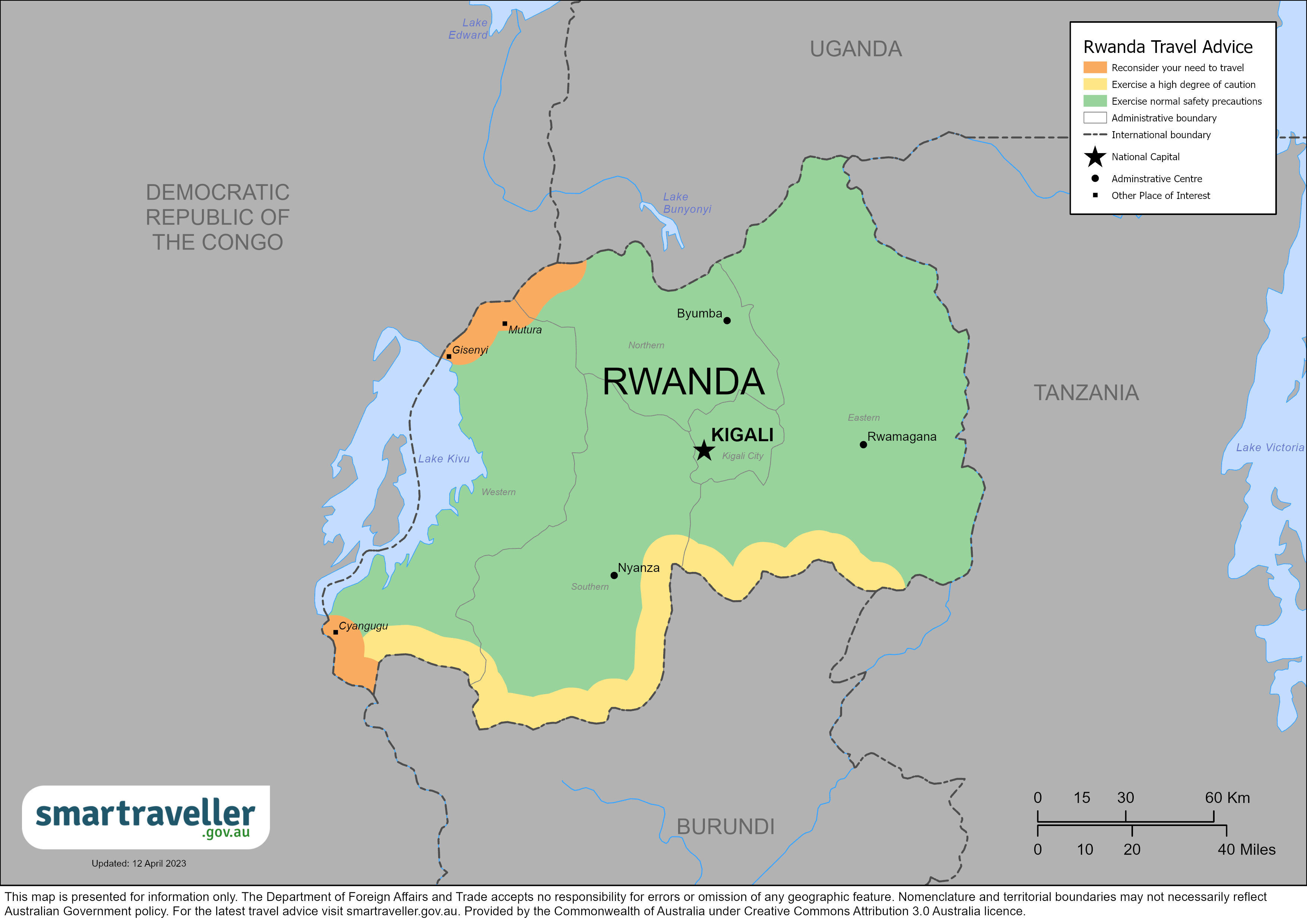
Rwanda (PDF 702.68 KB)
Africa (PDF 1.68 MB)
Local emergency contacts
Fire and rescue services, medical emergencies.
Call 112 or go to the hospital.
Call 112 or go to the local police station.
Be aware that 112 emergency calls may not be answered.
Advice levels
Exercise normal safety precaution s in Rwanda overall.
Exercise normal safety precaution s in Rwanda overall.
Reconsider your need to travel within 10 kilometres of the border with the Democratic Republic of the Congo, including the town of Gisenyi.
Reconsider your need to travel within 10 kilometres of the border with the Democratic Republic of the Congo, including the towns of Gisenyi due to:
- the unsafe security situation
- the ongoing risk of cross-border attacks by armed militias
Exercise a high degree of caution within 10 kilometres of the border with Burundi.
Exercise a high degree of caution within 10 kilometres of the border with Burundi due to:
- the unsafe security environment
- the high risk of conflict between government forces and rebels
- the risk of cross-border violence
See Safety
- The security situation within 10km of Rwanda's border with the Democratic Republic of the Congo (DRC) is volatile. Don't cross the border (see Full Advice/Travel section ).
- The land border between Rwanda and Burundi has been closed since 11 January. The border will remain closed until further notice.
- There's a risk of rebel attack in the Volcanoes National Park (Parc National des Volcans) and Nyungwe Forest. Only visit these parks as part of an organised tour group.
- Grenade attacks and other incidents have occurred in the past, including in Kigali. Targets may include genocide memorials, markets and transport hubs.
- Petty crime is quite rare, but theft from hotel rooms, homes and vehicles can occur. Keep valuables out of sight. When driving, lock your windows and doors.
- The rainy seasons are from February to May and September to December. Flooding and mudslides can make roads unusable. Be prepared to alter your travel plans.
Full travel advice: Safety
- Medical facilities are very limited. If you're ill or injured, you may need medical evacuation to Kenya. Check your travel insurance covers this.
- Malaria occurs across the country, including in Kigali. Consider taking anti-malaria medication. Other insect-borne diseases also occur. Ensure your accommodation is insect-proof. Use insect repellent.
- HIV/AIDS occurs. Take precautions if you're taking part in high-risk activities.
- Foodborne, waterborne and other infectious diseases include meningitis, meningococcal disease, tuberculosis and rabies. Drink only boiled or bottled water. Avoid raw or undercooked food.
Full travel advice: Health
- Don't use or carry illegal drugs. Penalties include long prison sentences and heavy fines.
- Same-sex relations are legal. However, LGBTI travellers may be harassed by the public and police. Avoid public displays of affection.
- Be careful when taking photos. It's illegal to photograph government buildings.
- Plastic bags are banned. Officials may fine you for having them.
Full travel advice: Local laws
- Australians can get a free 30-day tourist visa on arrival. Entry and exit conditions can change at short notice. You should contact the nearest high commission/embassy or consulate of Rwanda for the latest details.
- The land border between Rwanda and Burundi has been closed since 11 January 2024. The border will remain closed until further notice. We advise you exercise a high degree of caution within 10 kilometres of the border with Burundi.
- The security situation within 10km of Rwanda's border with the Democratic Republic of Congo (DRC) is unstable, and conflict can occur with little notice. There have been cross-border incursions in recent years, and the situation in eastern DRC has become more volatile in 2024 (see the DRC travel advice ) .
- Don't cross the border. Reconsider your need to travel within 10 kilometres of the border with the DRC, including the town of Gisenyi.
Full travel advice: Travel
Local contacts
- The Consular Services Charter details what the Australian Government can and can't do to help you overseas.
- Australia doesn't have an embassy or consulate in Rwanda.
- The Office of the Canadian High Commission to Rwanda in Kigali provides limited consular help to Australians in Rwanda. The Office doesn't issue passports.
- Full consular help is available from the Australian High Commission in Kenya .
- To stay up to date with local information, follow the High Commission’s social media accounts.
Full travel advice: Local contacts
Full advice
Civil unrest and political tension, violence and crime.
Grenade attacks and other violence have occurred in the past, including in Kigali. People have been killed and injured in these attacks.
Targets for attacks have included:
- genocide memorial sites
- taxi and bus stops
To protect yourself from attacks:
- be alert to any security threats, especially around common targets
- monitor the media and other sources for possible threats
- follow the advice of local authorities
To protect yourself against other crime, avoid walking or travelling after dark. Stay alert during daylight hours.
Demonstrations and protests
Avoid protests, rallies and demonstrations. Public protests and events that draw large groups of people can turn violent.
More information:
- Demonstrations and civil unrest
Border areas
We advise reconsider your need to travel within 10km of the border with the Democratic Republic of the Congo (DRC) as:
- the security situation can change at any time in this region
- there's an ongoing risk of cross-border attacks by armed militias from the Kivu provinces in the DRC
Don't cross the border into the DRC. We advise do not travel to the DRC. If, despite our advice, you travel to the DRC, review the travel advice for the DRC .
The land border between Rwanda and Burundi has been closed since 11 January 2024. The border will remain closed until further notice. We advise exercise a high degree of caution within 10km of the border with Burundi as:
- the security environment can change rapidly
- there's a risk of conflict between government forces and rebels in Burundi
- there's a chance of cross-border violence by armed groups, including bandits
Monitor local media and other sources for news that may affect your safety.
Volcanoes National Park and Nyungwe Forest
If you're planning to visit the Volcanoes National Park (Parc National des Volcans), book with a reputable travel agent. Only visit the park as part of an organised tour group.
You need permission from the Rwanda Office of Tourism and National Parks (ORTPN) before visiting the park or Nyungwe Forest.
The ORTPN may provide a military escort because of the risk of rebel attack.
Petty crime targeting foreigners doesn't happen often. Crimes include:
- bag snatching
- pickpocketing
Theft from hotel rooms and vehicles also occurs.
When driving, keep your valuables out of sight. Close the windows and lock the doors.
Kidnapping can happen anywhere, anytime, including in destinations that are typically at lower risk. The Australian Government's longstanding policy is that it doesn't make payments or concessions to kidnappers.
Cyber security
You may be at risk of cyber-based threats during overseas travel to any country. Digital identity theft is a growing concern. Your devices and personal data can be compromised, especially if you’re connecting to Wi-Fi, using or connecting to shared or public computers, or to Bluetooth.
Social media can also be risky in destinations where there are social or political tensions, or laws that may seem unreasonable by Australian standards. Travellers have been arrested for things they have said on social media. Don't comment on local or political events on your social media.
More information:
Cyber security when travelling overseas
Terrorism is a threat worldwide.
Climate and natural disasters
Severe weather.
Rwanda experiences natural disasters and severe weather , including:
- floods and mudslides
- earthquakes and volcanoes
If there's a natural disaster:
- always carry your passport in a waterproof bag
- keep in touch with family and friends
- check the media and other local sources for information
Flooding and mudslides
The rainy seasons are from:
- February to May
- September to December
Flooding and mudslides occur throughout Rwanda at these times.
Heavy rain may affect infrastructure and disrupt essential services. This can restrict travel if roads close.
Earthquakes and volcanoes
North-western Rwanda is in an active earthquake zone. Earthquakes and volcanoes are a threat.
Ask your host or hotel about what to do if there's an earthquake.
After an earthquake:
- expect aftershocks
- prepare for travel delays and to change your plans
- ask your travel agent and tour operators to confirm travel services and accommodation bookings
- Global Disaster Alert and Coordination System
Travel insurance
Get comprehensive travel insurance before you leave.
Your policy needs to cover all overseas medical costs, including medical evacuation. The Australian Government won't pay for these costs.
If you can't afford travel insurance, you can't afford to travel. This applies to everyone, no matter how healthy and fit you are.
If you're not insured, you may have to pay many thousands of dollars up-front for medical care.
- what activities and care your policy covers
- that your insurance covers you for the whole time you'll be away
Physical and mental health
Consider your physical and mental health before you travel, especially if you have an existing medical condition.
See your doctor or travel clinic to:
- have a basic health check-up
- ask if your travel plans may affect your health
- plan any vaccinations you need
Do this at least 8 weeks before you leave.
If you have immediate concerns for your welfare, or the welfare of someone you know, call the 24-hour Consular Emergency Centre on +61 2 6261 3305 or contact your nearest Australian Embassy, High Commission or Consulate to discuss counselling hotlines and services available in your location.
- General health advice
- Healthy holiday tips (Healthdirect Australia)
Medications
If you plan to bring medication, check if it's legal in Rwanda. Take enough legal medicine for your trip.
Carry a copy of your prescription or a letter from your doctor stating:
- what the medication is
- your required dosage
- that it's for personal use
Health risks
The Rwandan Ministry of Health has established measures for travellers arriving from areas of the DRC that are affected by Ebola virus disease.
If you are arriving in Rwanda from an Ebola affected area, you're required to undergo thermal scanner screening.
If you're transiting through DRC, the Rwandan Ministry of Health can impose a 21-day quarantine period before you travel.
More information:
- Rwandan Ministry of Health
Insect-borne diseases
Malaria occurs widely throughout the country, including in Kigali.
Other insect-borne diseases also occur, such as dengue , chikungunya , African tick-bite fever .
To protect yourself from disease:
- ensure your accommodation is mosquito-proof
- use insect repellent
- wear long, loose, light-coloured clothing
Consider taking medication to prevent malaria.
Protect yourself from HIV/AIDS infection if engaging in activities that expose you to risk.
If you're a victim of violent crime, including rape , get medical help as soon as possible.
Other health risks
Waterborne, foodborne and other infectious diseases are common. These include:
- meningitis / meningococcal disease
- tuberculosis
Serious outbreaks sometimes occur.
To protect yourself from illness:
- drink boiled water or bottled water with sealed lids
- avoid ice cubes
- avoid uncooked and undercooked food, such as salads
- avoid contact with dogs and other mammals
If you're bitten or scratched by an animal, get medical help straight away.
Don't swim in fresh water to avoid exposure to waterborne diseases, such as bilharzia (schistosomiasis) .
Get medical advice if you have a fever or diarrhoea.
- Infectious diseases
Medical care
Medical facilities.
Medical facilities are very limited throughout the country.
If you're in an accident or get sick, you may need to be evacuated by air ambulance to Nairobi, Kenya. You may need to travel further if your condition is serious. Medical evacuation can be very expensive
You're subject to all local laws and penalties, including those that may appear harsh by Australian standards. Research local laws before travelling.
If you're arrested or jailed, the Australian Government will do what it can to help you under our Consular Services Charter . But we can't get you out of trouble or out of jail.
Follow local laws in Rwanda's parks and tourism sites.
To visit parks:
- you must purchase a park permit from Rwanda’s Office of Tourism and National Parks
- you must be accompanied by an official guide. Rwanda Tour and Travel Association (RTTA) tour companies are available through Member List | RTTA
- only use established trails
Penalties for drug-related crimes are severe. They include long prison sentences and heavy fines.
- Carrying or using drugs
The public or police may harass LGBTI travellers for same-sex sexual activity, or public displays of affection.
Plastic bags are banned. Authorities may confiscate them when you arrive at the airport and in public places. They may also fine you.
It's illegal to take photos of government buildings.
A permit issued by the Rwanda Civil Aviation Authority is required to fly a drone recreationally or commercially in Rwanda.
- Advice for LGBTI travellers
- Drones (Visit Rwanda)
Australian laws
Some Australian criminal laws apply overseas. If you commit these offences, you may be prosecuted in Australia.
- Staying within the law and respecting customs
Dual citizenship
Rwanda recognises dual nationality.
- Dual nationals
Visas and border measures
Every country or territory decides who can enter or leave through its borders. For specific information about the evidence you'll need to enter a foreign destination, check with the nearest embassy, consulate or immigration department of the destination you're entering.
Tourist visa
Citizens of Commonwealth countries receive free 30-day tourist visas on arrival.
Entry and exit conditions can change at short notice. Contact the High Commission of Rwanda in Singapore or the Consulate General of the Republic of Rwanda in Australia for details about visas, currency, customs and quarantine rules.
Working or Volunteering in Rwanda
You need a valid permit to work or volunteer in Rwanda. The permit is available through the Rwanda Directorate General of Immigration and Emigration.
More information:
- Permits (Rwanda Directorate General of Immigration and Emigration)
Other formalities
Yellow fever vaccination.
You'll need a valid yellow fever vaccination certificate if you're arriving from a country with a risk of yellow fever.
- Countries with a risk of yellow fever
Some countries won't let you enter unless your passport is valid for 6 months after you plan to leave that country. This can apply even if you’re just transiting or stopping over.
Some foreign governments and airlines apply the rule inconsistently. Travellers can receive conflicting advice from different sources.
You can end up stranded if your passport is not valid for more than 6 months.
The Australian Government does not set these rules. Check your passport's expiry date before you travel. If you're not sure it'll be valid for long enough, consider getting a new passport .
Lost or stolen passport
Your passport is a valuable document. It's attractive to people who may try to use your identity to commit crimes.
Some people may try to trick you into giving them your passport. Always keep it in a safe place.
If your passport is lost or stolen, tell the Australian Government as soon as possible:
- In Australia, contact the Australian Passport Information Service .
- If you're overseas, contact the nearest Australian embassy or consulate .
Australian emergency passports are only accepted with pre-approval from the Rwandan immigration department .
Passport with 'X' gender identifier:
Although Australian passports comply with international standards for sex and gender, we can’t guarantee that a passport showing 'X' in the sex field will be accepted for entry or transit by another country. Contact the nearest embassy, high commission or consulate of your destination before you arrive at the border to confirm if authorities will accept passports with 'X' gender markers.
More information:
LGBTI travellers
Access to money
Rwanda is a cash-based society but presently electronic payments and online banking should be used wherever possible.
Only large hotels accept credit cards. Find out which credit cards your hotel accepts before you travel.
You can only cash traveller's cheques at commercial banks.
Not many ATMs accept international cards.
Most shops and businesses won't accept or change US dollars dated before 2006.
Local travel
Road travel.
You're more likely to die in a motor vehicle accident in Rwanda than in Australia.
To drive in Rwanda you'll require both your Australian driver's licence and an International Driver's Permit.
Main roads between Kigali and other major towns are generally good.
You'll likely need a 4WD to use unsealed secondary roads, particularly during the rainy season.
Avoid driving at night.
Police roadblocks are common throughout the country. They may stop you. Police may search your vehicle and luggage.
Road safety risks include:
- poorly lit roads
- poorly maintained vehicles
- speeding drivers
- roaming animals
- Driving or riding
Motorcycles
Traffic in Rwanda can be chaotic and unpredictable. Riding on motorcycles is risky for travellers. Always wear a helmet and sensible clothing. Never ride or drive while under the influence of alcohol or drugs.
If you plan to ride a motorcycle:
- check your travel insurance policy covers motorcycle rides
- use a well-known hire company with a good reputation
- always wear a helmet.
More Information
- Road safety
Use only licensed taxis with an orange-stripe.
Confirm the fare before you leave.
Avoid minivans (shared taxis) and motorbikes, especially at night. They're risky due to reckless driving, poor maintenance and petty crime.
DFAT doesn't provide information on the safety of individual commercial airlines or flight paths.
Check Rwanda's air safety profile with the Aviation Safety Network.
Rwandan airports have extensive airports security checks. You should allow sufficient time to get through security.
Emergencies
Depending on what you need, contact your:
- family and friends
- travel agent
- insurance provider
Always get a police report when you report a crime.
Your insurer should have a 24-hour emergency number.
Consular contacts
Read the Consular Services Charter for what the Australian Government can and can't do to help you overseas.
Australia doesn't have an embassy or consulate in Rwanda. The Office of the Canadian High Commission to Rwanda in Kigali provides limited consular help to Australians in Rwanda. The Office doesn't issue passports.
Canadian High Commission to Rwanda
59, KN16 Ave, Kiyovu, Kigali, Rwanda Postal Address: P.O. Box 1177, Kigali, Rwanda Telephone: (+250) 252 554 800 Fax: (+250) 252 554 810 Email: [email protected]
Opening Hours: Monday to Friday: 8am – 12pm
Full consular help is available from the Australian High Commission in Kenya.
Australian High Commission, Kenya
Limuru Road, Rosslyn Nairobi, Kenya PO Box 3008 - 00621 Phone: +254 20 4277 100 Website: https://kenya.highcommission.gov.au/ Email: [email protected] Facebook: Australian High Commission, Kenya X: @AusHCKenya
Check the High Commission website for details about opening hours and any temporary closures.
24-hour Consular Emergency Centre
In a consular emergency, if you can't contact an embassy, call the 24-hour Consular Emergency Centre on:
- +61 2 6261 3305 from overseas
- 1300 555 135 in Australia

Travelling to Rwanda?
Sign up to get the latest travel advice updates..
Be the first to know official government advice when travelling.
- Work With Me

- Sierra Leone
- South Africa
- United States
- New Zealand
- Falkland Islands
- Netherlands
- Accommodation
- Electrical Gear
- Essential Gear
- Working Abroad
- Blogging Resources
Africa , RWANDA
Ultimate 1 week rwanda packing list.
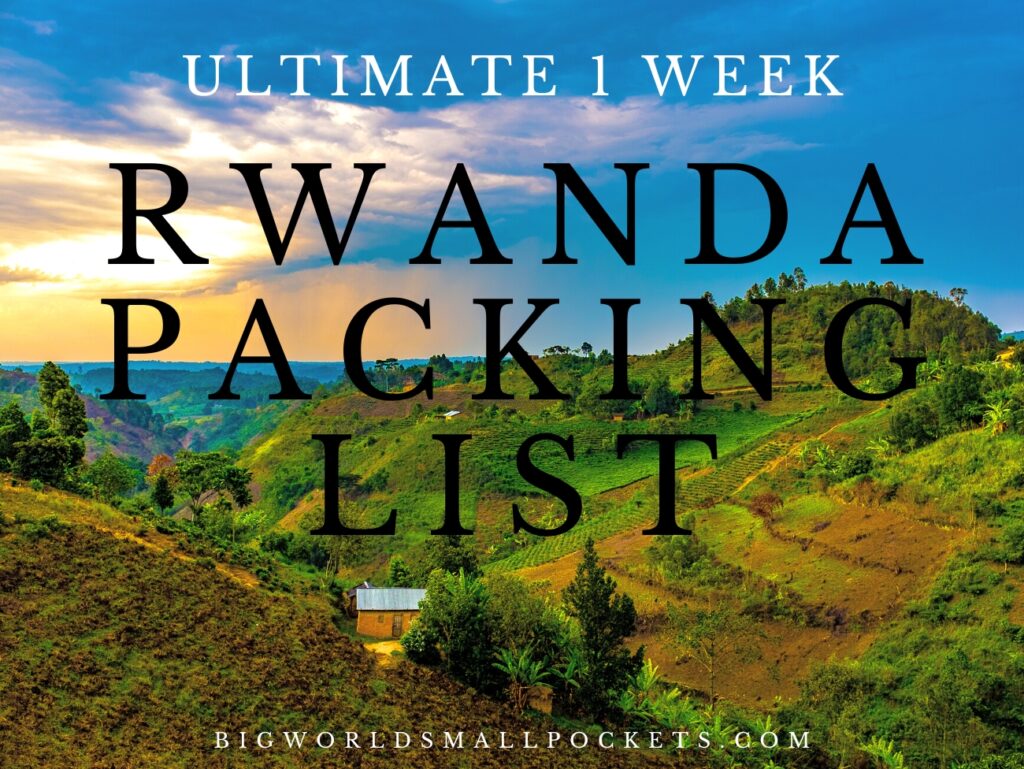
Heading to Rwanda and want to know what to pack and wear in the country?
Then you’ve come to the right place!
An often overlooked country in East Africa – in favour of its more famous neighbours Kenya and Tanzania – Rwanda nevertheless has a huge amount to offer visitors.
I mean for starters, it’s one of the only countries in the world to have families of gorillas living within its borders!
And if that wasn’t enough to convince you, then Rwanda is also home to a significant chimpanzee population, some incredible national parks and beautiful lakes too.
The country’s difficult history, in particular in its horrific genocide in the nineties, also feeds into its unique story and makes it a truly memorable and poignant place to visit.
So if you’re heading off to Rwanda, here’s my ultimate packing list, to help you prep everything you need for a fab time in this country.
Oh and if you want some great tour options for Rwanda, including to see the gorillas, check out this list…
Related Posts
- 15 Safest Countries to Travel in Africa
- Top 7 Things to Do in Rwanda
- The Perfect East Africa Itinerary
This page contains affiliate links meaning Big World Small Pockets may receive a small commission on any purchases at no extra cost to you.
Grab Your Copy of How to Travel Africa for Less
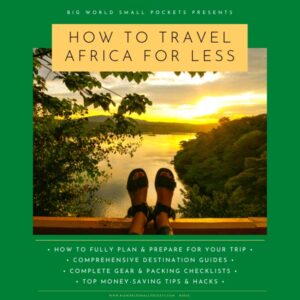
- Full Planning & Preparation Guides
- Detailed Destination Info
- Complete Packing & Gear Lists
- Top Money-Saving Tips & Hacks
Click Here to Check It Out!
How to pack light for rwanda.
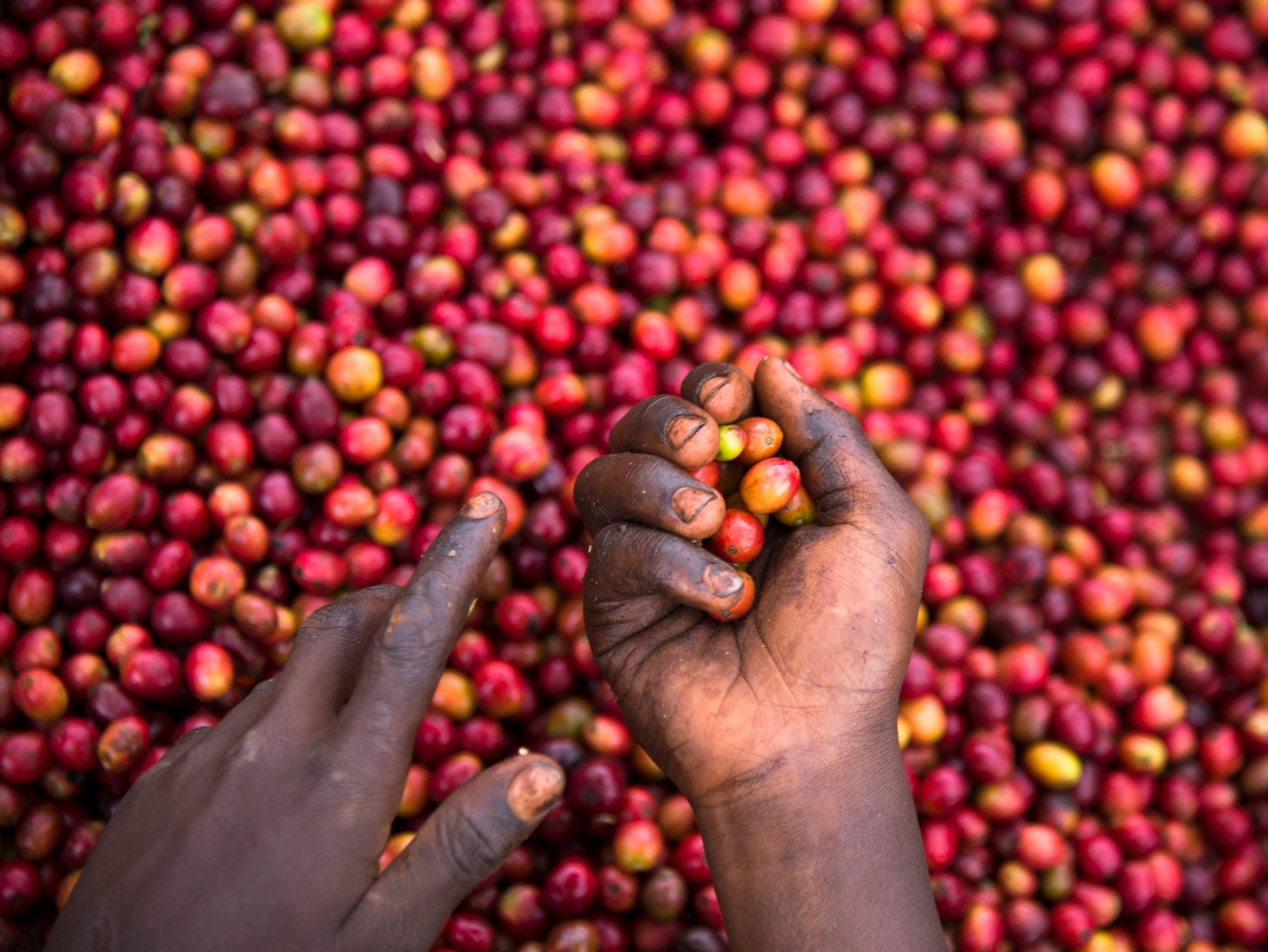
Before I get into the actual checklist of what you should pack for your trip to Rwanda, I wanted to write a quick few tips to cover some specific questions you might have.
First up, this packing list is designed to be lightweight i.e. it’s ideal for backpackers, but also for anyone else heading to this country who doesn’t want to haul a massive suitcase around.
If you’re moving around Rwanda, which you definitely should, then lugging big bags on and off safari vehicles or local buses is simply no fun, so this packing list is designed to make sure you have everything you need for every inch of this country, without being too weighed down!
And if you manage to condense your stuff down well, then this whole Rwanda packing list below should fit into a 40-50l backpack.
I never take anything bigger, even when I’m travelling for 6 months at a time, so you’ve got no excuse!
This 50l Atmos backpack from Osprey makes a great option and would be brilliantly accompanied by some good packing cubes!
Yes these guys are the answer to all your packing problems my friends, and if you want to compress your gear to take up less space, as well as have it nicely organised, I highly suggest you get some!
I absolutely love these packing cubes and personally would never consider heading off to East Africa, or indeed anywhere, without them.
What to Wear on a Rwandan Safari?
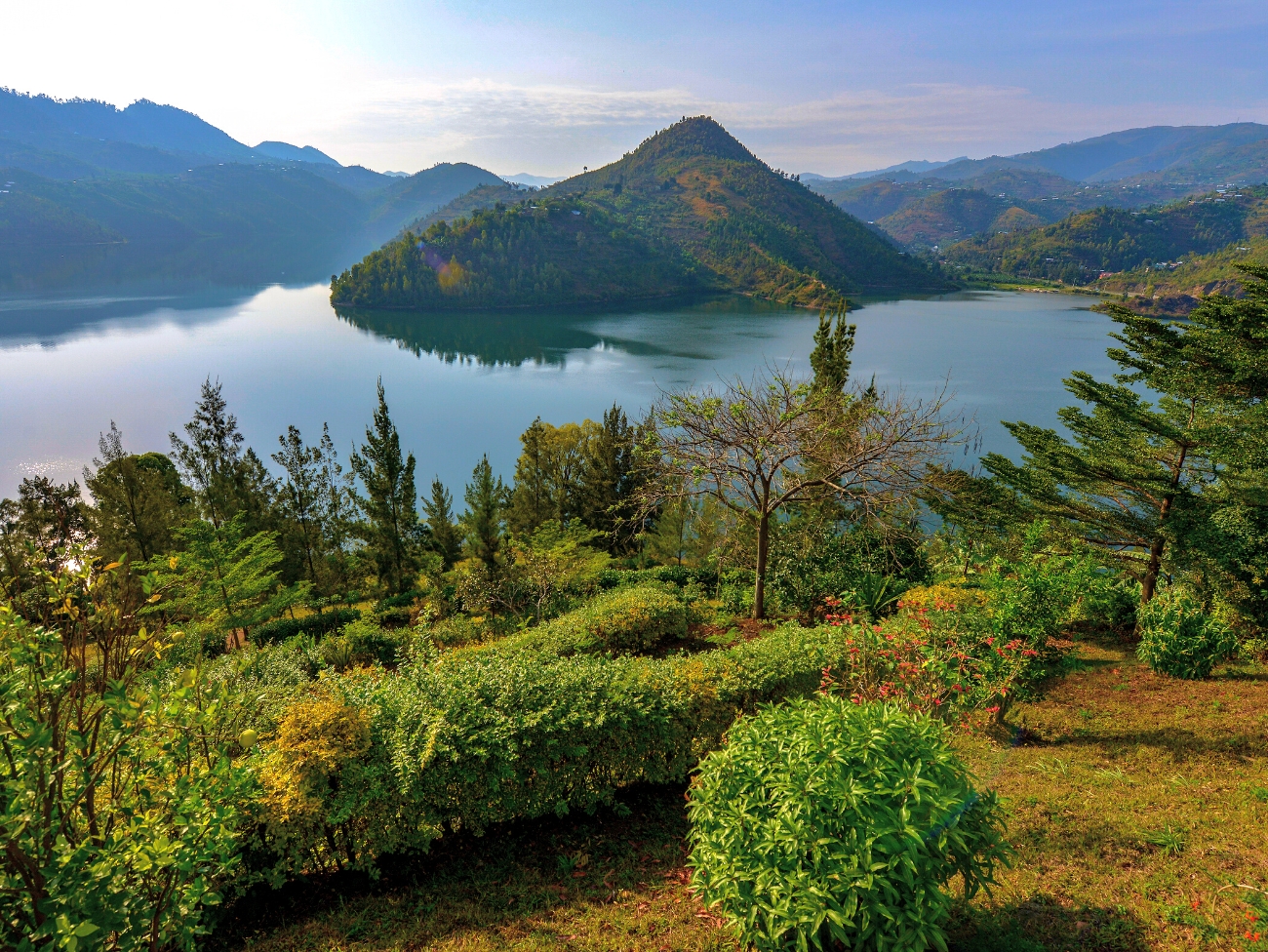
So while we’re on the subject of keeping the luggage weight down, it’s worth pointing out that the main checklist below does detail everything you need if you plan to safari in Rwanda too, which I highly suggest you do!
The main overall advice here is to bring layers that are thin, but that still protect you from the humidity, harsh UV rays and insects you’ll encounter here.
A thin, light waterproof / windproof jacket will be very handy when enjoying a safari at dawn or dusk and, as always, I recommend garments with lots of pockets so you have easy access to things like tissues, camera, sanitiser, snacks etc.
Long trousers and long-sleeved tops are advised, as well long socks and covered-toe shoes. And don’t forget a good hat to protect your head from the sun too.
A silk sleeping bag liner and headlamp will also be useful, especially if you plan to enjoy any multi-day excursions on a budget, many of which involve camping.
And no matter whether you’re tackling a big adventure safari in a remote park, or just a day activity close to Kigali, an active camera like the Go Pro will be ideal with its waterproof, compact and durable attributes.
What to Wear For Gorilla Trekking?
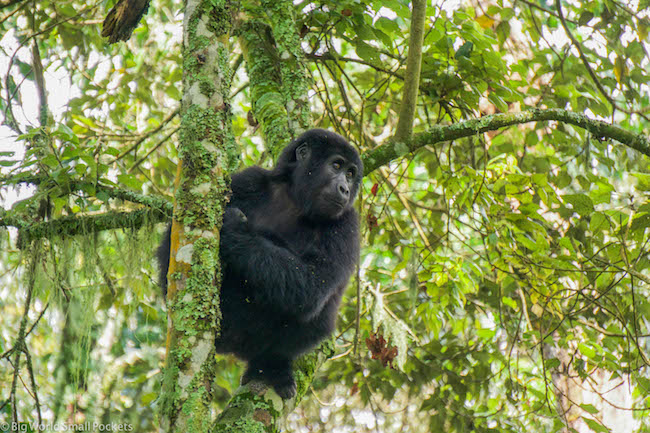
The first thing to know is that gorilla trekking is a muddy affair, so you’ll definitely need ankle boots that are waterproof and have enough grip to support you in wet and rough terrain.
Long trousers and long-sleeved tops are also a good idea to avoid scratches from the vegetation and to protect you from insects, including fire ants.
Long hiking socks that you can tuck your trousers into are also a good plan, as are gardening gloves to protect your hands.
A thin waterproof will be needed in case of sudden downpours, and a day pack to house your binoculars and camera, as well as water, is also a must.
Learn more in this ultimate guide I wrote to gorilla trekking .
What to Wear on a Flight to Rwanda?
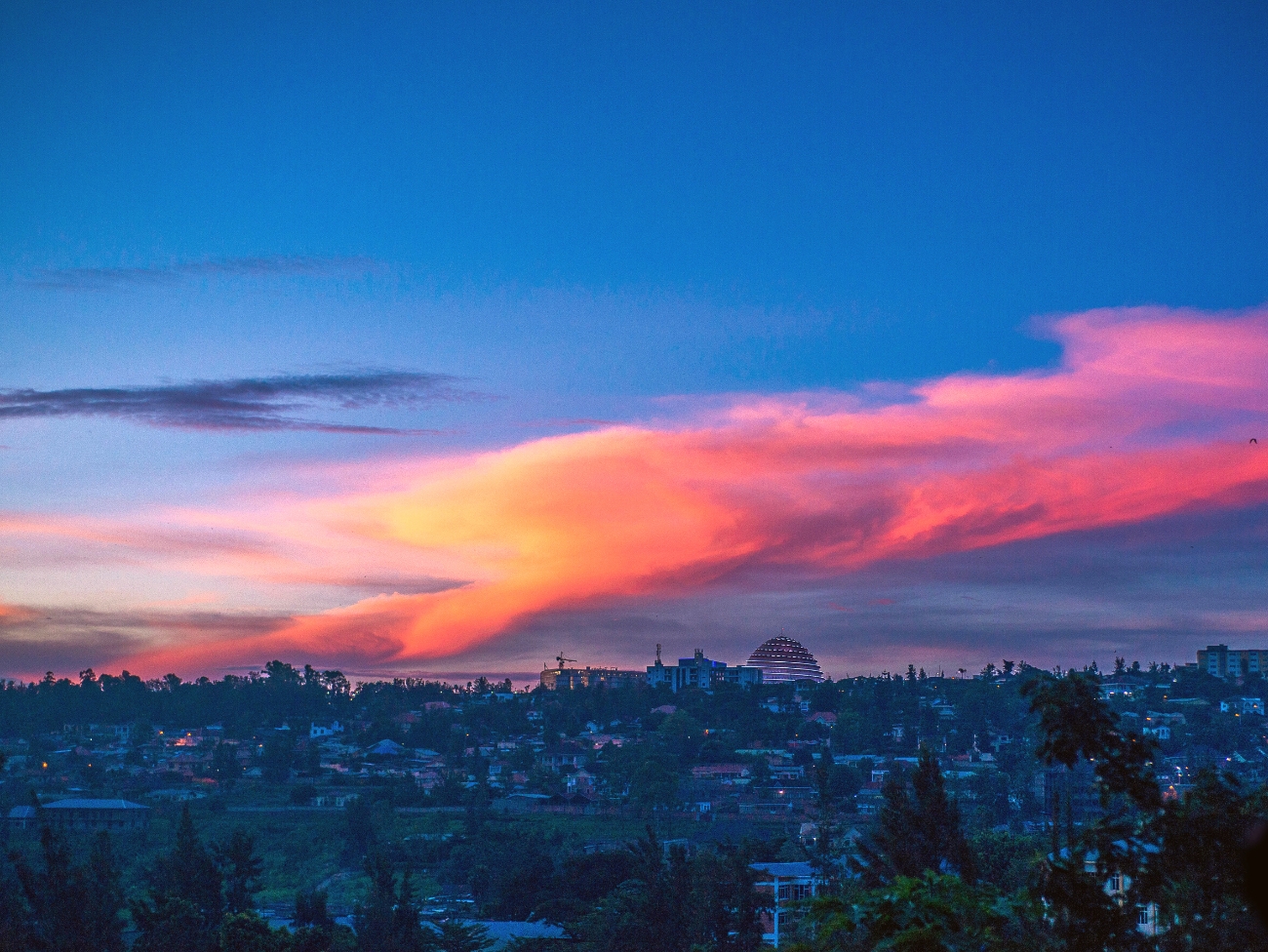
It’s also worth taking some time to think about what to wear on a flight over to Rwanda.
Making sure these items tie in as much as possible with the checklist below will help you keep your packing light, as you won’t be doubling up or carrying any unnecessary pieces you won’t wear again until the flight home.
Quite simply, layers are key.
You never know how hot or cold a plane might be and if you want to get some sleep, comfy clothing is king.
This is especially true given flights to Rwanda from Europe, Australia, New Zealand or North America are usually long haul (around 7hours+), so I’d certainly advise wearing things you feel at ease in.
Ladies, I always wear leggings on long-haul flights and love these natural bamboo fibre ones from Boody , which I now never travel without!
I generally pair them with either a thin cotton top or dress (depending how much coverage you want), and then also take a sweater and a scarf on the plane for extra cosy layers.
The travel wraps from Sholdit , which have hidden security pockets, are perfect for travel adventures and I love mine!
A travel pillow will also help you here and I love this one , which I just bought and I’m already in love with thanks to its memory foam, high-sided design.
Alternatively, if leggings aren’t your thing, then loose-fitting jeans or comfy cargo pants might be a good option, with a t-shirt and thin sweater on top.
What Electricals to Bring?
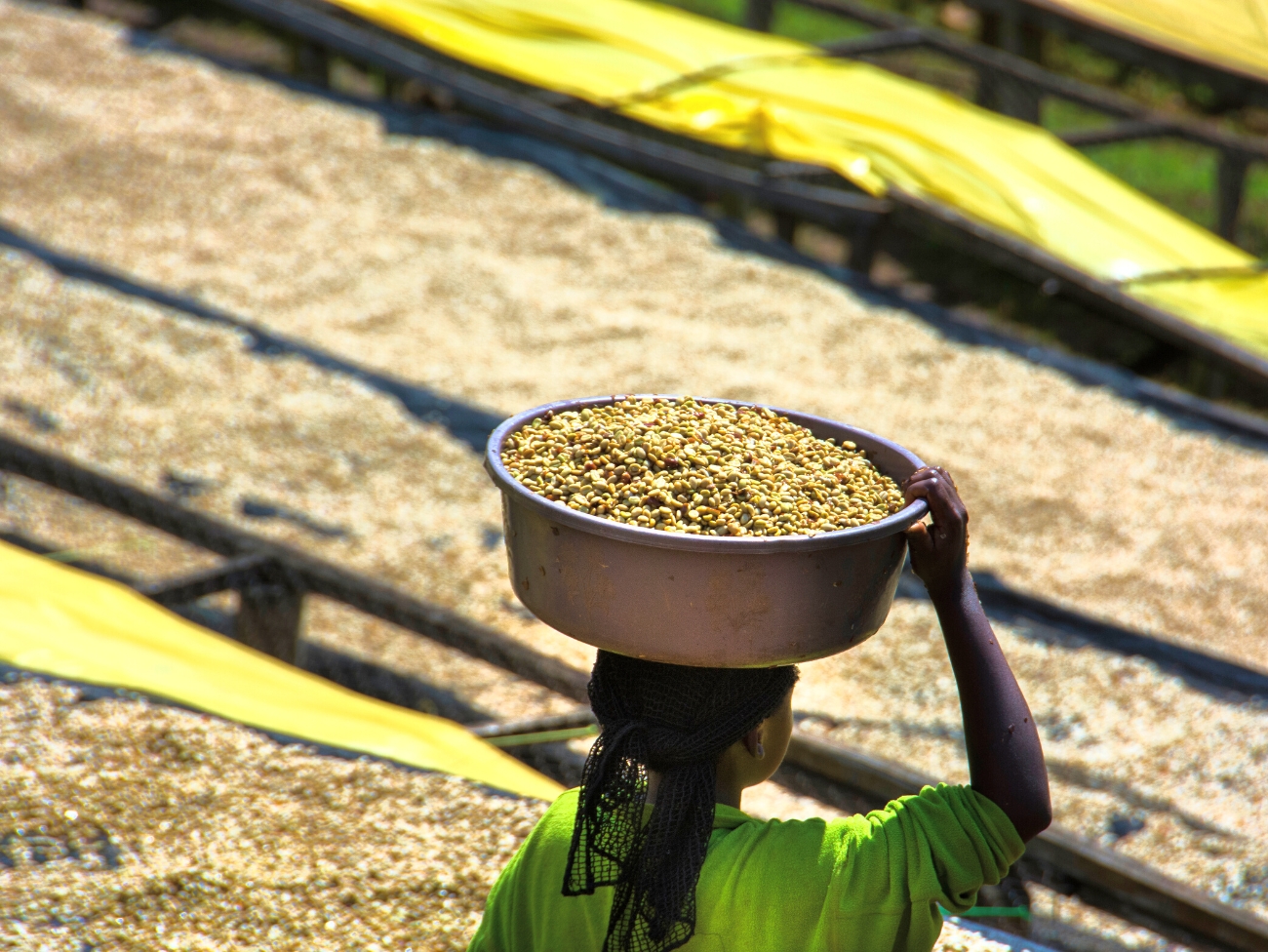
Taking a smartphone with you anywhere these days is a must and I highly suggest you accompany this with some good quality Bluetooth headphones.
In addition, you may want to bring a DSLR, or better, mirrorless camera with you to collect some great wildlife snaps. Don’t forget a power zoom lens!
Learn more about my pick for the top safari cameras here .
I also highly recommend investing in a power pack for your trip to Rwanda, so that you can charge your phone, camera, iPad or headphones when you’re out and about (or when there’s a power cut).
My go-to brand here is Anker and I actually have 2 of their portable chargers – one that comes out with me during the day and the other that is charging wherever I’m staying, so it’s ready to swap over.
For my big camera, I also have a spare battery, so that I can swap batteries around and keep snapping happily away all day.
And finally, don’t forget a headlamp – also key for when there’s a power cut!
Just enter your details below and I'll email it you - simple!
Information will be sent to the email provided above
1 Week Rwanda Packing List: Item Checklist
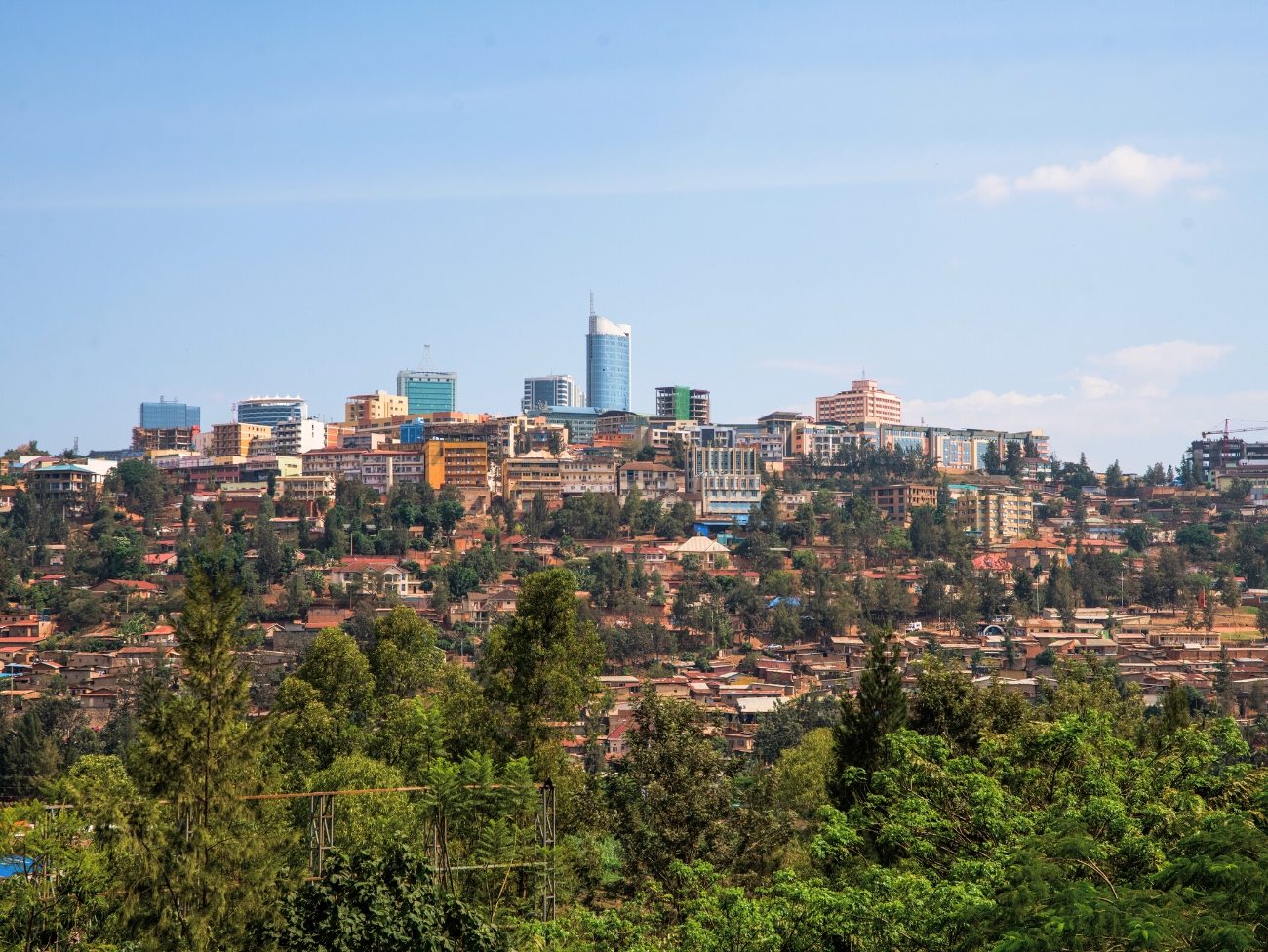
And so finally here it is, my item by item checklist for exactly what to pack and wear in Rwanda…
1x Thin Waterproof / Windproof Jacket
Set in the tropics, Rwanda can be wet and humid (even when it’s warm), which means thin layers are crucial when it comes to staying dry without overheating.
Taking a thinner jacket that you can layer on or off when being active also makes a lot of sense.
I love the North Face Venture 2 .
2x Thick Hoodie / Sweater
Uganda rarely gets cold, but after a rainstorm, if you’re up for a dawn hike or safari, you might want to feel a bit snug.
As such, a couple of thicker jumpers are nice to take with you – I suggest wearing one on the plane anyway.
A good activewear one, like this Columbia fleece is well suited to the job, as it is designed for outdoor travel and perfect for safari and camping adventures.
2x Thin Long-Sleeved Tops
Also good for cooler days or when taking safari trips at dawn, dusk or night, thin long-sleeved tops are also good when you need to layer up, as they can be worn under thicker jumpers.
Choosing natural fibre options, like cotton, is a good choice for budget vs comfort.
It will also reduce the amount you sweat.
Thin tops also make for an excellent hiking base layer if you do want to head to see the gorillas or chimps.
7x Singlets / T-Shirts
Choose tops that match the trousers / leggings / shorts you pack and consider quick-dry options.
T-shirts are good for covering shoulders and offering sun protection in the tropical climate of this country.
2x Long Pants / Trousers
Great for going out in the evening or wandering around towns when it’s raining, a pair of versatile trousers are a must when it comes to what to pack for any travels in East African countries like Rwanda.
I think 2 is enough, if you ensure it will cover a wide range of activities from strolling to going out in the evening to nature time.
Rwanda is quite conservative in certain areas and all locals tend to wear longer items of clothing that at least stretch to the knee.
As such, you may feel more comfortable doing the same – especially in cities or towns.
Just make sure any trousers you bring are thin, as this country is rarely cold!
2x Leggings / Hiking Pants
One of my travel essentials, leggings are so helpful for putting on under trousers if cold, for hiking or exercising, for being comfortable, for extra nightwear or for under a casual dress in the evening.
My advice is always to take 2 pairs and make them bamboo fibre ones if possible, as these guys are soft, light, comfortable, breathable, quick-dry and hypoallergenic… what’s not to love?!
If you don’t like leggings, hiking trousers or loose-fitting pants will do fine instead, as they are also good for travel days or if you plan to undertake any volunteer work.
You’re going to need something to wear during those warm lakeside days in Rwanda, especially if you’re in the country for a while!
1x Light Dress
Again, a good item for down days.
Or if you want to dress up a bit during the evening, you can wear this over a pair of leggings.
You see, so versatile!
8x Underwear
Small and compact, 8 pairs will save you a lot of handwashing!
2x Bras + 2x Sports Bra
Great for those bumpy safari rides, I really love this black, supportive sports bra from Nike .
Make sure you take socks of various lengths / thickness, including ankle socks for city days and good, non-blister over the ankle socks for hiking and nature activities like gorilla trekking.
I always recommend a couple of sarongs whenever I travel because they are so versatile.
Great for hiking, lying by the water, using as a thin sheet at night or trying to keep your neck protected from the sun, the list of uses for the humble sarong goes on and on!
Check out my article about all the ways you can use a sarong when you travel here .
Cap / Sun Hat
Having something to shield your face, neck and ears from the strong UV rays that are very prevalent in Rwanda is a must, especially when you might be exposed to them for long periods of time if you’re hitting some national parks / hiking / volunteering / on safari etc.
Many accommodation options in Rwanda have swimming pools, so it pays to come prepared.
Make sure your sunglasses are UV-protected and consider prescription ones if you wear glasses usually.
You can always double up on your daywear here to save room!
Otherwise, thin and light cotton shorts and a top will do the job for nightwear.
Hiking Boots
If you’re heading off to see the gorillas, then hiking boots are a must on your Rwanda packing list.
Boots might also come in handy for safari activities.
Check out this post I wrote to learn more about choosing the best footwear depending on what type of safari activities you want to enjoy.
Trainers / Runners
Good sturdy sneakers for exploring cities and towns on foot are crucial in Rwanda.
These New Balance black cross-trainers are great all-rounders and won’t show up a lot of dirt.
Flip Flops / Sandals
Personally I’d never travel anywhere without my Arizona Birkenstocks and neither should you!
The support they provide is awesome and that’s definitely something you’ll need for the uneven terrain and streets in Rwanda!
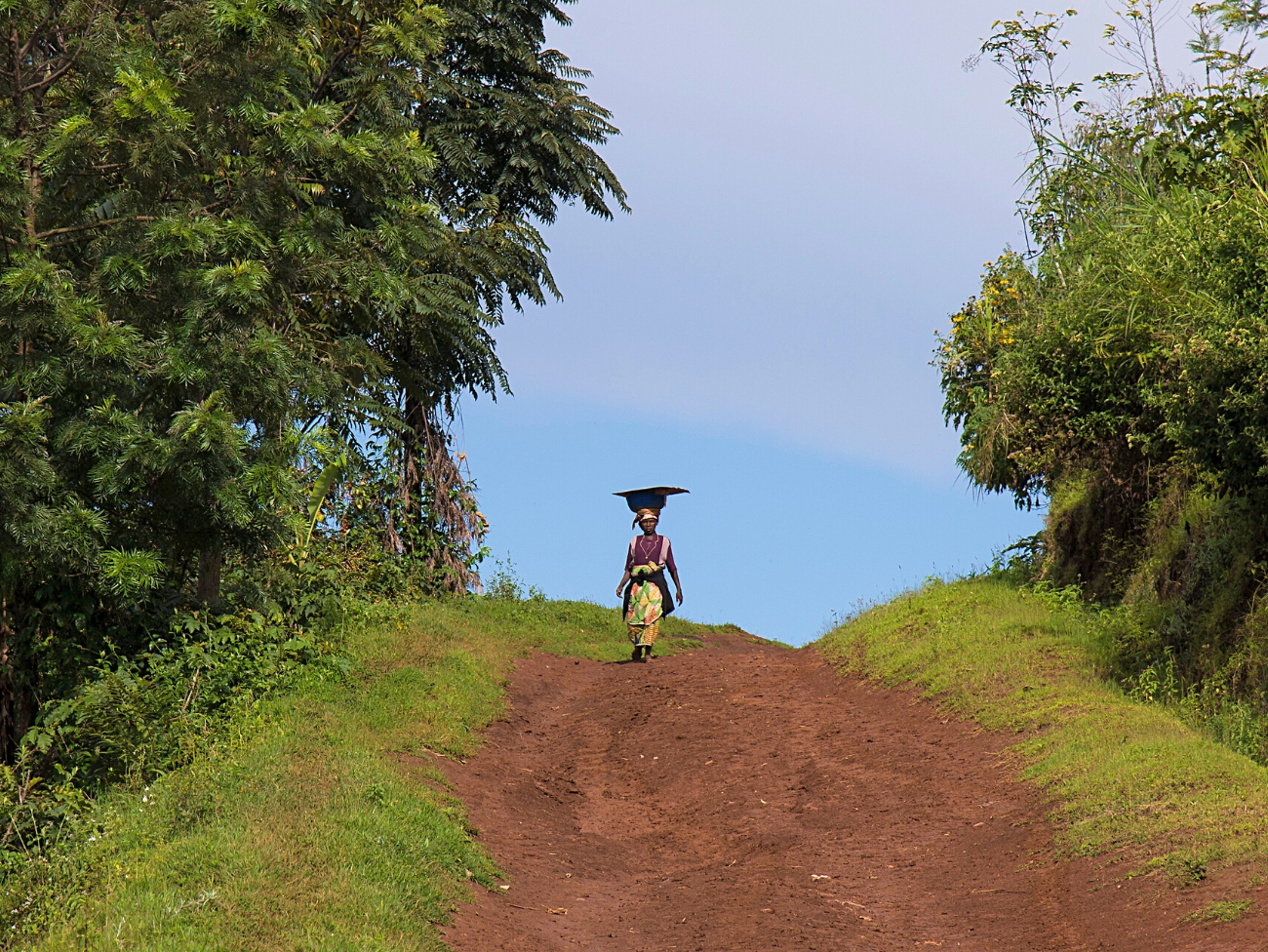
Toiletries / Medical
Thin Toiletries Bag with Hook
A light, thin wash bag is essential for keeping the weight in your backpack / luggage down.
And one with a hook makes it easy to hang up in small bathrooms or when out in nature.
This one is a great, cheap option for your Rwanda packing list.
Shampoo & Conditioner Bars
I always go for shampoo and conditioner bars when I travel to save the plastic and keep the space down.
Although they are a bit pricey, they last for ages.
Say goodbye to mid-travel spillages and bulky bottles people, this is the eco-friendly future!
Anti-Bacterial Soap
Keep your soap in ziplock bag to stop soap slime ooozing onto everything you own!
I suggest an anti-bacterial bar as they are great for keeping you clean in tropical climates where you’re likely to be sweating a bit!
I always pack a natural crystal deodorant as they last forever (great if you’re travelling for a few months) and are free from many nasty chemicals.
They are also the only thing that stops me sweating in the tropical heat… lovely!
Face Cleanser, Serum, Toner & Moisturiser
Great for bringing your skin back to life after days in the strong sun.
SPF Sunscreen & Lip Salve
Choose a 30 SPF or higher for those super strong rays in Rwanda and go natural if you can, to keep the chemicals out of your skin.
Very important for those strong UV conditions, a good SPF will keep your lips healthy and happy.
Insect Repellent
I recommend a strong product for your Rwanda packing list to keep yourself protected against malaria and dengue fever.
Medical professionals advise at least a 40% DEET product.
This doubles as a great moisturiser, soother and aftersun – much needed in East Africa.
Buy organic Aloe Vera here .
Tea-Tree Essential Oil
A powerful antiseptic, antimould and antifungal treatment, tea-tree essential oil is also great to throw with your clothes washing (just a few drops) and ideal for freshening up smelly bags / laundry etc.
Get an organic tea-tree oil if you can.
An ideal remedy for headaches, sore muscles and insect bites, tiger balm is super versatile and a must on any Rwanda packing list, especially if the mosquitoes love you as much as me!
Paracetamol, Antiseptic Cream, Rehydration Salts, Imodium, Anti-Inflammatories, Anti-Histamines & Band-Aids
First-aid essentials!
Menstrual Cup
The best way to deal with your time of the month when travelling ladies.
Saves the planet from more waste too.
Check out the best prices for them here .
Toothbrush, Toothpaste, Floss
Razor & Spare Blades
Nail Scissors, Nail File & Tweezers
Cotton Buds / Pads
Hair Bands & Hair Brush
Safety Pins
Glasses / Contact Lenses if you wear them
Anti-Malarial Medication
Electricals
Smartphone & Bluetooth Headphones
Taking your smartphone to stay in touch with those at home, check maps, book accommodation and upload some pics while you’re in Rwanda is a great idea.
You can easily buy a cheap SIM when you get to the country and it’s good to know that data packages and network coverage here are generally excellent and very affordable too.
I’d also download some audiobooks and music onto your phone before you leave home – a great idea for journey days.
I recommend Amazon Audible and Spotify Premium for these purposes and wouldn’t travel without either these days.
Portable Charger
Portable phone chargers are great when travelling, especially if you’re out sightseeing and snapping all day and worried your phone or camera battery won’t last.
I recommend the Anker Powercore – it’s light, compact and charges devices super quickly.
I love my Sony A600 mirrorless camera , which I used throughout my travels in East Africa and beyond.
Compact and sturdy, it’s perfect for travelling.
A GoPro is also a great idea to help capture the more active adventures you might have in this country such as hiking, safari-ing or diving.
It’s also great for video!
Lens, Spare Battery, Memory Cards, Chargers & Cables
All essential for the camera and / or the GoPro.
Rwanda uses European style outlets, so get a Skross World Adapter that won’t fail you.
Headlamp & Spare Batteries
I never travel anywhere without a headlamp and recommend you choose a product that uses commonly found batteries and has a red night light function to avoid the bugs.
I love my Black Diamond number , which has served me very well across East Africa, especially during those occasional power cuts!
You can easily get an affordable pair like these Binoteck ones, which are ideal for safari.
Miscellaneous
Eye Mask & Earplugs
Key for sleeping in hostels and / or when camping on safari.
This eye mask from Alaska Bear is super comfy… go on treat yourself!
Travel Towel
I recommend Latrek when it comes to the best travel towel because they are cheap, compact, soft and don’t smell.
Love, love, love mine. Read my full review here .
Definitely needed for hiking, sightseeing and active safari days, this Kompressor from Marmot is perfect for the job as it’s super featherweight and packs down to nothing – an ideal item for your Rwanda packing list.
Combination Padlock
Very useful for locking up bags and valuables when staying in hostels or on bus rides, these don’t have to be expensive, just reliable!
Best to get a TSA-approved one in case of any hassle at the airport.
Filter Water Bottle
Try not to add to the world’s plastic problem and consider travelling with a filter water bottle like this one from LifeStraw .
Not only does this mean you can safely and easily drink the tap water in Rwanda, but it will also save you the money and hassle of having to continuously buy bottled water.
Much cheaper and more environmentally friendly, the LifeStraw Go Water Filter Bottles have an amazing technology solution that filters out 99.9% of harmful bacteria and the filter lasts for 4000 litres, which means you’ll likely only have to replace it once a year!
Travel Handwash & Washing Line
Great for doing emergency washing, such as underwear in a sink, travel handwash is always a must when I backpack anywhere.
So useful in Rwanda if you’re travelling during the rainy season!
These small and compact guys are great for keeping your electrical equipment safe and dry.
Check out this top-rated one for ideas.
Silk Sleeping Bag Liner
Personally, I wouldn’t bother with a full sleeping bag if you’re travelling in Rwanda, it’s just too hot to warrant it most of the year!
That said, a silk liner, which will keep you snug at night and actually stop you sweating, is the perfect alternative… plus it’s lighter and less bulky to carry too.
Check out this one to learn more.
Lots of people say you don’t need this item, but I find it very useful.
Choose a light, inexpensive one and make sure it has a bottle opener, corkscrew and knife – like this .
When you’re out in nature in Rwanda, a multi-tool can come in very helpful.
Mosquito Net
Great to have for those times when the one provided is less than adequate, or when you want to sleep under the stars but still not get bitten!
A travel mosquito net is a must on your Rwanda packing list.
Multiple packs of biodegradable ones… I’ve never used so many in my life as I did in East Africa!
Documents & Paperwork
Passport & Photocopies
Definitely take a colour copy of your passport and keep it on your person at all times.
Taking a photo of your passport and storing it safely on your smartphone / cloud storage is also a good idea.
Visa Documentation
Depending on the passport you carry, you may or may not need this for Rwanda.
Most European, Aussie, Kiwi and North American passport holders get a visa on entry via a stamp obtained at both land and air border points.
Immunisation Documentation
Always good to have with you wherever you travel, it’s a smart idea to check whether you need your Yellow Fever jab for Rwanda.
Travel Insurance Policy
Alternatively, if you’re a long-term traveller, digital nomad or frequent remote worker seeking travel health cover, check out Safetywing’s Nomad Insurance policies.
Credit Cards and Debit Cards
When it comes to paying for things in Rwanda, you want to ensure you’re not being charged overseas transaction fees or getting poor exchange rates when using your card abroad, which is why I always take my Wise card away with me wherever I travel.
The easy way to spend abroad with real exchange rates, no markups and no sneaky transaction fees, you can use your Wise card just like a debit card… and it links easily with Google and Apple pay – sold!
Get yours here .
Hidden Cash in Small Thin Purse
Take some USD cash with you that can be exchanged into Rwandan Francs in case of an emergency.
Flight Information
Sadly, at some point, it’s going to be time to go home *sob sob *
SAVE THIS ARTICLE TO PINTEREST!
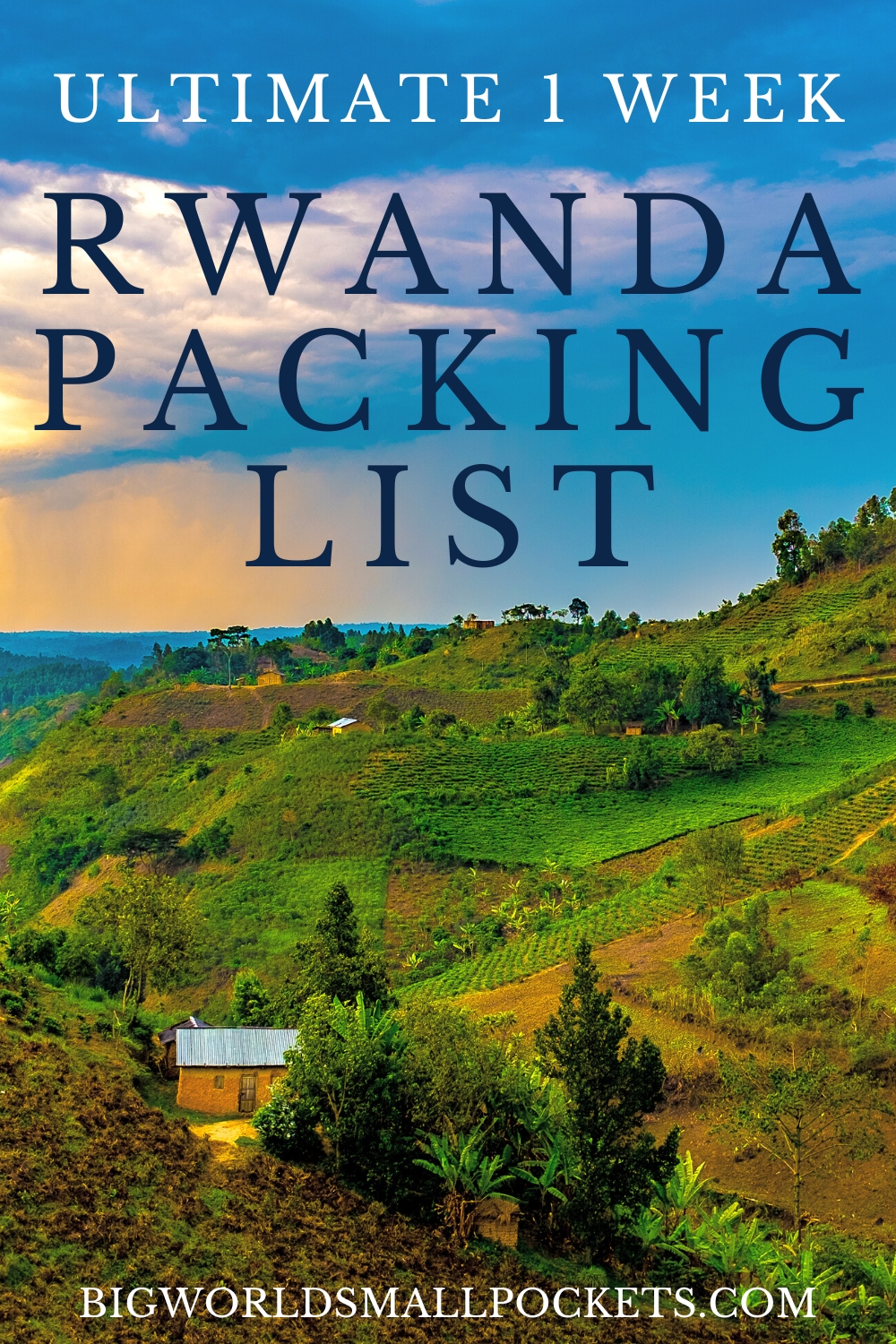
And there it is, my ultimate guide of what to wear in Rwanda and how to pack for your travels in this country.
Designed to be practical, while keeping things light, I hope I’ve covered everything you might need with my tips and item by item checklist.
Did I miss anything out?
Please drop any comments into the box below and let me know…
Creator of Big World Small Pockets, Stephanie Parker is a travel addict! Originally from Jersey in the Channel Islands, Stephanie adventures the world collecting tips, advice and stories, to share with a smile
Leave a Reply Cancel reply
Your email address will not be published. Required fields are marked *
This site uses Akismet to reduce spam. Learn how your comment data is processed .
- Skip to main content
- Skip to "About this site"
Language selection
Search travel.gc.ca.
Help us to improve our website. Take our survey !
COVID-19: travel health notice for all travellers
Rwanda travel advice
Latest updates: Editorial change
Last updated: April 10, 2024 08:12 ET
On this page
Safety and security, entry and exit requirements, laws and culture, natural disasters and climate, rwanda - take normal security precautions.
Take normal security precautions in Rwanda.
Border with the Democratic Republic of Congo - Avoid non-essential travel
Avoid non-essential travel to areas within 10 km of the border with Democratic Republic of Congo (DRC) due to the rebel groups in DRC near the border with Rwanda.
Back to top
Border with the Democratic Republic of Congo
The volatile situation in the eastern part of neighbouring Democratic Republic of Congo (DRC) could lead to possible incursions into western Rwanda by DRC armed rebel groups.
Petty crime
Petty crime, such as pickpocketing and bag snatching, occurs.
Theft is frequent in:
- hotel rooms
- crowded areas, such as markets
During your trip to Rwanda:
- ensure that your personal belongings, including your passport and your other travel documents, are secure at all times
- avoid showing signs of affluence or wearing expensive jewellery
- avoid carrying large sums of cash or valuables
- keep your vehicle doors and windows locked at all times
Violent crime
Although rare, violent crime has occurred, namely:
- burglary, especially in Kigali
- armed robberies
Tourists are usually not targeted, however you could be at the wrong place at the wrong time.
During your trip:
- be aware of your surroundings at all times
- don’t venture out alone or travel outside major cities after dark
- avoid isolated areas
- if you're being robbed, hand over cash, electronic devices and valuables without resistance
Road safety
Road conditions.
The road system is generally good and well maintained in Kigali and on main roads throughout the country. Outside of these areas, most roads are not paved, and driving can be dangerous due to:
- insufficient lighting
- lack of traffic signs
- stray livestock
- poorly maintained vehicles
Driving habits
Drivers do not always respect traffic laws and sometimes drive at excessive speeds. However, speed cameras, present on all main roads, have reduced speeding frequency.
If you choose to drive in Rwanda:
- always drive defensively
- familiarize yourself with your itinerary before you leave
- avoid travelling after dark
- ask about insurance coverage options for roadside assistance when you rent a vehicle
Roadblocks are common throughout the country.
You may be asked for identification and your vehicle and luggage may be searched.
- Make sure your travel documents are up to date
- Do not go through a checkpoint without stopping, even if it appears unattended
- Follow the instructions of police officers
Cybersecurity
Cybercrime, malware attacks and online extortion occur in Rwanda.
Criminals can compromise public Wi-Fi networks to steal personal data or credit card information.
- Avoid online shopping on unencrypted websites
- Be cautious when posting information on social media
- Be especially cautious if you decide to meet someone you met online
- Be wary of unsolicited emails offering attractive business opportunities
- Don't click on suspicious links that ask for your banking information
Demonstrations
Demonstrations may occur, however a demonstration permit is required.
- Avoid areas where demonstrations and large gatherings are taking place
- Follow the instructions of local authorities
- Monitor local media for information on ongoing demonstrations
Mass gatherings (large-scale events)
Adventure tourism
Outdoor activities, such as hiking, mountain biking, kayaking and other adventure activities can be dangerous if unprepared. Trails are not always marked, and weather conditions can change rapidly.
When visiting a national park:
- you must purchase a park permit from Rwanda’s Office of Tourism and National Parks
- consider hiring an experienced guide from a reputable company
- only use established trails
Rwanda’s Office of Tourism and National Parks
Water shortages
Water shortages may occur throughout the country during the long dry season from June to September.
- Plan accordingly
- Keep a supply of water on hand
Public transportation
Shared buses, motorbike taxis and minibuses are the most common forms of public transportation and can be dangerous due to reckless driving.
- Only use licensed public bus and auto taxi companies
- Confirm the fare with the driver before departing
- Don’t use public transportation at night
We do not make assessments on the compliance of foreign domestic airlines with international safety standards.
Information about foreign domestic airlines
Every country or territory decides who can enter or exit through its borders. The Government of Canada cannot intervene on your behalf if you do not meet your destination’s entry or exit requirements.
We have obtained the information on this page from the Rwandan authorities. It can, however, change at any time.
Verify this information with the Foreign Representatives in Canada .
Entry requirements vary depending on the type of passport you use for travel.
Before you travel, check with your transportation company about passport requirements. Its rules on passport validity may be more stringent than the country’s entry rules.
Regular Canadian passport
Your passport must be valid for at least 6 months beyond the date you expect to leave Rwanda.
Passport for official travel
Different entry rules may apply.
Official travel
Passport with “X” gender identifier
While the Government of Canada issues passports with an “X” gender identifier, it cannot guarantee your entry or transit through other countries. You might face entry restrictions in countries that do not recognize the “X” gender identifier. Before you leave, check with the closest foreign representative for your destination.
Other travel documents
Different entry rules may apply when travelling with a temporary passport or an emergency travel document. Before you leave, check with the closest foreign representative for your destination.
Useful links
- Foreign Representatives in Canada
- Canadian passports
Tourist visa: required - a 30 day visa can be obtained upon arrival or in advance via the Irembo platform Work permit: required Business visa: required, valid for 90 days and may be extended once. You may obtain a 30-day visa upon arrival. Visa extension requests can be made via the Irembo platform.
- Irembo platform for visa applications – Government of Rwanda
- Rwanda Directorate General of Immigration and Emigration
East African Tourist Visa
The East African Tourist Visa (EATV) allows for multiple entries to Kenya, Uganda, and Rwanda. It is valid for 90 days and cannot be extended. You may obtain this visa:
- upon arrival
- at the nearest Rwandan embassy or consulate
If you get the EATV visa prior to your departure, your first entry point must be the country that issued the visa.
EATV application – Government of Rwanda.
Border closures
The border between Rwanda and Burundi has been closed since January 11, 2024. The border will remain closed until further notice.
Children and travel
Learn more about travelling with children .
Yellow fever
Learn about potential entry requirements related to yellow fever (vaccines section).
Relevant Travel Health Notices
- Global Measles Notice - 13 March, 2024
- COVID-19 and International Travel - 13 March, 2024
This section contains information on possible health risks and restrictions regularly found or ongoing in the destination. Follow this advice to lower your risk of becoming ill while travelling. Not all risks are listed below.
Consult a health care professional or visit a travel health clinic preferably 6 weeks before you travel to get personalized health advice and recommendations.
Routine vaccines
Be sure that your routine vaccinations , as per your province or territory , are up-to-date before travelling, regardless of your destination.
Some of these vaccinations include measles-mumps-rubella (MMR), diphtheria, tetanus, pertussis, polio, varicella (chickenpox), influenza and others.
Pre-travel vaccines and medications
You may be at risk for preventable diseases while travelling in this destination. Talk to a travel health professional about which medications or vaccines may be right for you, based on your destination and itinerary.
There is a risk of hepatitis A in this destination. It is a disease of the liver. People can get hepatitis A if they ingest contaminated food or water, eat foods prepared by an infectious person, or if they have close physical contact (such as oral-anal sex) with an infectious person, although casual contact among people does not spread the virus.
Practise safe food and water precautions and wash your hands often. Vaccination is recommended for all travellers to areas where hepatitis A is present.
Yellow fever is a disease caused by a flavivirus from the bite of an infected mosquito.
Travellers get vaccinated either because it is required to enter a country or because it is recommended for their protection.
- There is low potential for yellow fever exposure in this country.
Country Entry Requirement*
- Proof of vaccination is required if you are coming from a country where yellow fever occurs.
Recommendation
- Vaccination may be recommended depending on your itinerary.
- Contact a designated Yellow Fever Vaccination Centre well in advance of your trip to arrange for vaccination.
- Discuss travel plans, activities, and destinations with a health care professional.
- Protect yourself from mosquito bites .
About Yellow Fever
Yellow Fever Vaccination Centres in Canada * It is important to note that country entry requirements may not reflect your risk of yellow fever at your destination. It is recommended that you contact the nearest diplomatic or consular office of the destination(s) you will be visiting to verify any additional entry requirements.
Measles is a highly contagious viral disease. It can spread quickly from person to person by direct contact and through droplets in the air.
Anyone who is not protected against measles is at risk of being infected with it when travelling internationally.
Regardless of where you are going, talk to a health care professional before travelling to make sure you are fully protected against measles.
This destination is in the African Meningitis Belt, an area which has the highest rates of meningococcal disease in the world. Meningococcal disease is a serious and sometimes fatal infection.
Travellers who are at higher risk should discuss vaccination with a health care provider. High-risk travellers include those living or working with the local population (e.g., health care workers) or those travelling to crowded areas or taking part in large gatherings.
Hepatitis B is a risk in every destination. It is a viral liver disease that is easily transmitted from one person to another through exposure to blood and body fluids containing the hepatitis B virus. Travellers who may be exposed to blood or other bodily fluids (e.g., through sexual contact, medical treatment, sharing needles, tattooing, acupuncture or occupational exposure) are at higher risk of getting hepatitis B.
Hepatitis B vaccination is recommended for all travellers. Prevent hepatitis B infection by practicing safe sex, only using new and sterile drug equipment, and only getting tattoos and piercings in settings that follow public health regulations and standards.
The best way to protect yourself from seasonal influenza (flu) is to get vaccinated every year. Get the flu shot at least 2 weeks before travelling.
The flu occurs worldwide.
- In the Northern Hemisphere, the flu season usually runs from November to April.
- In the Southern Hemisphere, the flu season usually runs between April and October.
- In the tropics, there is flu activity year round.
The flu vaccine available in one hemisphere may only offer partial protection against the flu in the other hemisphere.
The flu virus spreads from person to person when they cough or sneeze or by touching objects and surfaces that have been contaminated with the virus. Clean your hands often and wear a mask if you have a fever or respiratory symptoms.
Coronavirus disease (COVID-19) is an infectious viral disease. It can spread from person to person by direct contact and through droplets in the air.
It is recommended that all eligible travellers complete a COVID-19 vaccine series along with any additional recommended doses in Canada before travelling. Evidence shows that vaccines are very effective at preventing severe illness, hospitalization and death from COVID-19. While vaccination provides better protection against serious illness, you may still be at risk of infection from the virus that causes COVID-19. Anyone who has not completed a vaccine series is at increased risk of being infected with the virus that causes COVID-19 and is at greater risk for severe disease when travelling internationally.
Before travelling, verify your destination’s COVID-19 vaccination entry/exit requirements. Regardless of where you are going, talk to a health care professional before travelling to make sure you are adequately protected against COVID-19.
Malaria is a serious and sometimes fatal disease that is caused by parasites spread through the bites of mosquitoes.
Malaria is a risk to travellers to this destination. Antimalarial medication is recommended for most travellers to this destination and should be taken as recommended. Consult a health care professional or visit a travel health clinic before travelling to discuss your options. It is recommended to do this 6 weeks before travel, however, it is still a good idea any time before leaving. Protect yourself from mosquito bites at all times:
- Cover your skin and use an approved insect repellent on uncovered skin.
- Exclude mosquitoes from your living area with screening and/or closed, well-sealed doors and windows.
- Use insecticide-treated bed nets if mosquitoes cannot be excluded from your living area.
- Wear permethrin-treated clothing.
If you develop symptoms similar to malaria when you are travelling or up to a year after you return home, see a health care professional immediately. Tell them where you have been travelling or living.
In this destination, rabies is commonly carried by dogs and some wildlife, including bats. Rabies is a deadly disease that spreads to humans primarily through bites or scratches from an infected animal. While travelling, take precautions , including keeping your distance from animals (including free-roaming dogs), and closely supervising children.
If you are bitten or scratched by a dog or other animal while travelling, immediately wash the wound with soap and clean water and see a health care professional. In this destination, rabies treatment may be limited or may not be available, therefore you may need to return to Canada for treatment.
Before travel, discuss rabies vaccination with a health care professional. It may be recommended for travellers who are at high risk of exposure (e.g., occupational risk such as veterinarians and wildlife workers, children, adventure travellers and spelunkers, and others in close contact with animals).
Safe food and water precautions
Many illnesses can be caused by eating food or drinking beverages contaminated by bacteria, parasites, toxins, or viruses, or by swimming or bathing in contaminated water.
- Learn more about food and water precautions to take to avoid getting sick by visiting our eat and drink safely abroad page. Remember: Boil it, cook it, peel it, or leave it!
- Avoid getting water into your eyes, mouth or nose when swimming or participating in activities in freshwater (streams, canals, lakes), particularly after flooding or heavy rain. Water may look clean but could still be polluted or contaminated.
- Avoid inhaling or swallowing water while bathing, showering, or swimming in pools or hot tubs.
Travellers' diarrhea is the most common illness affecting travellers. It is spread from eating or drinking contaminated food or water.
Risk of developing travellers' diarrhea increases when travelling in regions with poor standards of hygiene and sanitation. Practise safe food and water precautions.
The most important treatment for travellers' diarrhea is rehydration (drinking lots of fluids). Carry oral rehydration salts when travelling.
Typhoid is a bacterial infection spread by contaminated food or water. Risk is higher among children, travellers going to rural areas, travellers visiting friends and relatives or those travelling for a long period of time.
Travellers visiting regions with a risk of typhoid, especially those exposed to places with poor sanitation, should speak to a health care professional about vaccination.
There is a risk of schistosomiasis in this destination. Schistosomiasis is a parasitic disease caused by tiny worms (blood flukes) which can be found in freshwater (lakes, rivers, ponds, and wetlands). The worms can break the skin, and their eggs can cause stomach pain, diarrhea, flu-like symptoms, or urinary problems. Schistosomiasis mostly affects underdeveloped and r ural communities, particularly agricultural and fishing communities.
Most travellers are at low risk. Travellers should avoid contact with untreated freshwater such as lakes, rivers, and ponds (e.g., swimming, bathing, wading, ingesting). There is no vaccine or medication available to prevent infection.
Insect bite prevention
Many diseases are spread by the bites of infected insects such as mosquitoes, ticks, fleas or flies. When travelling to areas where infected insects may be present:
- Use insect repellent (bug spray) on exposed skin
- Cover up with light-coloured, loose clothes made of tightly woven materials such as nylon or polyester
- Minimize exposure to insects
- Use mosquito netting when sleeping outdoors or in buildings that are not fully enclosed
To learn more about how you can reduce your risk of infection and disease caused by bites, both at home and abroad, visit our insect bite prevention page.
Find out what types of insects are present where you’re travelling, when they’re most active, and the symptoms of the diseases they spread.
There is a risk of chikungunya in this country. The risk may vary between regions of a country. Chikungunya is a virus spread through the bite of an infected mosquito. Chikungunya can cause a viral disease that typically causes fever and pain in the joints. In some cases, the joint pain can be severe and last for months or years.
Protect yourself from mosquito bites at all times. There is no vaccine available for chikungunya.
- In this country, risk of dengue is sporadic. It is a viral disease spread to humans by mosquito bites.
- Dengue can cause flu-like symptoms. In some cases, it can lead to severe dengue, which can be fatal.
- The level of risk of dengue changes seasonally, and varies from year to year. The level of risk also varies between regions in a country and can depend on the elevation in the region.
- Mosquitoes carrying dengue typically bite during the daytime, particularly around sunrise and sunset.
- Protect yourself from mosquito bites . There is no vaccine or medication that protects against dengue fever.
Animal precautions
Some infections, such as rabies and influenza, can be shared between humans and animals. Certain types of activities may increase your chance of contact with animals, such as travelling in rural or forested areas, camping, hiking, and visiting wet markets (places where live animals are slaughtered and sold) or caves.
Travellers are cautioned to avoid contact with animals, including dogs, livestock (pigs, cows), monkeys, snakes, rodents, birds, and bats, and to avoid eating undercooked wild game.
Closely supervise children, as they are more likely to come in contact with animals.
Person-to-person infections
Stay home if you’re sick and practise proper cough and sneeze etiquette , which includes coughing or sneezing into a tissue or the bend of your arm, not your hand. Reduce your risk of colds, the flu and other illnesses by:
- washing your hands often
- avoiding or limiting the amount of time spent in closed spaces, crowded places, or at large-scale events (concerts, sporting events, rallies)
- avoiding close physical contact with people who may be showing symptoms of illness
Sexually transmitted infections (STIs) , HIV , and mpox are spread through blood and bodily fluids; use condoms, practise safe sex, and limit your number of sexual partners. Check with your local public health authority pre-travel to determine your eligibility for mpox vaccine.
Tuberculosis is an infection caused by bacteria and usually affects the lungs.
For most travellers the risk of tuberculosis is low.
Travellers who may be at high risk while travelling in regions with risk of tuberculosis should discuss pre- and post-travel options with a health care professional.
High-risk travellers include those visiting or working in prisons, refugee camps, homeless shelters, or hospitals, or travellers visiting friends and relatives.
HIV (Human Immunodeficiency Virus) is a virus that attacks and impairs the immune system, resulting in a chronic, progressive illness known as AIDS (Acquired Immunodeficiency Syndrome).
High risk activities include anything which puts you in contact with blood or body fluids, such as unprotected sex and exposure to unsterilized needles for medications or other substances (for example, steroids and drugs), tattooing, body-piercing or acupuncture.
Medical services and facilities
Public medical facilities in Kigali are adequate for routine procedures. Access to health care is limited outside of Kigali.
Private facilities are often better equipped but are more expensive.
Serious medical problems may require air evacuation to a neighboring country.
Make sure you get travel insurance that includes coverage for medical evacuation and hospital stays.
Travel health and safety
Prescription medication
Some prescription medications may not be available in Rwanda.
If you take prescription medications, make sure they’re legal before travelling to Rwanda.
- Bring sufficient quantities of your medication with you
- Always keep your medication in the original container
- Pack them in your carry-on luggage
- Carry a copy of your prescriptions
Keep in Mind...
The decision to travel is the sole responsibility of the traveller. The traveller is also responsible for his or her own personal safety.
Be prepared. Do not expect medical services to be the same as in Canada. Pack a travel health kit , especially if you will be travelling away from major city centres.
You must abide by local laws.
Learn about what you should do and how we can help if you are arrested or detained abroad .
Penalties for possession, use or trafficking of illegal drugs are severe. Convicted offenders can face heavy fines and imprisonment.
Drugs, alcohol and travel
Non-biodegradable bags
Non-biodegradable bags are prohibited in Rwanda. If you arrive with such bags at the airport in Kigali, they will be confiscated.
Photography
Photography of sensitive installations is prohibited. This includes:
- military sites
- government buildings
- border crossing areas
Dual citizenship
Dual citizenship is legally recognized in Rwanda.
If you are a Canadian citizen, but also a citizen of Rwanda, our ability to offer you consular services may be limited while you're there. You may also be subject to different entry/exit requirements .
Travellers with dual citizenship
International Child Abduction
The Hague Convention on the Civil Aspects of International Child Abduction is an international treaty. It can help parents with the return of children who have been removed to or retained in certain countries in violation of custody rights. It does not apply between Canada and Rwanda.
If your child was wrongfully taken to, or is being held in Rwanda by an abducting parent:
- act as quickly as you can
- consult a lawyer in Canada and in Rwanda to explore all the legal options for the return of your child
- report the situation to the nearest Canadian government office abroad or to the Vulnerable Children’s Consular Unit at Global Affairs Canada by calling the Emergency Watch and Response Centre.
If your child was removed from a country other than Canada, consult a lawyer to determine if The Hague Convention applies.
Be aware that Canadian consular officials cannot interfere in private legal matters or in another country’s judicial affairs.
- International Child Abduction: A Guidebook for Left-Behind Parents
- Travelling with children
- Canadian embassies and consulates by destination
- Emergency Watch and Response Centre
Dress and behaviour
To avoid offending local sensitivities:
- dress conservatively
- behave discreetly
- respect religious and social traditions
- seek permission from locals before photographing them
The recreational and commercial flying of drones is strictly regulated. You must seek the permission from Rwanda Civil Aviation Authority prior to operating a drone. If you don’t comply, you may be fined and your drone confiscated.
Drones – Visit Rwanda
You must carry an international driving permit.
International Driving Permit
Third-party insurance is required to cover damages if you are involved in an accident resulting in injuries even if you are not found to be at fault. If you are suspected of causing an accident, your driver’s licence can be confiscated during the investigation. If the accident results in death, you may be subject to a jail sentence.
The currency of Rwanda is the Rwandan franc (RWF).
Rwanda is a cash-based economy. Electronic payments and online banking are becoming more available. Credit cards are usually accepted at:
- most hotels and lodges
- most businesses, restaurants and shops in Kigali
ATMs are available in large cities. Some ATMs may not accept foreign bank cards, but you can make withdrawals at the bank counter, using your passport as identification. Expect to handle other expenses in cash.
Most shops will not accept or exchange U.S. dollars printed before 2006.
Earthquakes
Rwanda is located in an active seismic zone. However, earthquakes are not common.
Earthquakes - What to Do?
There are several active and dormant volcanoes in and around Rwanda.
The Nyiragongo volcano, located near Goma DRC, is one of the world’s most active volcanoes. It may pose a threat in northwestern areas in Rwanda near the DRC border.
Past eruptions forced the evacuation of hundreds of thousands of people, caused significant damage to infrastructure, and resulted in many casualties.
If you are travelling near an active volcano:
- exercise caution
- take official warnings seriously and respect exclusion zones
- monitor local media to stay up to date on latest developments and volcanic activity levels
- follow the advice of local authorities
Rainy season
The rainy season extends from February to May and from September to December.
Seasonal flooding can hamper overland travel and reduce the provision of essential services. Roads may become impassable and bridges damaged.
- Monitor local media for the latest updates, including those on road conditions
- Stay away from flooded areas
- Monitor weather reports
- Follow the instructions of local authorities, including evacuation orders
Local services
Emergency services exist but may be subject to certain limitations. In case of emergency, dial:
- police: 112
- medical assistance: 912
- gender- based violence: 3512
Consular assistance
For emergency consular assistance, call the High Commission of Canada in Rwanda, in Kigali, and follow the instructions. At any time, you may also contact the Emergency Watch and Response Centre in Ottawa.
The decision to travel is your choice and you are responsible for your personal safety abroad. We take the safety and security of Canadians abroad very seriously and provide credible and timely information in our Travel Advice to enable you to make well-informed decisions regarding your travel abroad.
The content on this page is provided for information only. While we make every effort to give you correct information, it is provided on an "as is" basis without warranty of any kind, expressed or implied. The Government of Canada does not assume responsibility and will not be liable for any damages in connection to the information provided.
If you need consular assistance while abroad, we will make every effort to help you. However, there may be constraints that will limit the ability of the Government of Canada to provide services.
Learn more about consular services .
Risk Levels
take normal security precautions.
Take similar precautions to those you would take in Canada.
Exercise a high degree of caution
There are certain safety and security concerns or the situation could change quickly. Be very cautious at all times, monitor local media and follow the instructions of local authorities.
IMPORTANT: The two levels below are official Government of Canada Travel Advisories and are issued when the safety and security of Canadians travelling or living in the country or region may be at risk.
Avoid non-essential travel
Your safety and security could be at risk. You should think about your need to travel to this country, territory or region based on family or business requirements, knowledge of or familiarity with the region, and other factors. If you are already there, think about whether you really need to be there. If you do not need to be there, you should think about leaving.
Avoid all travel
You should not travel to this country, territory or region. Your personal safety and security are at great risk. If you are already there, you should think about leaving if it is safe to do so.
You are using an outdated browser. Upgrade your browser today or install Google Chrome Frame to better experience this site.
Rwanda Healthy Travel Packing List
Pack items for your health and safety.
- You may not be able to purchase and pack all of these items, and some may not be relevant to you and your travel plans. Talk to your doctor about which items are most important for you.
- This list is general and may not include all the items you need. Check our Traveler Information Center for more information if you are a traveler with specific health needs, such as travelers who are pregnant, immune compromised, or traveling for a specific purpose like humanitarian aid work.
- Remember to pack extras of important health supplies in case of travel delays.
Prescription medicines
- Your prescriptions
- Travelers' diarrhea antibiotic
- Suture/syringe kit Kit is for use by local health care provider & requires a letter from your doctor on letterhead stationery
- Altitude sickness medicine
- Medicine to prevent malaria
Medical supplies
- Glasses Consider packing spare glasses in case yours are damaged
- Contact lenses Consider packing spare contacts in case yours are damaged
- Needles or syringes (for diabetes, for example) Requires a letter from your doctor on letterhead stationery
- Suture kit Kit is for use by local health care provider & requires a letter from your doctor on letterhead stationery
- Diabetes testing supplies
- Epinephrine auto-injectors (EpiPens)
- Medical alert bracelet or necklace
Over-the-counter medicines
- Antihistamine
- Motion sickness medicine
- Cough drops
- Cough suppression/expectorant
- Decongestant
- Medicine for pain and fever Examples: acetaminophen, aspirin, or ibuprofen
- Mild laxative
- Mild sedative or other sleep aid
- Saline nose spray
Supplies to prevent illness or injury
- Hand sanitizer or wipes Alcohol-based hand sanitizer containing at least 60% alcohol or antibacterial hand wipes
- Water purification tablets See CDC recommendations: Water Disinfection .
- Water purification tablets May be needed if camping or visiting remote areas
- Insect repellent Select an insect repellent based on CDC recommendations: Avoid Bug Bites
- Permethrin Permethrin is insect repellent for clothing. It may be needed if you spend a lot of time outdoors. Clothing can also be treated at home in advance.
- Bed net For protection against insect bites while sleeping
- Sunscreen (SPF 15 or greater) with UVA and UVB protection. See Sun Exposure .
- Sunglasses and hat Wear for additional sun protection. A wide brim hat is preferred.
- Personal safety equipment Examples: child safety seats, bicycle helmets
- Latex condoms
First-aid kit
- 1% hydrocortisone cream
- Antifungal ointments
- Antibacterial ointments
- Antiseptic wound cleanser
- Aloe gel For sunburns
- Insect bite treatment Anti-itch gel or cream
- Bandages Multiple sizes, gauze, and adhesive tape
- Moleskin or molefoam for blisters
- Elastic/compression bandage wrap For sprains and strains
- Disposable gloves
- Digital thermometer
- Scissors and safety pins
- Cotton swabs (Q-Tips)
- Oral rehydration salts
- Health insurance documents Health insurance card (your regular plan and/or supplemental travel health insurance plan) and copies of claim forms
- Proof of yellow fever vaccination If required for your trip, take your completed International Certificate of Vaccination or Prophylaxis card or medical waiver
- Copies of all prescriptions Make sure prescriptions include generic names. Bring prescriptions for medicines, eye glasses/contacts, and other medical supplies.
- Family member or close contact remaining in the United States
- Health care provider(s) at home
- Lodging at your destination
- Hospitals or clinics (including emergency services) in your destination
- US embassy or consulate in the destination country or countries
Other Destinations
If you need help finding travel information:
Message & data rates may apply. CDC Privacy Policy
File Formats Help:
- Adobe PDF file
- Microsoft PowerPoint file
- Microsoft Word file
- Microsoft Excel file
- Audio/Video file
- Apple Quicktime file
- RealPlayer file
- Zip Archive file
Exit Notification / Disclaimer Policy
- The Centers for Disease Control and Prevention (CDC) cannot attest to the accuracy of a non-federal website.
- Linking to a non-federal website does not constitute an endorsement by CDC or any of its employees of the sponsors or the information and products presented on the website.
- You will be subject to the destination website's privacy policy when you follow the link.
- CDC is not responsible for Section 508 compliance (accessibility) on other federal or private website.
- Company History
- Mission Statement
- Philippines
- South Africa
- Afghanistan
- American Samoa
- Antigua and Barbuda
- British Virgin Islands
- Burkina Faso
- Canary Islands
- Cayman Islands
- Central African Republic
- Christmas Island
- Cocos (Keeling) Islands
- Cook Islands
- Cote d'Ivoire
- Democratic Republic of the Congo
- Dominican Republic
- Easter Island
- El Salvador
- Equatorial Guinea
- Falkland Islands
- Faroe Islands
- French Guiana
- French Polynesia
- Guinea-Bissau
- Liechtenstein
- Madeira Islands
- Marshall Islands
- Netherlands
- New Caledonia
- New Zealand
- Norfolk Island
- North Korea
- North Macedonia
- Northern Mariana Islands
- Palestinian Territories
- Papua New Guinea
- Pitcairn Islands
- Puerto Rico
- Republic of the Congo
- Saint Barthelemy
- Saint Helena
- Saint Kitts and Nevis
- Saint Lucia
- Saint Martin
- Saint Pierre-et-Miquelon
- Saint Vincent and the Grenadines
- Sao Tome and Principe
- Saudi Arabia
- Sierra Leone
- Sint Eustatius
- Solomon Islands
- South Georgia and the South Sandwich Islands
- South Korea
- South Sudan
- Switzerland
- Trinidad and Tobago
- Turkmenistan
- Turks and Caicos Islands
- U.S. Virgin Islands
- United Arab Emirates
- United Kingdom
- United States
- Wake Island
- Western Sahara
- Travel Vaccines
- Travel Health Consultations
- Travellers’ Diarrhea Kits
- Dengue Fever Prevention
- Malaria Prevention
- Chikungunya Prevention
- Zika Prevention
- Ebola Virus
- Yellow Fever
- Hepatitis A
- Japanese Encephalitis
- Hepatitis B
- Tickborne Encephalitis (TBE)
- Tetanus-Diphtheria-Pertussis
- Measles-Mumps-Rubella
- Influenza (Flu)
- Blood Tests
- Vitamin Injections
- Physician Referral Program
- London – Euston Travel Clinic
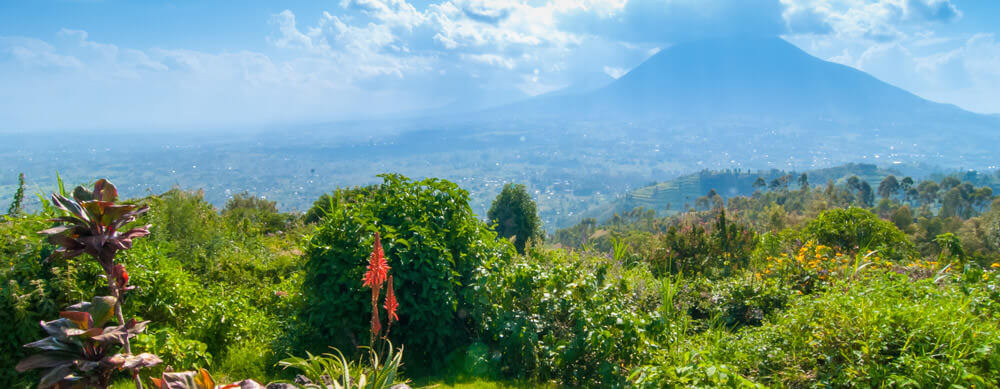
Travel Vaccines and Advice for Rwanda

Despite the 1994 genocide, Rwanda has a growing population and booming tourism trade.
The growing nation provides the opportunity to see mountain gorillas, bamboo forests and amazing volcanoes.
Rwanda is a must-visit for Africa-bound travellers.
Do I Need Vaccines for Rwanda?
See the bullets below to learn more about some of these key immunisations:
- Hepatitis A – Food & Water – Recommended for most travellers to the region, especially if unvaccinated.
- Hepatitis B – Blood & Body Fluids – Recommended for travellers to most regions.
- Tetanus – Wounds or Breaks in Skin – Recommended for travellers to most regions, especially if not previously vaccinated.
- Typhoid – Food & Water – Jab lasts 3 years. Oral vaccine lasts 5 years, must be able to swallow pills. Oral doses must be kept in refrigerator.
- Cholera – Food & Water – Recommended for travel to most regions.
- Yellow Fever – Mosquito – Required if travelling from a country with risk of yellow fever transmission
- Rabies – Saliva of Infected Animals – High risk country. Vaccine recommended for long-stay travellers and those who may come in contact with animals.
- Meningitis – Airborne & Direct Contact – Located in the meningitis belt, vaccination is recommended during the dry season (Dec. – June)
See the tables below for more information:
Malaria is endemic in Rwanda. Antimalarials are the best protection against infection. Be sure to use mosquito repellents as a second barrier against the disease.
Medical facilities are common throughout Rwanda, with the best services provided in Kigali. Some medicines and prescriptions may be hard to find here.
Visit our vaccinations page to learn more. Travel safely with Passport Health and schedule your appointment today by calling or book online now .
Do I Need a Visa or Passport for Rwanda?
Visas are required for all travellers to Rwanda. On arrival visas are available for tourists, other travellers must apply before travel. Passports should be valid for at least six months from the point of entry. Proof of yellow fever vaccination may be required if you are travelling from a region where yellow fever is present.
Sources: Embassy of Rwanda and GOV.UK
What is the Climate Like in Rwanda?
Rwanda’s weather is tropical and doesn’t change much throughout the year. The temperature is usually warm, but it can be cooler in some areas due to the high altitude. The weather in Rwanda’s most popular tourist destinations varies slightly. Kigali has a temperate climate with two rainy seasons, from March to May and October to December.
Volcanoes National Park has cooler weather due to its high altitude and rainy seasons in March to May and October to November. Nyungwe Forest National Park is a rainforest with temperatures ranging from 10 to 20 degrees and rainy seasons from September to May. Lake Kivu is a popular tourist destination with a tropical climate, and temperatures ranging from 20 to 30 degrees throughout the year.
It’s important to note that weather can be unpredictable, so it’s always good to check the forecast before going on a trip.
How Safe is Rwanda?
Travellers should be cautious around border areas. An armed militant group (The Democratic Forces of the Liberation of Rwanda) operate in the Democratic Republic of Congo and are near the border. Rape, pillaging and kidnapping can occur in the North and South Kivu provinces.
Also be cautious at Volcanoes National Park, for DRC militant groups also operate on the DRC border, though sometimes the borders are not marked.
The most common crimes that are reported are robbery. Don’t display cash, avoid walking at night, and motor with your doors and windows locked.
Genocide Memorial in Rwanda
In 1994, one million Tutsis and Hutus were murdered in the span of 100 days by the Interahamwe. A memorial to the victims of this genocide can is in the capital city of Kigali.
The memorial honours the 250,000 victims that were buried in a mass grave where the memorial is now placed. The memorial tells the history of colonization in Rwanda and the events that led up to the genocide. A particular section of the memorial is dedicated to the murdered children. The section showcases children’s stories using life-sized photographs and biographies of the children. The memorial also calls for justice through the court system.
This memorial not only remembers the genocide that occurred in Rwanda, but also takes a look at other genocides that have occurred throughout the world.
What Should I Pack for Rwanda?
Here are some essential items to consider for your trip to Rwanda:
- Bring light layers of clothing. It can be hot during the day, but it can get cooler at night.
- Sun cream to protect your skin from the sun. Sun cream is available here, but it may be quite expensive.
- Insect repellent and mosquito nets are important to have. Practice all precautions against mosquito bites to avoid malaria and zika.
- Comfortable walking shoes make exploring much easier. Roads can be muddy and uneven. Simple sandals won’t cut it.
Embassy of the United Kingdom in Rwanda
If you are in Rwanda and have an emergency (for example, been attacked, arrested or someone has died) contact the nearest consular services. Contact the embassy before arrival if you have additional questions on entry requirements, safety concerns or are in need of assistance.
British High Commission Kigali KG 7 Ave Kacyiru-Sud Kigali Kigali BP 576 Rwanda Telephone: +250 252 556 000 or +44 1908 516666 Emergency Phone: +250 252 556 000 Fax: +250 252 582 044 Email: [email protected]
Stay safe abroad with Passport Health. Ring or book online now and start travelling safely today!
On This Page: Do I Need Vaccines for Rwanda? Do I Need a Visa or Passport for Rwanda? What is the Climate Like in Rwanda? How Safe is Rwanda? Genocide Memorial in Rwanda What Should I Pack To Rwanda? Embassy of the United Kingdom in Rwanda
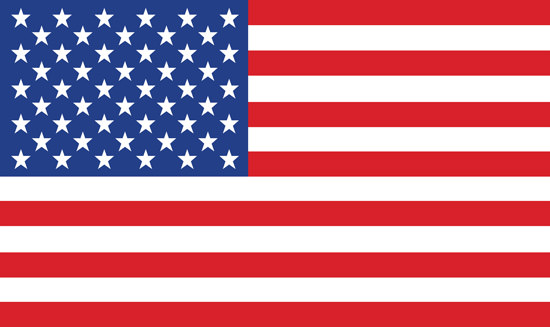
- Privacy Policy
- Automatic Data Collection Statement
Cookies on GOV.UK
We use some essential cookies to make this website work.
We’d like to set additional cookies to understand how you use GOV.UK, remember your settings and improve government services.
We also use cookies set by other sites to help us deliver content from their services.
You have accepted additional cookies. You can change your cookie settings at any time.
You have rejected additional cookies. You can change your cookie settings at any time.
- Passports, travel and living abroad
- Travel abroad
- Foreign travel advice
Entry requirements
This advice reflects the UK government’s understanding of current rules for people travelling on a full ‘British citizen’ passport from the UK, for the most common types of travel.
The authorities in Rwanda set and enforce entry rules. If you’re not sure how these requirements apply to you, contact the Rwandan High Commission in the UK .
COVID-19 rules
There are no COVID-19 testing or vaccination requirements for travellers entering Rwanda.
Passport validity requirements
To enter Rwanda, your passport must have an ‘expiry date’ at least 6 months after the date you arrive and at least one blank page for entry stamps.
Check with your travel provider that your passport and other travel documents meet requirements. Renew your passport if you need to.
You will be denied entry if you do not have a valid travel document or try to use a passport that has been reported lost or stolen.
Visa requirements
You must have a visa to enter Rwanda as a visitor. As a citizen of a Commonwealth country, you can get a free 30-day visa on arrival.
Rwanda’s immigration department has information on visa requirements .
Applying for a visa
You can also apply for a visa from the Rwandan High Commission in London.
You must get a UK Police Certificate before you travel if you’re applying for a resident, business or missionary multiple-entry visa. It usually takes at least 10 working days to process.
Travel between Rwanda and the Democratic Republic of the Congo
Check land border crossing opening hours before you travel between Rwanda and the Democratic Republic of the Congo at Gisenyi-Goma and Cyangugu-Bukavu, as they vary.
You may experience immigration difficulties if you do not have residency status and regularly cross between the 2 countries.
Vaccination requirements
To enter Rwanda, you must have a certificate to prove you’ve had a yellow fever vaccination if you’re coming from a country listed as a transmission risk .
For full details about medical entry requirements and recommended vaccinations, see TravelHealthPro’s Rwanda guide .
Customs rules
There are strict rules about goods you can take into or out of Rwanda . You must declare anything that may be prohibited or subject to tax or duty.
You must declare drones when you arrive. They may be confiscated or held until you leave the country.
Related content
Is this page useful.
- Yes this page is useful
- No this page is not useful
Help us improve GOV.UK
Don’t include personal or financial information like your National Insurance number or credit card details.
To help us improve GOV.UK, we’d like to know more about your visit today. We’ll send you a link to a feedback form. It will take only 2 minutes to fill in. Don’t worry we won’t send you spam or share your email address with anyone.
When is Eid al-Fitr 2024 and how is it celebrated?
The three-day festival celebrates the completion of the fasting month of Ramadan by Muslims across the world.

As a new moon was not sighted on Monday evening after Maghrib prayers, Muslims in Saudi Arabia and neighbouring countries will fast one more day, completing 30 days of Ramadan. The first day of Eid will then be celebrated on Wednesday, April 10.
The first day of Eid al-Fitr is determined by the sighting of the crescent moon marking the start of the month of Shawwal, the 10th month of the Islamic (Hijri) calendar.
Keep reading
A ramadan no palestinian will ever forget, the cost of a ramadan iftar meal around the world, ramadan 2024: where do your dates come from, in washington, dc: celebrating ramadan, protesting israel’s siege of gaza.
Lunar months last between 29 and 30 days so Muslims usually have to wait until the night before Eid to verify its date.
Other countries follow independent sightings.
When the sighting has been verified, Eid is declared on television, radio stations and at mosques.
![rwanda fit for travel Muslim worshippers prepare to take part in a morning prayer on the first day of Eid al-Fitr, which marks the end of the holy fasting month of Ramadan, at the Blue Mosque in Istanbul, on April 21, 2023 [Yasin Akgul /AFP]](https://www.aljazeera.com/wp-content/uploads/2024/04/AFP__20230421__33DL38J__v1__HighRes__TurkeyReligionIslamEid-1712214656.jpg?w=770&resize=770%2C524)
How do Muslims celebrate Eid?
Traditionally, Eid is celebrated for three days as an official holiday in Muslim-majority countries. However, the number of holiday days varies by country.
Muslims begin Eid day celebrations by partaking in a prayer service that takes place shortly after dawn, followed by a short sermon.
![rwanda fit for travel Palestinian Muslims perform the morning Eid al-Fitr prayer, marking the end of the holy fasting month of Ramadan in Gaza City on May 2, 2022 [Mahmud HAMS / AFP]](https://www.aljazeera.com/wp-content/uploads/2024/04/AFP__20220502__329C2B2__v1__HighRes__PalestinianIsraelReligionEidGaza-1712214526.jpg?w=770&resize=770%2C514)
On their way to the prayer, which is traditionally held in an open area, Muslims recite takbeerat, praising God by saying “Allahu Akbar”, meaning “God is great”.

It is customary to eat something sweet before the prayer, such as date -filled biscuits known as maamoul in the Middle East. This particular festival is known as the “sweet” Eid – and the distribution of sweets is common across the Muslim world.
Muslims usually spend the day visiting relatives and neighbours and accepting sweets as they move around from house to house.
Each country has traditional desserts and sweets that are prepared before Eid or on the morning of the first day.

Children, dressed in new clothes, are offered gifts and money to celebrate the joyous occasion.
![rwanda fit for travel Children ride a swing on the first day of Eid al-Fitr, which marks the end of the Muslim holy fasting month of Ramadan, in the rebel-held town of Maaret Misrin in Syria's northwestern Idlib province, on April 21, 2023 [Abdulaziz Ketaz / AFP]](https://www.aljazeera.com/wp-content/uploads/2024/04/AFP__20230421__33DM4EH__v2__HighRes__SyriaReligionIslamEid-1712214711.jpg?w=770&resize=770%2C513)
Girls and women in many countries decorate their hands with henna. The celebration for Eid begins the night before as women gather in neighbourhoods and large family gatherings for the application of henna.
![rwanda fit for travel A girl shows her hand decorated with henna at a market area ahead of Eid al-Fitr, which marks the end of the Muslim holy festival of Ramadan, in Srinagar, on April 20, 2023 [Tauseef Mustafa / AFP]](https://www.aljazeera.com/wp-content/uploads/2024/04/AFP__20230420__33DJ2T3__v1__HighRes__IndiaKashmirReligionIslamEid-1712214614.jpg?w=770&resize=770%2C512)
In some countries, families visit graveyards to offer their respects to departed family members right after the morning prayers.
It is common for Muslim-majority countries to decorate their cities with lights and hold festivities to commemorate the end of the fasting month.
![rwanda fit for travel A general view shows the Alif Ki mosque illuminated during the holy month of Ramadan, ahead of Eid al-Fitr, in Ahmedabad on April 19, 2023 [Sam Panthaky/AFP]](https://www.aljazeera.com/wp-content/uploads/2024/04/AFP__20230419__33DH2JB__v1__HighRes__IndiaReligionIslamRamadan-1712214562.jpg?w=770&resize=770%2C513)
Eid amid the onslaught in Gaza
For some 2.3 million Palestinians in Gaza this Eid, this will be the first Muslim religious holiday after more than 33,000 people have been killed in Israeli attacks. With little food aid, and very limited water, Gaza’s Eid al-Fitr will be mired in destruction amid the continuing attacks.
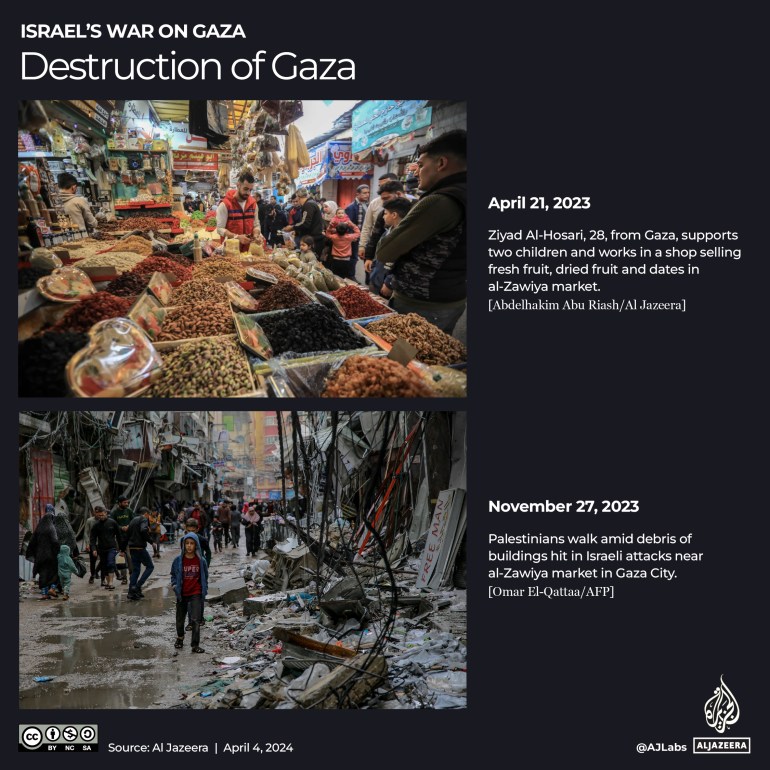
What are common Eid greetings?
The most popular greeting is “Eid Mubarak” (Blessed Eid) or “Eid sa’id” (Happy Eid). Eid greetings also vary depending on the country and language.
The video below shows how people say Eid Mubarak in different languages around the world.

IMAGES
VIDEO
COMMENTS
This country has either areas with high altitude (2400m or more) or/and areas with very high altitude (3658m or more). Travellers who may go into areas of high altitude should take care to avoid ill effects of being at altitude including Acute Mountain Sickness, a potentially life-threatening condition.
Call us in Washington, D.C. at 1-888-407-4747 (toll-free in the United States and Canada) or 1-202-501-4444 (from all other countries) from 8:00 a.m. to 8:00 p.m., Eastern Standard Time, Monday through Friday (except U.S. federal holidays). See the State Department's travel website for the Worldwide Caution and Travel Advisories.
The following Covid-19 travel guidelines and procedures are in place for travelers, effective immediately. These guidelines will be regularly reviewed and revised in light of health conditions. Before departure: 1. Covid-19 testing is no longer a requirement prior to boarding the flight to Rwanda. However, regular Covid-19 testing is encouraged. 2.
March 29, 2024. Rwanda - Level 1: Exercise Normal Precautions. O. Reissued with updates to add area of Level 3. Exercise normal precautions in Rwanda. Some areas have increased risk. Read the entire Travel Advisory. Exercise Increased Caution in: The Rwanda-Burundi border due to armed violence.
Tourism. Known as the land of a thousand hills, Rwanda's stunning scenery and warm, friendly people offer unique experiences in one of the most remarkable countries in the world. It is blessed with extraordinary biodiversity, with incredible wildlife living throughout its volcanoes, montane rainforest and sweeping plains.
Reconsider travel to Rwanda due to COVID-19. Some areas have increased risk. Read the entire Travel Advisory. Read the Department of State's COVID-19 page before you plan any international travel.. The Centers for Disease Control and Prevention has issued a Level 3 Travel Health Notice for Rwanda due to COVID-19, indicating a very high level of COVID-19.
3. Crime in Rwanda. Rwanda is one of the safest destinations in Africa, particularly for solo travelers. Crime is relatively low, with visitors sometimes experiencing petty crime, and locals are welcoming, friendly and hospitable. Pickpockets are active in crowded places, such as markets, and hire cars may be broken into for valuables.
Before traveling to Rwanda and during your stay here, we recommend that you review useful information from the Department of State, including Travel Warnings; the Worldwide Caution announcement; and U.S. Embassy Kigali's most recent Messages for American Citizens . U.S. citizens are strongly encouraged to maintain a high level of vigilance ...
Warnings and insurance. Still current at: 10 April 2024. Updated: 2 February 2024. Latest update: This travel advice has been rewritten to make it easier to read and understand. The Foreign ...
On 11th October Rwanda was added to the UK's safe travel list. Rwanda's removal from the UK travel red list means passengers arriving from Rwanda will no longer have to hotel-quarantine. For the full UK Government travel guidance for passengers travelling to the UK, including the rules on testing, self-isolation and vaccine recognition please ...
If your travel plans in Rwanda include outdoor activities, take these steps to stay safe and healthy during your trip. Stay alert to changing weather conditions and adjust your plans if conditions become unsafe. Prepare for activities by wearing the right clothes and packing protective items, such as bug spray, sunscreen, and a basic first aid ...
Since you are experienced travel-bloggers….maybe you can advise me….62 years old and travelling the world for 40 years mostly alone as a female traveler I turned to the " real Africa" just during Covid times…spent 3 months this year traveling Tanzania, Rwanda, Congo…..after some devestating experiences with two local tour operators ...
For paying for your rental car and for emergencies. Water bottle. You can't drink the tap water and Rwanda's anti-plastic, so fill up your water bottle at your hotels every morning. If you're on the market for a new water bottle, get the CamelBak chute, one the rare things I'd I'd immediately buy again if I lost it.
Since the 1994 genocide, Rwanda has stabilized greatly. Democratic elections have been held and Rwanda is one of the most stable and safe African countries. It is relatively easy, safe and simple to travel around in the country. With Uganda in the north, Tanzania to the east, Burundi to the south, and the Democratic Republic of the Congo to the ...
What to Wear for Gorilla Trekking in Rwanda. Shoes: A good pair of hiking shoes with a high ankle and good grip. Hiking gaiters: If you don't have your own you can rent a pair for RWF 10,000 (R 160.00) from your guide. Clothes: Wear long pants and a long-sleeved shirt in neutral colours.
The land border between Rwanda and Burundi has been closed since 11 January 2024. The border will remain closed until further notice. We advise you exercise a high degree of caution within 10 kilometres of the border with Burundi. The security situation within 10km of Rwanda's border with the Democratic Republic of Congo (DRC) is unstable, and ...
And if you manage to condense your stuff down well, then this whole Rwanda packing list below should fit into a 40-50l backpack. ... it's a smart idea to check whether you need your Yellow Fever jab for Rwanda. Travel Insurance Policy. World Nomads offers simple and flexible travel insurance. Buy at home or while travelling and claim online ...
During your trip to Rwanda: ensure that your personal belongings, including your passport and your other travel documents, are secure at all times. avoid showing signs of affluence or wearing expensive jewellery. avoid carrying large sums of cash or valuables. keep your vehicle doors and windows locked at all times.
Rwanda Healthy Travel Packing List. Pack items for your health and safety. You may not be able to purchase and pack all of these items, and some may not be relevant to you and your travel plans. ... Health insurance card (your regular plan and/or supplemental travel health insurance plan) and copies of claim forms; Proof of yellow fever vaccination
Rwanda. Specific. Advice. Travellers'. Diarrhoea. Prevention. Despite the 1994 genocide, Rwanda has a growing population and booming tourism trade. The growing nation provides the opportunity to see mountain gorillas, bamboo forests and amazing volcanoes. Rwanda is a must-visit for Africa-bound travellers.
To enter Rwanda, your passport must have an 'expiry date' at least 6 months after the date you arrive and at least one blank page for entry stamps. Check with your travel provider that your ...
After July 4 1994, when Rwanda was liberated and the killings halted, approximately 70 per cent of Rwanda's remaining population was female. This isn't to say women weren't killed during the ...
Lunar months last between 29 and 30 days so Muslims usually have to wait until the night before Eid to verify its date. Other countries follow independent sightings.